26th November 2022 - 2nd December 2022
The fight against measles is one of humanity's greatest achievements of the 21st century. Despite a brief resurgence in 2019, and a fall in vaccination rates during the pandemic, between 2000 and 2021 the annual number of measles deaths fell from 761,000 to 128,000. Thanks to measles vaccines, an astonishing 56 million lives have been saved since 2000. WHO
Singapore has eliminated rubella - the leading vaccine-preventable cause of birth defects worldwide. This follows Singapore's elimination of measles in 2018. Seven countries in the WHO's Western Pacific Region have now interrupted endemic transmission of the virus that causes rubella: Australia, Brunei Darussalam, Hong Kong SAR, Macao SAR, New Zealand, the Republic of Korea and Singapore. WHO
About 160,000 new HIV infections among children under five occurred last year, a dramatic 50% decline from 320,000 infections in 2010. Since the launch of a global plan in 2011 to prevent mother-to-child transmission programmes, 1.5 million deaths and 2.9 million HIV infections have been averted worldwide among pregnant women and children. UNICEF
This year marks the 30th anniversary of Cambodia's landmine removal program. Since 1992, over a million landmines and three million explosives have been removed, and 2,531 km2 has been cleared and made safe for the construction of homes, schools, farms and roads for nine million people. Deaths have fallen from 4,320 in 1996 to less than 100 in 2021. Phnom Penh Post

Millions of Alzheimer’s patients have been given hope after a new drug has been shown to slow memory decline by 27% over 18 months. It's the biggest breakthrough in a generation, marking what experts have called the 'beginning of the end' of Alzheimer’s and offering “real optimism that dementia can be beaten and one day even cured.” BBC
Sierra Leone is allocating almost a quarter of its entire budget to education as part of its ongoing effort to ensure every child in the country gets free schooling. Since 2018, enrolment rates have surged from 2.0 to 3.1 million students, and there's been a highly progressive shift in completion at every level of education. Guardian
Bangladesh has the lowest rate of infant and maternal mortality in south Asia. The maternal mortality rate has fallen from 269 per 100,000 live births in 2009 to 165 per 100,000 today, and child mortality has declined by 63% since the turn of the century. It's the eighth most populated country in the world - millions of lives have been saved. TBS
France has moved a step closer to becoming the first country to enshrine abortion as a constitutional right, after lawmakers approved a resolution in the lower house to guarantee access to “the right to voluntarily end a pregnancy”. Four in five people in France, from across the political spectrum, want abortion rights to be better protected under the constitution. Guardian
The roads of 22 of the world's major cities have become a lot safer in the last decade. Following a combined 2010 pledge, road fatalities and serious injuries have fallen by an average of 4% a year, with a particularly noticeable decline during the pandemic. ITF
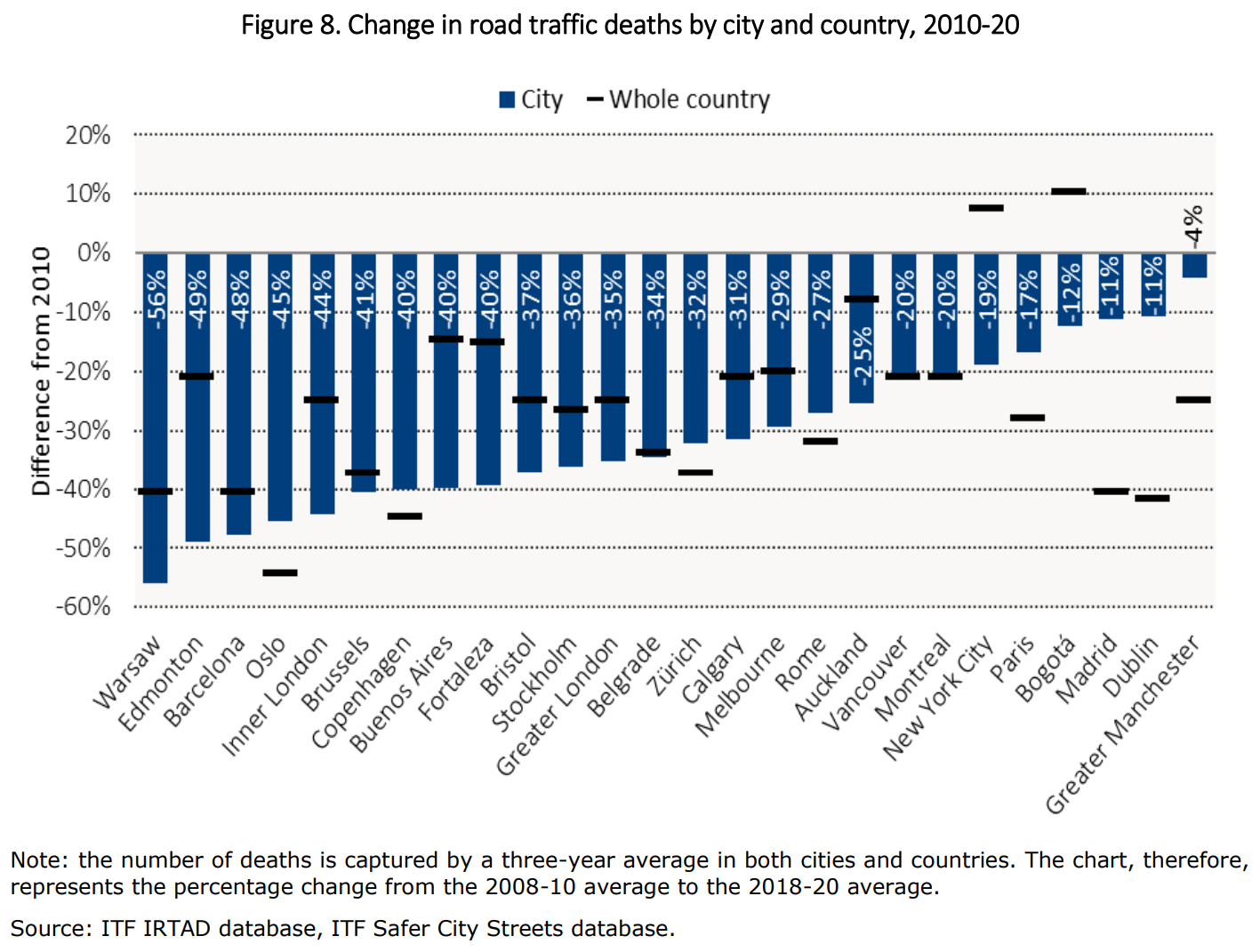
A rigorous new study from Stanford has found no meaningful association between the age at which kids receive their first smartphones and their wellbeing, as measured by grades, sleep habits and depression symptoms. In short - all kids have phones and no, it doesn't make them depressed. Naturally, not headline news.
For the first time since the early 90s, wealth inequality is falling in America. Since December 2020, the wealth of the top income percentiles has fallen significantly, while the wealth of the bottom 50% has risen by 26%. Wealth share under the current administration has also shifted to the benefit of bottom 50%. Real Time Inequality
Canada's overall poverty rate fell from 14.5% in 2015 to 10.3% in 2019, and 6.4% in 2020. This means that Canada has met both its interim target of reducing poverty by 20% by 2020 (relative to 2015 levels) and of reducing poverty by 50% by 2030 - ten years ahead of time. National Advisory Council on Poverty
The Global Mangrove Alliance launched a new initiative at COP27 to restore and protect an additional 15 million hectares of mangroves globally by 2030. It will build on good momentum - globally, net mangrove deforestation has essentially flatlined, and 42% of the world’s mangroves are protected, an increase of 17% since 2012. Conservation
'The Bengal Water Machine' is a nature-based solution in Bangladesh that relies on the country's 16 million smallholders pumping up groundwater, rivalling the storage capacity of the world’s large dams. It's enabled the country's farmers to make it world’s fourth highest producer of rice, drastically improving food security and resilience to climate change. Sci Dev
The 19th meeting of CITES has produced new trade regulations for over 600 animal and plant species, including new protection for sharks, glass frogs, turtles, songbirds, and tropical timber species. The most significant development was the protection of requiem and hammerhead sharks which account for 95% of the global fin trade. Mongabay
Abu Dhabi’s single-use plastic policy has reduced the use of single-use plastic bags in retail stores by 87 million, the equivalent of half a million bags a day since launching in June. The ban was implemented to address the 11 billion plastic bags used in the Emirates each year, which is almost four times the global average. The National
Israel and Jordan are teaming up to save their shared waterway, the Jordan River. Efforts will focus on increasing treatment facilities, upgrading sewer systems and promoting sustainable agriculture to restore water supply and at least 50% of lost biodiversity. AP
After a 50 year absence, swift foxes have returned to the grasslands of Fort Belknap in Montana. Three years into the recovery program, 130 foxes have been released into the wild and are already reproducing, a critical milestone for a self-sustaining population. Local tribes have worked tirelessly for decades to bring indigenous wildlife back to the area. Defenders

An ambitious plan to save Louisiana’s coastal communities and ecosystems will divert sediment and water from the Mississippi into the Barataria Basin. The $20 billion project is the largest coastal restoration project in the US, and expected to create over 6,200 acres of land in its first decade. Settlement money from the 2010 BP Deepwater Horizon spill will foot the bill. Nola
Thanks to conservation efforts in China, a number of endangered species are recovering. The Yangtze finless porpoise population has reached nearly 100 while the population of milu deer has expanded from 64 in 1990 to around 2,500 today. Sightings of Shennongjia golden monkeys are also increasing. China.org
The European Commission just approved €380 million of funding for 168 new biodiversity, circular economy, climate adaptation and clean energy projects across the continent. The biggest chunk has been reserved for 27 nature and biodiversity projects that will support the implementation of the EU Biodiversity Strategy for 2030 and the proposed Nature Restoration Law.
Cities around the world are installing artificial islands brimming with grasses and sedges to clean up their waterways. An acre of floating wetland can absorb pollution from 7-15 acres of urban development while creating a refuge for wildlife. Baltimore was one of the first to trial the invention and the project has been so successful they plan to expand the islands to 10,000 square feet in 2024. Yale360

19th November 2022 - 25th November 2022
Tanzania is winning its fight against tuberculosis, the world's deadliest infectious disease. Cases have fallen from 306 per 100,000 people in 2015 to 208 per 100,000 in 2021, and annual deaths have declined from 55,000 to 25,800 in the same period. This is really good news - Tanzania has the sixth highest TB burden in the world. The Citizen
Brazil's Ministry of Health has reported a 28% decrease in malaria cases, falling from 194,979 ijn 2017, to 140,385 in 2021. Across the region of the Americas, overall cases have fallen from 1.5 million to 650,000 in the last two decades, and there's been a 56% reduction in deaths from the disease. Outbreak News
Five years ago, half of Kenya's babies were born without a skilled attendant. Today, 90% are born under the care of a trained health professional, and child mortality has fallen to less than half of what it was 20 years ago. Nation
Two years after its launch, a program to eliminate cervical cancer has reached its target of treating 90% of all women identified with pre-cancerous lesions in project sites in seven countries - Burkina Faso, Côte d’Ivoire, Malawi, Nigeria, Philippines, Rwanda and Senegal. That's seven years ahead of schedule. Unitaid
Reading used to be a luxury reserved for a few in Latin America. Now, it’s the standard. Although there is still some way to go before every child in the region can read, it's clear that there has been substantial progress towards becoming a region of literate citizens, bringing a new promising era of prosperity. Latinometrics
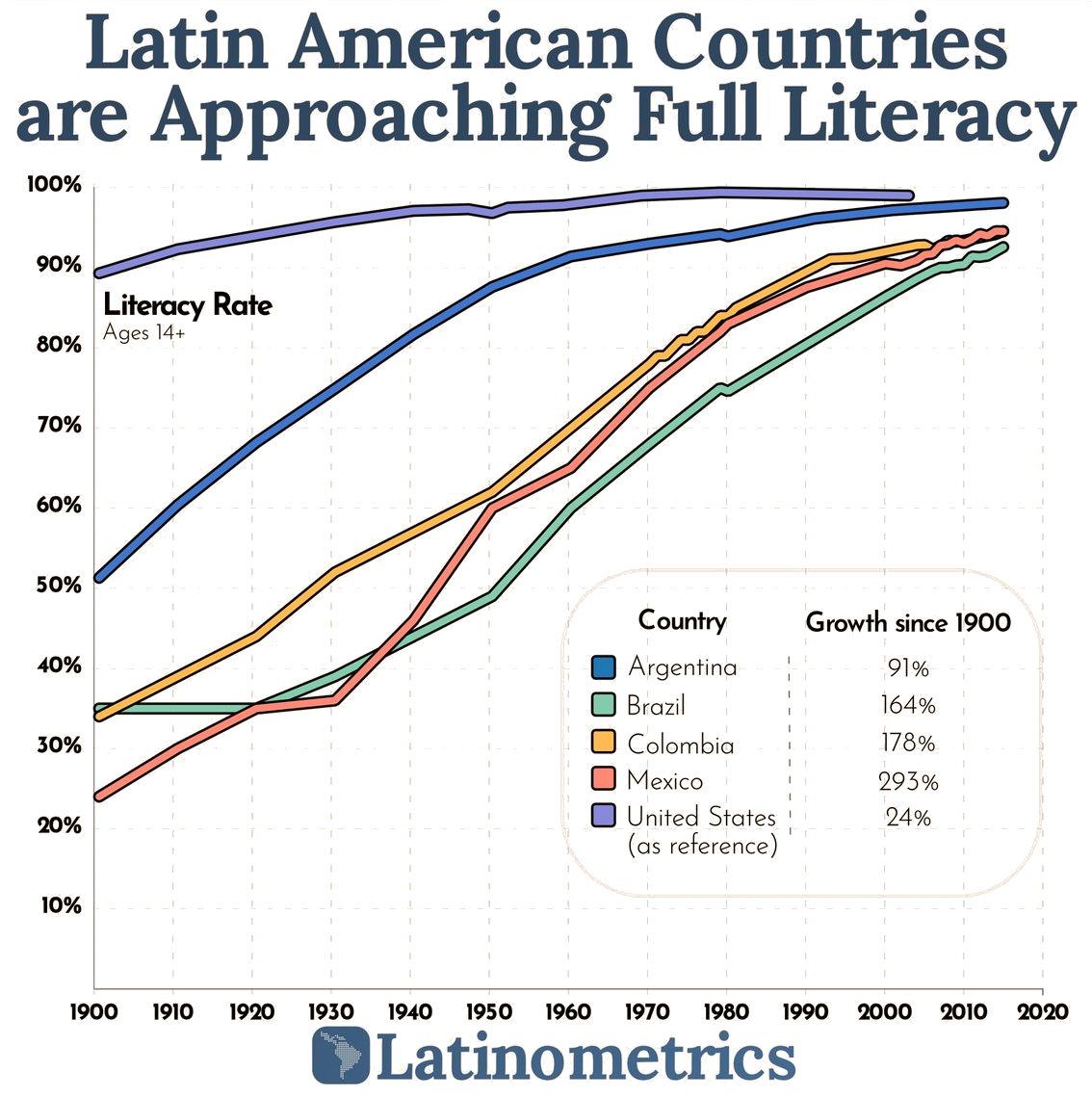
The Gates Foundation just announced it will spend $7 billion over the next four years to support African countries in confronting hunger, disease, gender inequality, and poverty. “The big global challenges we face are persistent. But we have to remember, so are the people solving them."
Reproductive rights advocates around the world can look to Mexico, Colombia, and Argentina for perspective, strategy, and hope. All three countries have enshrined a woman's right to choose in the last two years thanks to a multipronged approach: grassroots organizing, strategic litigation, and most importantly, changing the narrative. Yes Magazine
Crime has plummeted in the United Kingdom. Compared with the year before the pandemic, burglary is down 28%, robbery down by 23%, vehicles offenses have fallen by 19%, knife crime by 9%, firearm offenses are down 10%, and homicides have decreased by 5%. Overall crime is now at its lowest level since the 1980s. ONS
As the dust settles on the midterms, and the USA pauses for Thanksgiving, there are plenty of reasons for hope. In blue and red states, voters made choices that reflected care and concern for their fellow citizens, choosing to protect public health and use the levers of government to extend dignity to people in extreme poverty, crushing debt and imprisonment. The Hill
The governor of Oregon is granting a mass pardon for state-level marijuana possession offenses, removing 47,144 convictions, forgiving $14 million in fees and fines, and eliminating barriers for thousands of people seeking employment, housing, and educational opportunities who have otherwise been ineligible.
Belize is doubling its marine protected areas as part of a 'blue bonds' agreement that swaps national debt for conservation. The trailblazing approach has proven successful in Seychelles and similar negotiations are underway in the Caribbean, Africa, and Latin America. “It’s like a bank agreeing to refinance a home if the owner promises to put the savings toward improvements.” Nature Conservancy
The largest dam removal project in the world has been approved, and will restore hundreds of kilometres of salmon habitat along the Klamath River, the second-largest river in California. The project has been championed by Native tribes and environmentalists for years and is part of a growing trend in the US that has, to date, removed 1,951 dams. NPR
Good news for sharks! 88 countries have voted to expand fishing regulations to protect 95% of shark species fished for their fins. The decision is a “landmark in not only the number of species it covers, but in the amount of the trade that is going to be regulated." Meanwhile, trials of a new battery-powered device called SharkGuard has been shown to reduce shark bycatch in fishing gear by 91%.
Nepal’s forests are flourishing thanks to a government policy adopted over 40 years ago that handed large swaths of national forest back to local communities to manage. Forests now cover 45% of the country, and a third are managed by communities, allowing endangered plants and wildlife, including the tiger and one-horned rhinoceros, to thrive. NYT
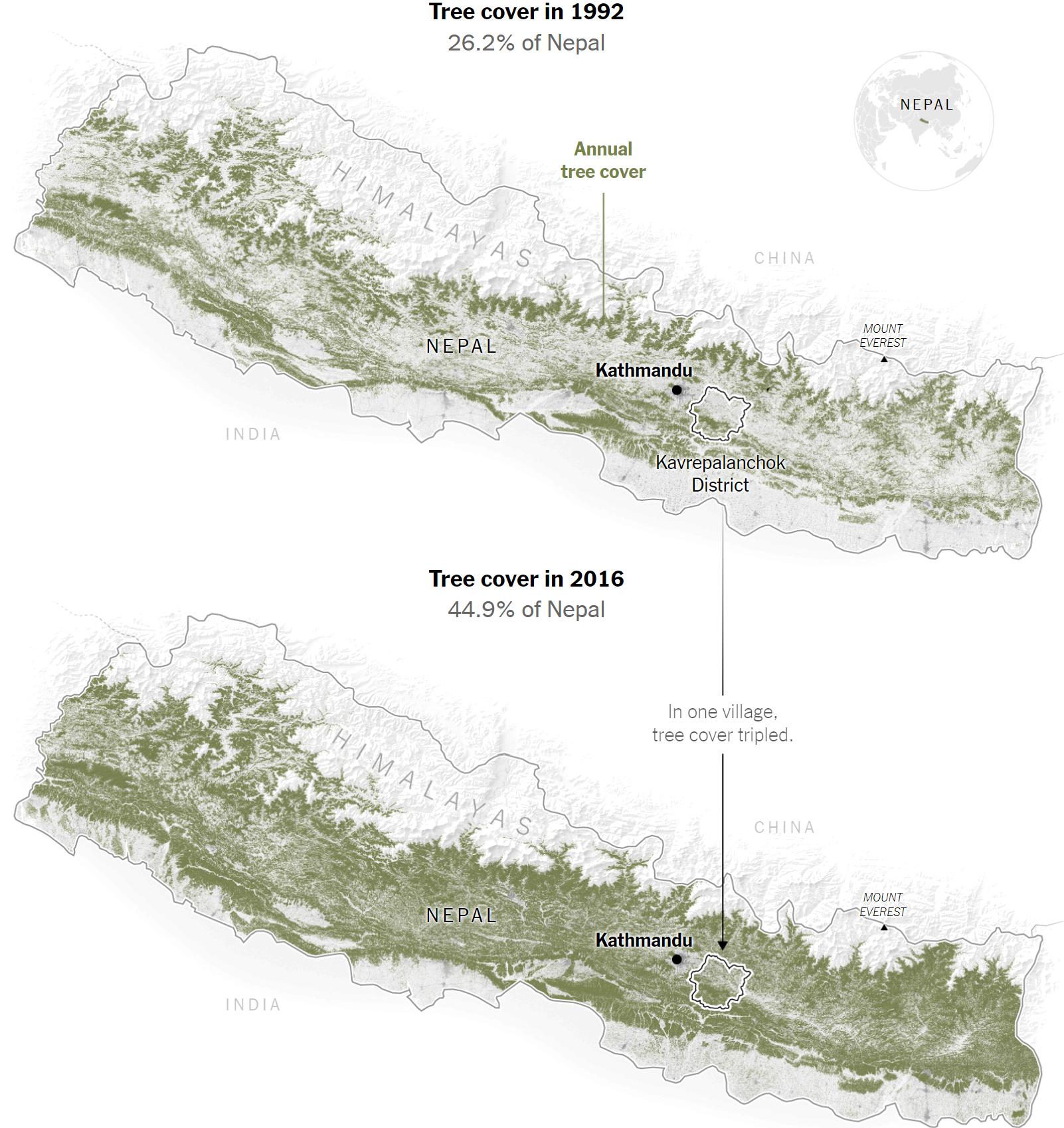
Young Rohingya refugees have reforested over 600h ha of Kutupalon, the world’s largest refugee camp in Bangladesh. 2,500 ha of forest were cleared to deal with the humanitarian crisis and now youth groups inside the camps are giving back - driving waste management, planting, and education initiatives to combat climate change. Mongabay
South Korea has achieved almost zero food waste thanks to a mandatory composting scheme. It’s a staggering achievement considering in 1996, the country recycled only 2.6% of food scraps. Residents buy designated food waste bags for around 20c a piece - creating a 'pay-as-you-throw' tax to help pay for the process. Guardian
Efforts to save the endangered Fender’s blue butterfly in Oregon have reaped double rewards - quadrupling not only the population, but saving its host plant, the Kincaid’s lupine, from extinction as well. The butterfly is slated to be downlisted from endangered to threatened, making it the second insect in the history of the Endangered Species Act to ever recover. HCN
In one of our previous paid editions we featured a story about Paolo Fanciulli, a fisherman in Italy who created an underwater sculpture gallery to stop bottom-trawling along the coastline. Today Paolo’s anti-trawling sculptures span from Porto Santo Stefano to the Ombrone River, protecting 137 km2 of seagrass meadows and fish habitat. “It’s small but it’s remarkable given the lack of any official backing or funds.” Wired
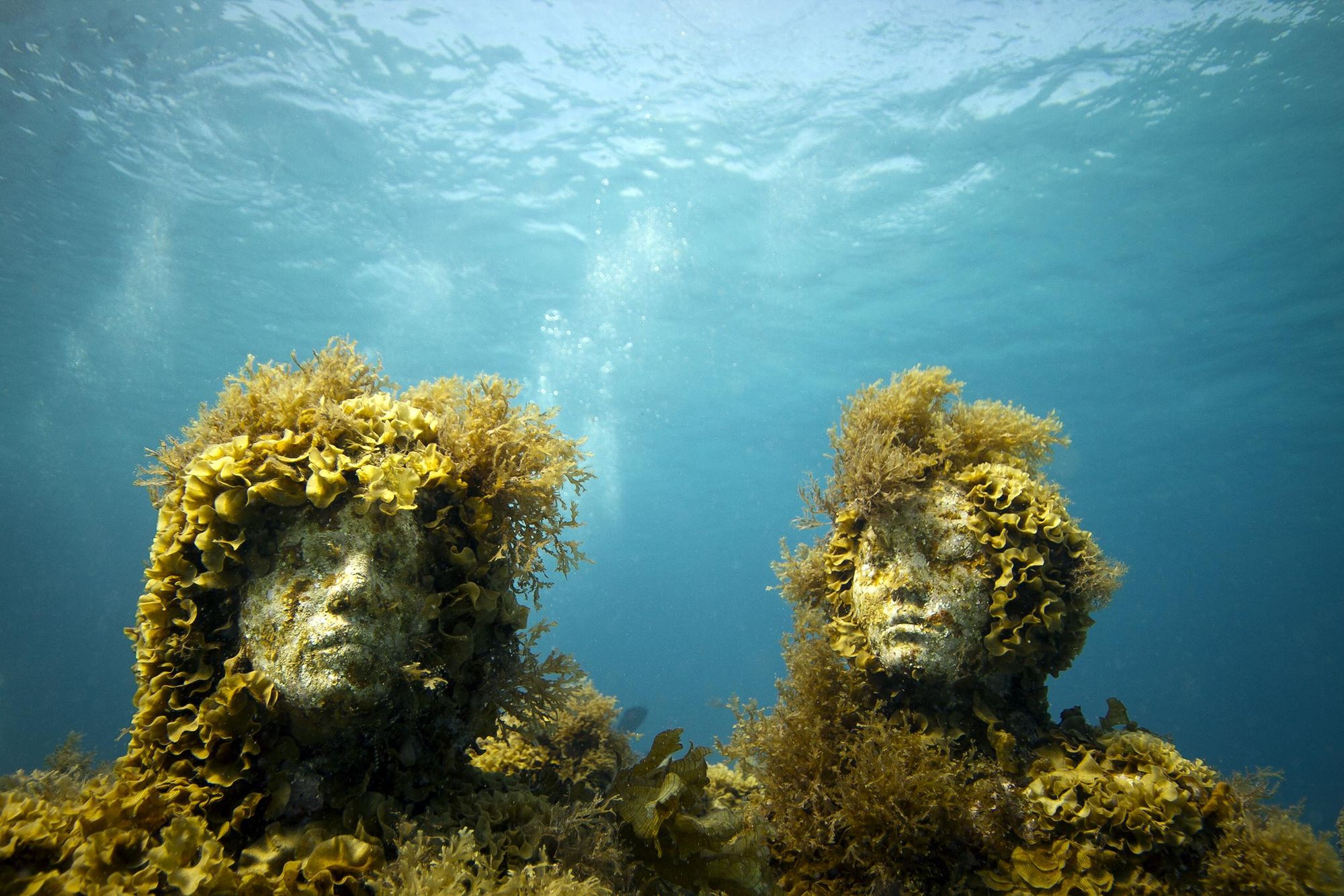
12th November 2022 - 18th November 2022
Humanity just reached a big turning point. For the first time on record, global smoking prevalence has fallen, from 22.6% of people in 2007, to 19.6% in 2019. That's a hugely consequential shift in behaviour that has the potential to massively reduce harm. Tobacco use causes around 8.7 million deaths and approximately $2 trillion in economic damage every year. Tobacco Atlas
Uzbekistan says that 94% of girls aged 12-14 have received a dose of the human papillomavirus vaccine. This will have a big impact: cervical cancer ranks as the country's second-most common cancer among women, and studies have shown that widespread HPV vaccination drives down incidence by around 90%. Gavi
Europe's Child Guarantee is one of the EU's main social policy initiatives, and it's working. The proportion of children classified as 'severely deprived' has decreased from 22.8% in 2009 to 14.6% in 2021. The policy has been particularly successful in eastern Europe. Latvia, Bulgaria, Poland and Hungary have all seen declines of more than 20%. European Parliament
Visceral leishmaniasis is a horrible disease spread by sandflies, causing severe fever, weight loss, enlargement of the spleen and liver, and anaemia. In the last decade, global cases have decreased from 64,223 in 2011 to 11,689 in 2021, the lowest since 1998. The drop has been particularly noticeable in the WHO South East Asia Region - less than 1,500 cases in 2021, a decrease of 96%. WHO
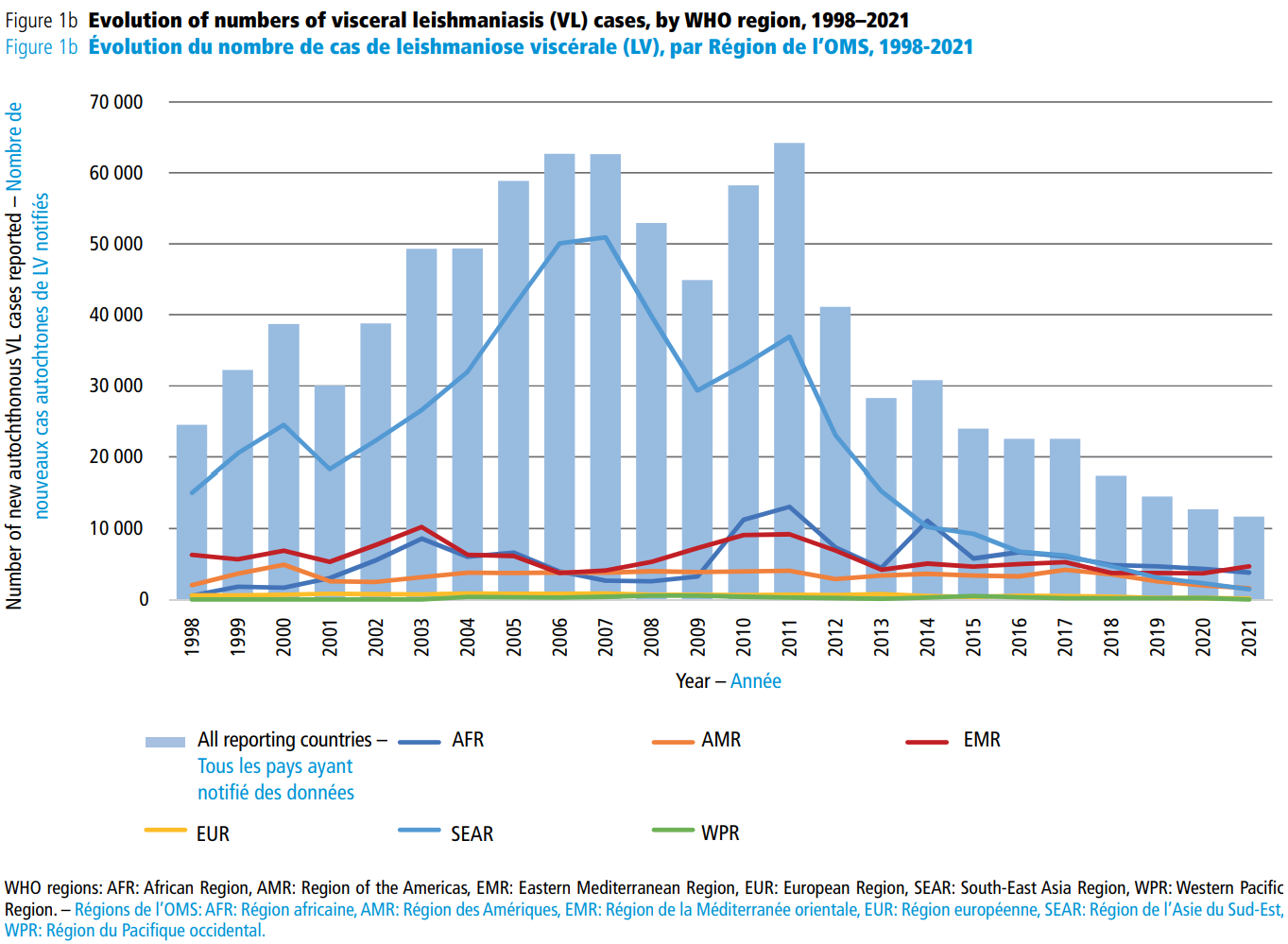
The DRC's Indigenous Pygmy people have won a major human rights victory with a new law that recognizes them as a distinct people with rights and access to free, prior and informed consent before the government or industry can exploit their land. We, a network of 45 Indigenous organizations, worked for 14 years to get these protections enshrined into law Mongabay
In what might be our favourite ballot initiative from the midterms, Colorado voters approved a measure to provide free meals for all the state's public school students. The measure will help schools pay for the meals by raising $100 million a year through increased taxes on those with incomes of more than $300,000 a year. NPR
The West African nation of Benin adopted one of the continent’s most liberal laws on reproductive rights last year after hearing testimony from gynaecologists about women dying from illegal abortions. A year later, this culturally conservative country, made up mostly of Christians and Muslims, has become one of the few in Africa where a woman's right to choose is broadly available. NYT
Angola is making steady progress in clearing its minefields. HALO, a British non-profit spearheading the effort, has cleared more than 10 million m2 since the end of the civil war in the 1990s. Much of that effort is being led by all-women teams - this photo essay about their work is amazing. NPR

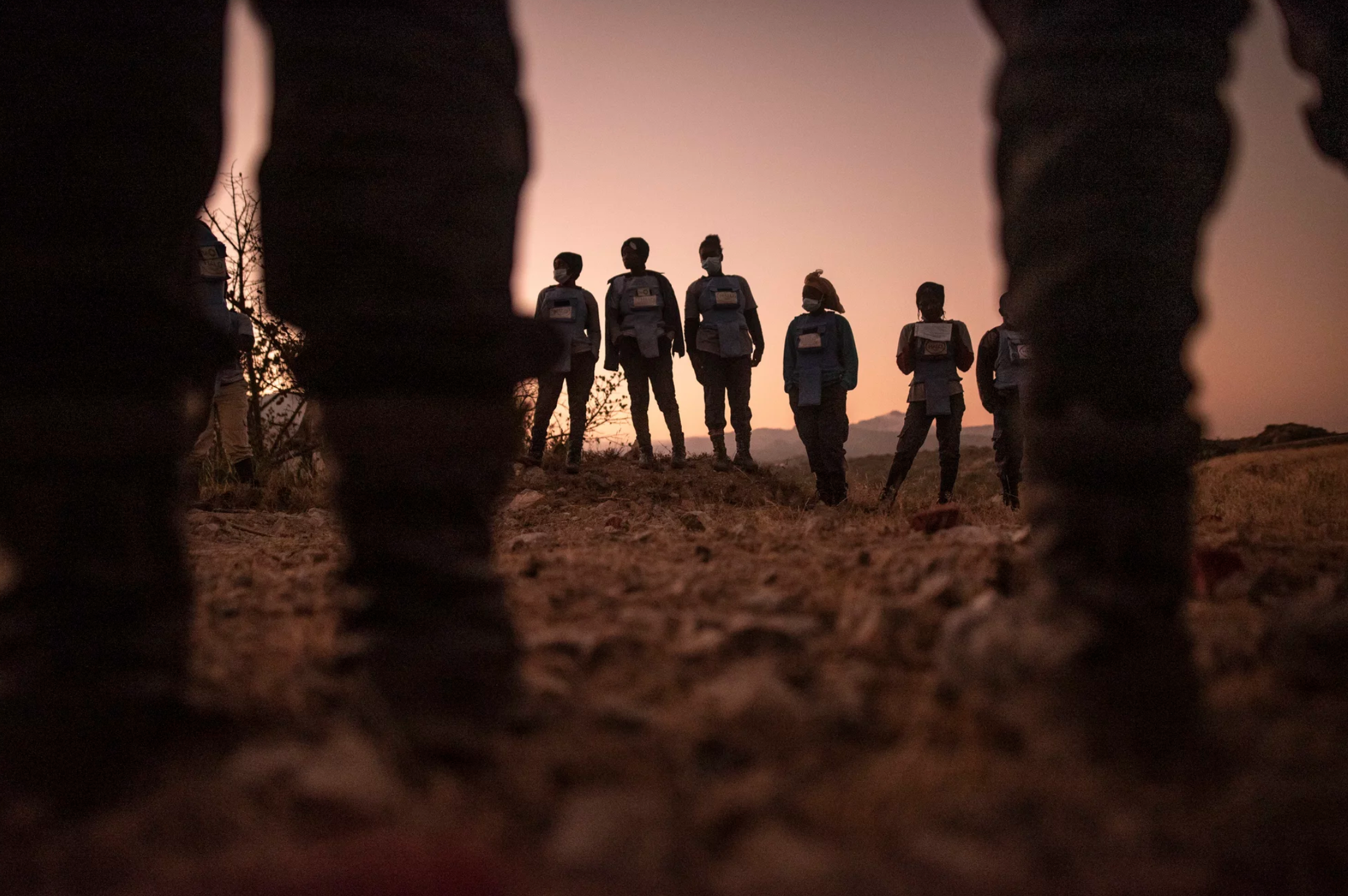
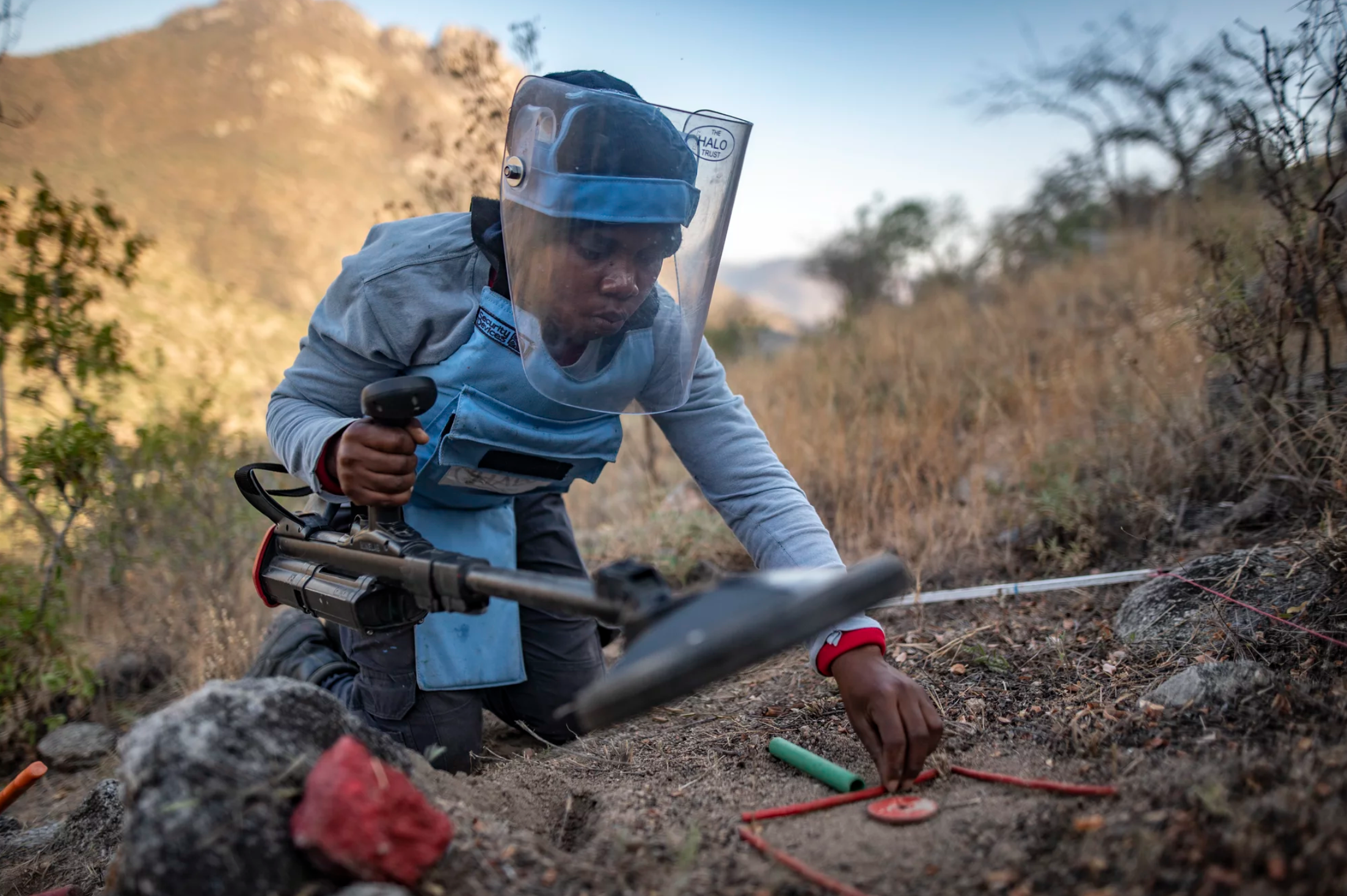

Suicides by active duty members of the US military have decreased substantially over the past 18 months, thanks to increased attention by senior leaders, and the implementation of an array of new programs, ranging from required counselling visits to stress relief education and recreational outings. PBS
Mega-philanthropist MacKenzie Scott has revealed that in the last seven months she and her team have given almost $2 billion in donations to 343 organizations. "I needn’t ask those I care about what to say to them, or what to do for them. I can share what I have with them to stand behind them as they speak and act for themselves." Amen.
Paris, one of the world’s most expensive cities, is also one of the most progressive for low-cost housing. 25% of accommodation is accessible to people on lower incomes, and the French capital is now targeting 40% by 2035. That means a major expansion of public housing so that homes for low-income tenants make up a third of all units. Bloomberg
Lula says Brazil is back, and that climate change will be at the heart of his agenda as he cracks down on deforestation, tackles inequality and rolls out renewable energy. His highly successful Amazon Fund has just been reactivated, and Brazil also just joined Indonesia and the DRC to create a new funding mechanism to protect forests. Between them, the trio are home to half the world's rainforests.
The Global Mangrove Alliance has reported a decline in the overall rate of mangrove loss. More than 42% of the world’s mangroves are now protected, an increase of 17% since 2012. Indonesia holds one-fifth of the world’s total mangrove coverage with more than 2,000 km2 ripe for restoration. Mongabay
A new conservation project is blooming in Devon, aiming to create a network of flower-filled grasslands spanning 1,200 hectares of coastland by 2030. The first 200 acres have already been sown, using 31 seed varieties including yellow rattle and oxeye daisy. The new habitats will attract a wide range of wildlife including voles, bats, birds of prey and butterflies. Guardian
Tetiaroa Atoll, a 12-island paradise in French Polynesia, has been declared rodent free after years of conservation efforts. Scientists are now studying local flora, wildlife and marine environment to establish the world’s first pre-eradication baseline. Mongabay
Zimbabwe’s Mana Pools, one of Africa’s most renowned game-viewing destinations, has maintained a zero elephant poaching rate for the third year in a row - a staggering achievement given 12,000 were poached in the area in the past ten years. More funding for local rangers along with the introduction of tracking technology and smartphones has driven the change. Global Conservation

Since it was formed in 2010, the Global Alliance for Rights of Nature has turned an unorthodox legal theory into a thriving global movement. An estimated 400 initiatives are in progress and 39 countries have recognised the Rights of Nature in national legislation or local law to protect endangered ecosystems and wildlife. Inside Climate New
The Halda River in Bangladesh, the world’s only natural gene bank for several carp species, has made a comeback. At its peak in 1941, 4,000 kg of fish eggs were being harvested, but by 2016 that had dwindled to zero. Conservation efforts kicked off in 2018, and the river has started rebounding. Mongabay
After a disappointing few weeks for plastic recycling in Australia, the government has pledged to recycle or reuse 100% of plastic waste and end plastic pollution by 2040. The lucky country is going to need all the breaks it can get - only 16% of the one million tonnes of plastic in circulation is currently recycled. ABC
The largest fish in the Amazon, the pirarucu, has been saved from extinction thanks to a community campaign to impose strict fishing regulations. The controls have resulted in a population surge, with the number of pirarucu in the Carauari region alone exploding from 4,916 in 2011 to 46,839 in 2021. ABC
The Karuk Tribe in northern California has reignited its cultural practice of intermittent burns as part of a four-year project to prevent wildfires. Low-level and controlled burnings are an ancient and successful forest-management practice. “A cleared floor and less fine fuels such as leaves and ferns, makes it more difficult for wildfires to ignite and spread.” Mongabay

5th November 2022 - 11th November 2022
There has been an 11% decline in the number of homeless veterans in the United States since 2020, the biggest fall in more than five years. Overall numbers have fallen by 55.3% since 2010 - and thanks to additional efforts launched in 2022, the government is on track to house every homeless veteran by the end of the year. HUD
Nearly 96% of US households are now banked, the highest rate since surveys began in 2009. Approximately 1.2 million households have gained access to banking services since 2019, with nearly half saying their decision to open an account was prompted by government support. FDIC
Minority groups in the United States have recorded huge health insurance coverage gains thanks to improved affordability and increased outreach efforts. Hispanic people saw a 53% jump in enrolment rates between 2020 and 2022, Black people 49% and Native Americans 32%. Not a single death panel in sight. WaPo
Deep in the bowels of the US 2020 Census lurks a quiet milestone: for the first time in modern American history, most White people live in mixed-race neighbourhoods - a tectonic shift from just a generation ago. In 1990, 78% of White people lived in neighbourhoods where at least four in five people were also White. In the 2020 Census, that’s plunged to 44%. WaPo
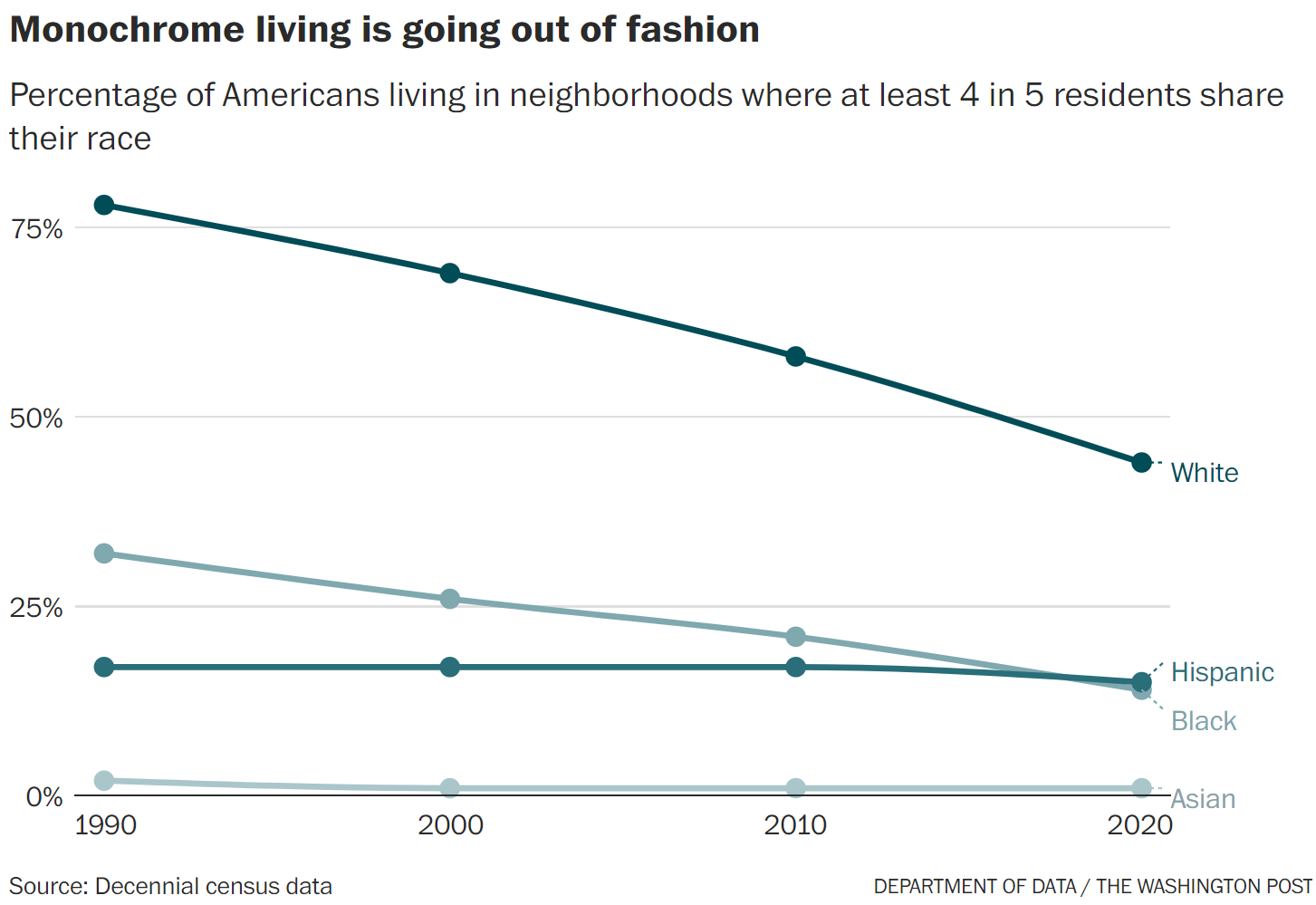
Cigarette smoking is the leading cause of preventable disease, disability, and death in the US. However - it's getting better. Since the 1960s, anti-tobacco initiatives and legislation have saved the lives of eight million Americans, and smoking rates have dropped from 42% to just 14% in 2020, and amongst 18–24 year olds to just over 7.4%. CDC
The prevalence of dementia in the United States amongst people aged 65 and older decreased from 12.2% in 2000 to 8.5% in 2016, most likely due to increased rates of educational attainment and lower smoking rates. Statistics telling a very different story here to 'vibes.' The Hill
Since 2014, people imprisoned at 18 facilities across eight western states in the United States have tended to over half a million sagebrush plants, feeding, watering, weeding and monitoring their health. “It’s all completely voluntary, and there’s usually a waitlist. They get so much peace of mind, stress relief, and the chance to work with, not against, their peers.” RTBC
States across the US are equalizing access to nutritious meals for all students. California, Maine and Colorado have all made their programs permanent, Vermont, Nevada and Massachusetts have extended them until the end of the year, and legislation has been introduced in Minnesota, Wisconsin, New York, Maryland and North Carolina. NPR
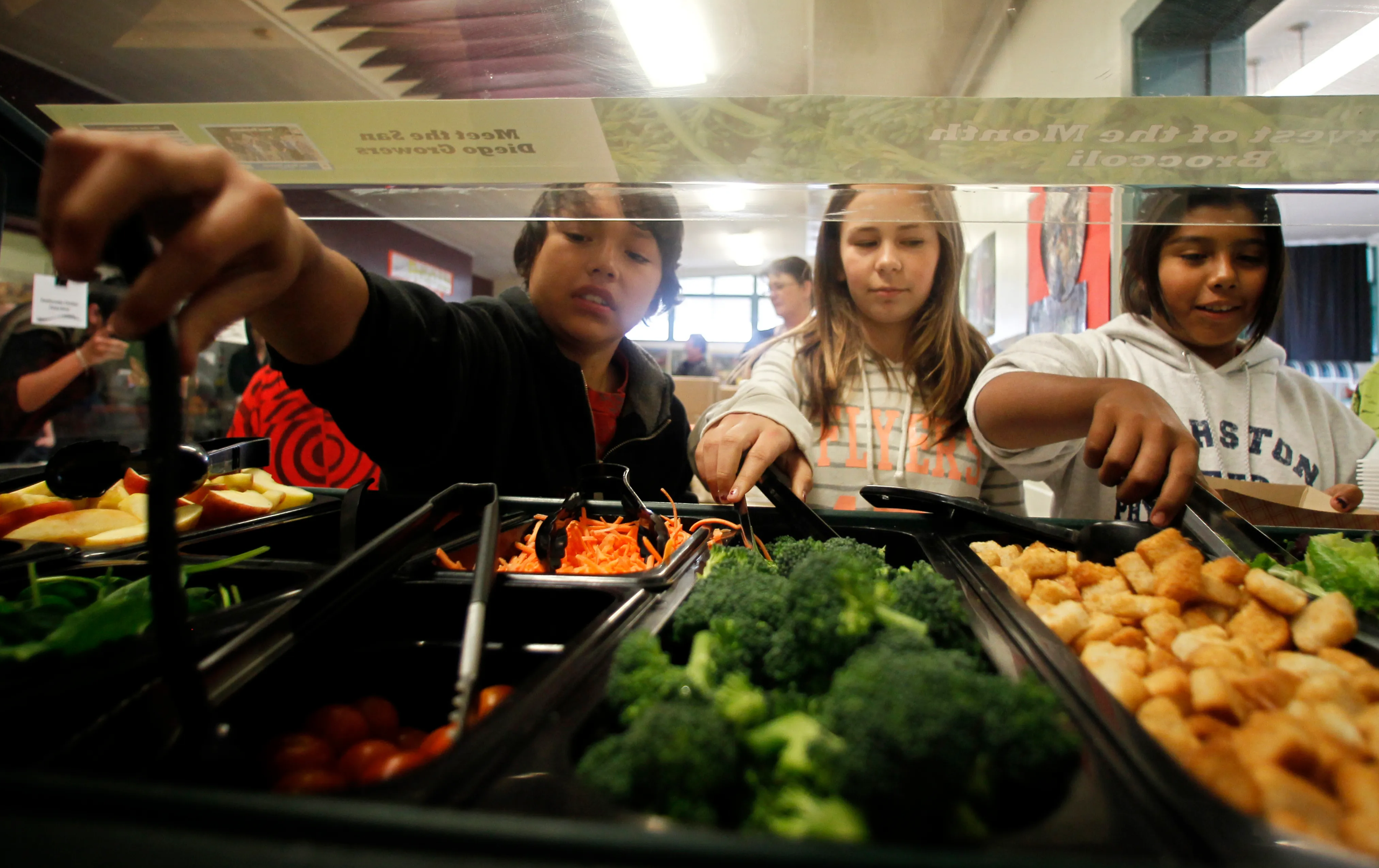
There’s a new RSV vaccine, given to mothers to reduce disease in newborns, that's estimated to reduce severe disease by 82%, and that should be available by next year. That’s great! Worldwide, RSV leads to around 3.6 million hospital admissions and causes around 6% of all child deaths from lower respiratory disease worldwide. Vox
The overall proportion of people in India suffering from blindness and visual impairment have been reduced by 47.1% and 51.9% respectively since 2010. Amongst people aged 50 years and above, the prevalence of blindness has declined from 5.3% in 2001 to 3.6% in 2007, and to 1.9% in the latest survey, carried out in 2019. Times of India
RIP Samuel Katz, the US virologist who was part of the research team that created the measles vaccine. Before its invention, measles killed 2.6 million people a year - by 2020, that number was just over 60,000. Coverage of the vaccine fell by 4% during the pandemic, but a new initiative from the Global Vaccines Alliance is now underway to reach 85 million children before the end of next year. NYT
RIP Dilip Mahalanabis, the Indian physician who pioneered the use of oral rehydration therapy - a simple solution of glucose, salts and water designed to replace vital fluids during bouts of infectious disease. The Lancet called it “the most important medical discovery of the 20th century.’’ It's estimated the number of children saved by ORT between 1982 and 2019 is more than 70 million. FT
Amazing what a group of dedicated people can achieve. The Against Malaria Foundation has managed to raise $484 million since 2005, in large part thanks to the efforts of the effective altruist community. That's allowed them to distribute over 232 million bednets, and save the lives of around 90,000 people.
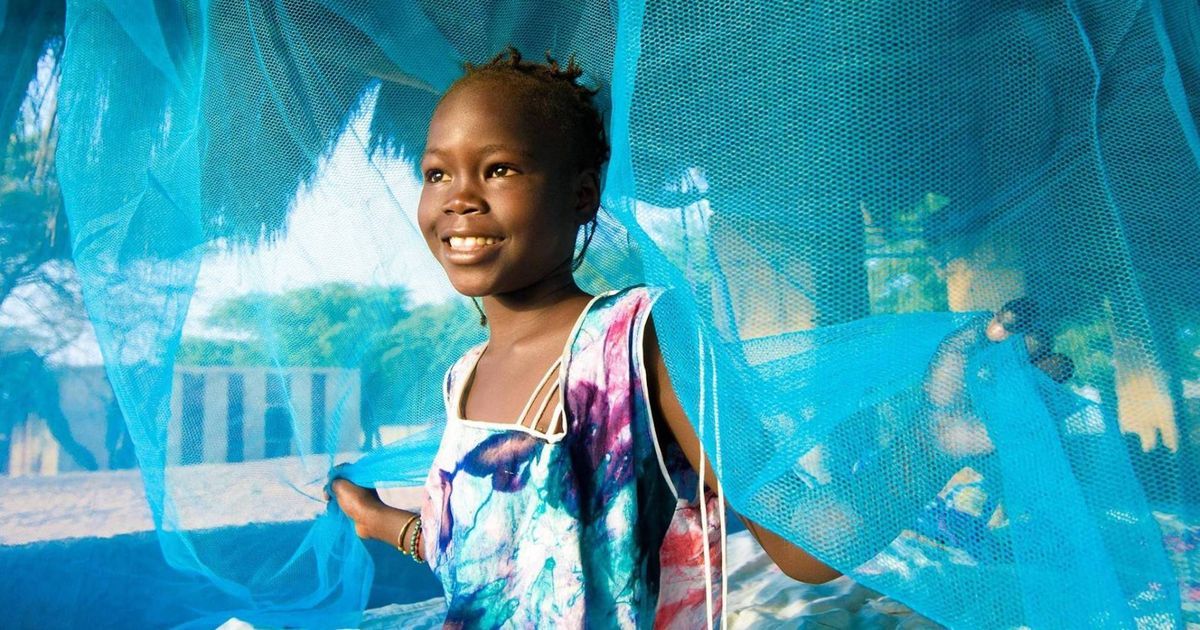
Mexico has created a new fully protected marine area within the Islas Marías Biosphere Reserve. The reserve, which is centred around a unique archipelago flush with rich nutrients and marine life, covers 6,413 km2 and is now deemed a no-take area, meaning no fishing, mining, drilling or any other extractive activities. Nat Geo
Almost 4,000 hectares of koala habitat in Australia will be protected after the land was privately acquired for conservation. The habitat is home to more than 100 vertebrate species, including the endangered koala and 11 other animals listed as threatened. It's also surrounded on three sides by largely intact forest - allowing animals to move freely from place to place. Guardian
The Shuar Indigenous community of Ecuador has obtained national protections for part of its territory after decades of fighting off deforestation and pollution. Their 5,497-hectare ancestral Tiwi Nunka Forest will now be safe from future exploitation, including mining, cattle ranching and agricultural encroachment. Mongabay
After decades of hard fought for protections and restoration efforts, conservationists have reversed the collapse of California’s treasured Mono Lake. The lake, which is a crucial feeding stop for migratory birds, now offers inspiration for efforts to heal degraded and warming ecosystems around the world. Inside Climate News
The jaguar is making a comeback in the Mexico's Calakmul Biosphere Reserve, one of the biggest unbroken tropical forests in the Americas. The government has also tentatively agreed to expand the reserve from 726,000 to 1.3 million hectares, which would make it one of the largest protected areas in the world's tropics. NYT
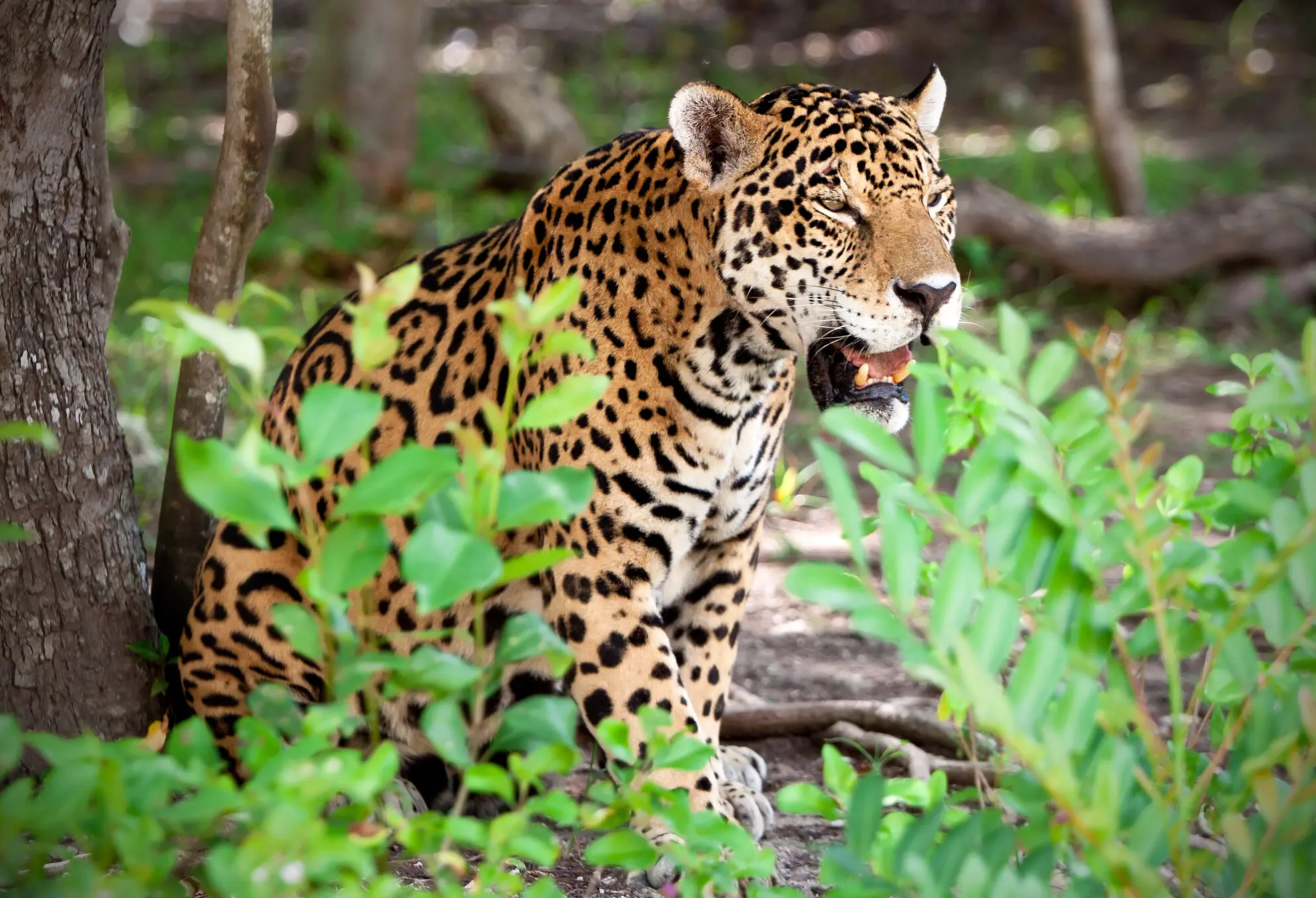
A non-profit organisation in the United States has raised nearly $200 million from more than 4,000 donors in an attempt to create a nature reserve on the great plains, a place where buffalo can roam once again. The overall goal is 3.2 million acres of intact grasslands - the size of Connecticut, or the Glacier and Yellowstone National Parks combined. CBS
The Millenium Forest, a two-decade reforestation project on the tropical island of St. Helena in the southern Atlantic Ocean, has not only restored trees found nowhere else in the world, but has also involved nearly every member of the island community in the effort. The revived forest is now attracting animal species to its habitat, including St. Helena’s only endemic bird. Mongabay
As of the 1st of November, people in the Australian state of New South Wales no longer have access to a range of single-use plastic items. Lightweight plastic bags have been prohibited since June, and now plastic straws, stirrers and cotton buds have joined the list. Next up - South Australia in September 2023.
The UK’s two-wheeled revolution continues. Cycling levels over the most recent summer were 54% higher than pre-pandemic – and 11% higher than the summer of 2020, when people were told to avoid public transport. Another report has calculated that walking and cycling generated £36.5 billion for the UK economy in 2021, thanks to reduced congestion and improving public health. The Times
More than 6,000 hatchlings of endangered taricaya, charapa and teparo turtles have been released into Peru's Amazon basin to help them repopulate. The eggs were collected from natural sites and then allowed to incubate in protected areas. "With the release of these species at risk, it will be possible to repopulate the lagoons and rivers of the Amazon." France24
Birds, fish and flowers are returning to the Mapocho River in Santiago, Chile, after a decade-long effort has transformed it from a garbage filled 'dead river' with no vegetation, to an urban refuge for nature and wildlife. "It's been ten years that wastewater outlets don't go into the river, ten years of clean water flowing." Reuters

29th October 2022 - 4th November 2022
Pakistan is making significant progress on tuberculosis. It has the fifth greatest TB burden in the world, but thanks to a concerted government strategy to find and treat hidden patients all over the country, the annual number of cases has fallen from 500,000 before the pandemic, to 340,000 in 2021. Gavi
In late 2020, Pakistan's Khyber Pakhtunkhwa province launched a universal health care scheme for all 30 million of its residents. It's been a huge success - millions of families are enrolled, public hospital utilization rates have increased ten fold, and similar efforts to expand universal coverage are now being rolled out in other provinces. Lancet
Liberia's community health worker scheme is working. There are now over 4,000 health workers, providing care for 80% of the country's rural population. Since the scheme's launch in 2016, the proportion of malaria cases treated in less than 24 hours has risen from 47% to 71%, and the number of detected pneumonia cases has nearly trebled. BBC
The development of COVID-19 vaccines was a scientific and humanitarian triumph. Researchers at Imperial College London have revealed they saved an estimated 20 million lives in their first year - and helped rich and poor alike. Nearly as many deaths were prevented in countries supported by the COVAX scheme as in rich ones. Economist
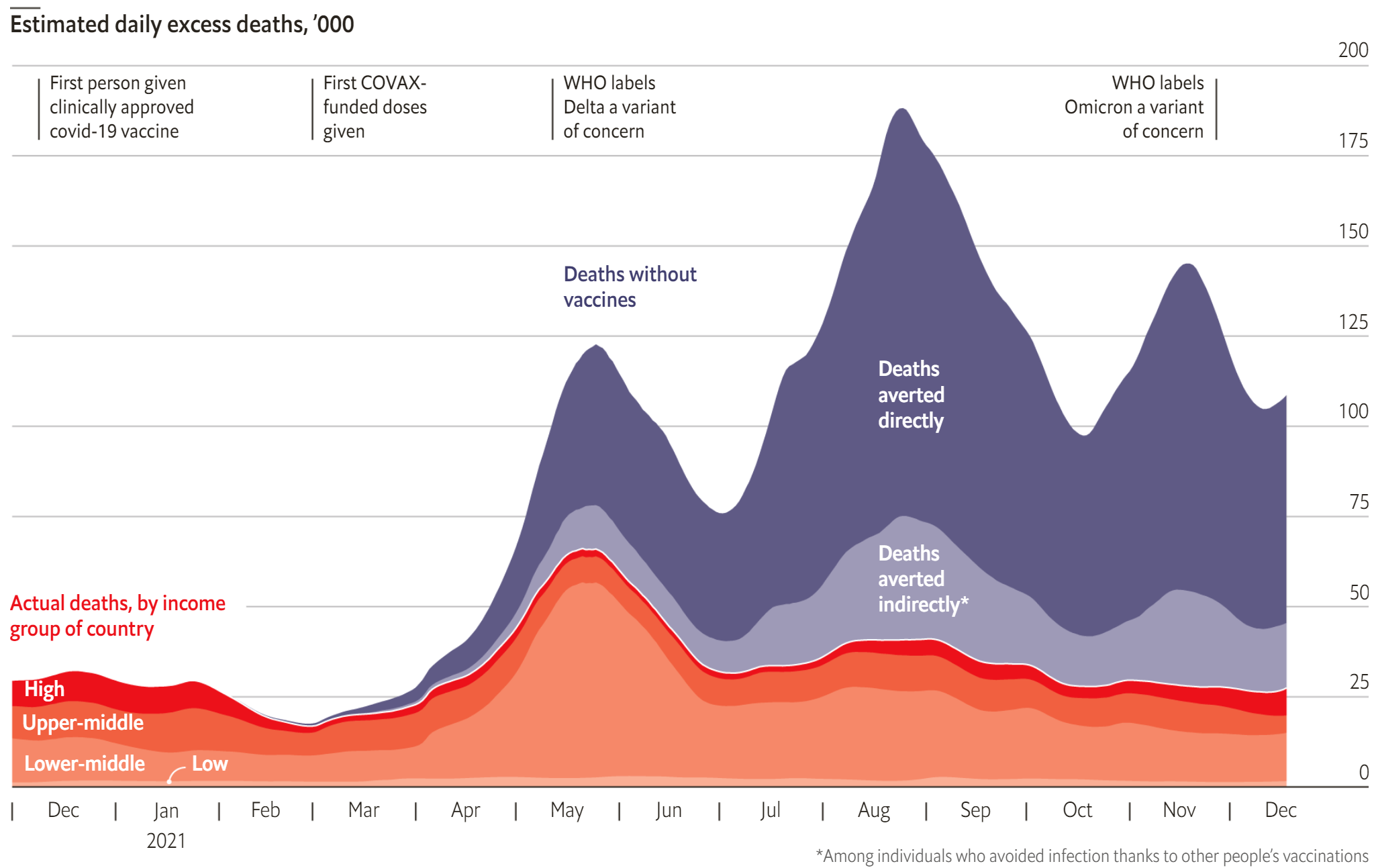
Pandemic silver linings in Senegal, where improved access to oxygen is now helping pneumonia patients across the country. Paediatricians say there's been a notable increase in the availability of oxygen at health facilities, and are reporting that pneumonia deaths in children have declined over the past two years. Undark
Canada is planning a massive increase in immigration levels, with a goal of bringing in 500,000 people in 2025. It's a significant increase from the 405,000 immigrants that arrived last year, and comes after a recent census revealed the country is more diverse than ever - foreign born residents now account for 23% of the population, an all-time high. CBC
California has achieved extraordinary success in combating child poverty. The estimated share of children in poverty fell from 17.6% in 2019 to 9.0% in 2021, translating to about 770,000 fewer children in poverty. Even more striking was that safety net programs have moved nearly one in five, or 1.7 million children out of poverty. PPIC
The share of disabled adults working in the US has soared in the past two years, far surpassing pre-pandemic levels. People with disabilities report they are getting not only more job offers, but better ones, with higher pay, more flexibility and more openness to providing accommodations. “The new world we live in has opened the door a little bit more.” NYT
The last few years have been the most economically prosperous for America's bottom 50% in three decades. That’s not to say their lives are easy — they're not. But it's an improvement on the past: the net worth of the poorest half has doubled since Q1 2020 and is now higher than at any point in history, inflation notwithstanding. Intercept
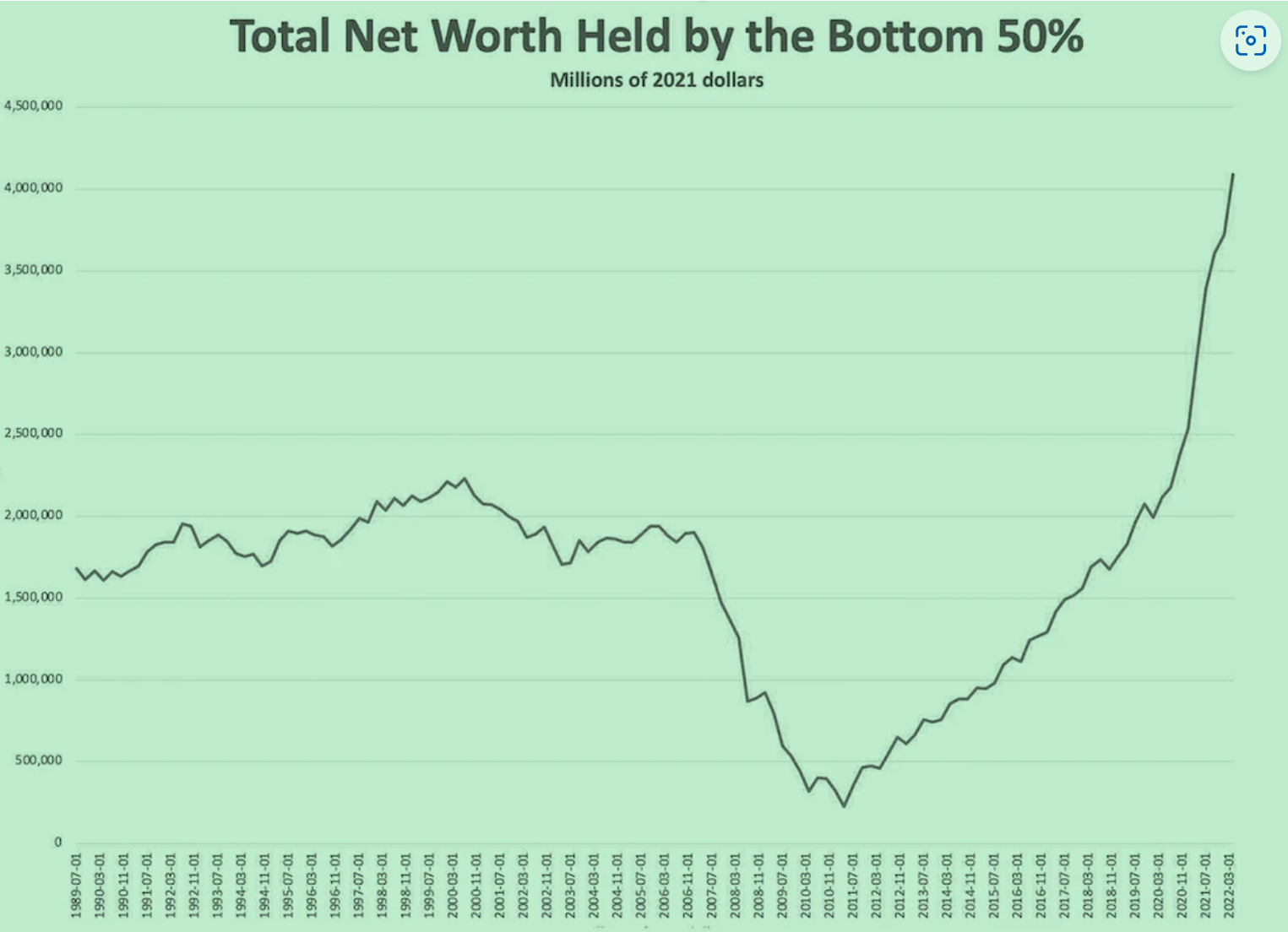
Europe's improved air quality has saved millions of lives in the last few decades. In the early 1990s, nearly a million premature deaths a year were caused by fine particulate pollution. By 2005, that number had been more than halved to 450,000, and in 2021 dropped to around 300,000. Still far too many - but another marked improvement on the past. Euro News
Pakistan's Senate has passed four human rights bills, including one that, for the first time, outlaws torture by security forces and police. While the country's Constitution prohibits the use of torture 'for extracting evidence' no domestic law until now has made it a criminal offense. Dawn
Ireland has passed new laws criminalizing incitement to hatred against transgender people and those with a disability. The laws were passed after a public consultation process which drew over 4,000 responses, and follow international best practice to enshrine protections for groups of people targeted for hate crime. Irish Times
The Mexican states of Gueterro and Tamaulipas have become the last two in the country to legalize same-sex marriage, meaning that for the first time, love is now legal everywhere in the 10th most populated nation in the world. “The whole of Mexico shines with a huge rainbow. Live the dignity and rights of all people. Love is love.” Mexico News Daily
Todo el país brilla con un enorme arcoíris. Vivan la dignidad y los derechos de todas las personas. Amor es amor. #MatrimonioIgualitario 🏳️🌈 pic.twitter.com/6xFSYCE63E
— Arturo Zaldívar (@ArturoZaldivarL) October 27, 2022
Oslo will become the world's first capital city to have an all-electric public transport system by the end of 2023. In the city's most recent tender, electric buses came in at 5% cheaper than diesel equivalents. "The maintenance is cheaper, it's also cheaper for the operators of the electric buses. All in all, this is a win-win situation." Reuters
Cities around the world are ‘daylighting’ subterranean waterways that were built over during the 19th century, to mitigate rising temperatures and flooding. One of the biggest recovery projects, the Cheonggyecheon in Seoul, revitalised an entire neighbourhood. Paris, Madrid, Manchester, and New York all have similar projects underway. Timeout
Paris has pledged to make the Seine swimmable by the 2024 Summer Olympics, investing in a $1.6 billion stormwater holding tank to curb sewage pollution. The tank has a capacity a of 46,000 m² and will be entirely invisible at surface level. It’s part of a decade long mission to clean up a river that was declared biologically dead in the 1960s. Resilience
Taiwan is turning vacant metro spaces into underground vertical farms to grow sustainable, clean, and organic food. These smart farms use high-tech equipment to regulate light, temperature and nutrients. It’s an ingenious way to tackle food security in a country with a population of 23.57 million people and a surface area of only 36,197 km². Euro News
Monterrey, the second largest city in Mexico, is kicking off its ambitious Green Corridors plan with the Parque Lago project, which will add eight hectares of green public space. 18 other projects are planned, totalling 94 hectares of rehabilitated parks, with 73 kilometers of corridors and 20,000 native tree specimens. Fortune
Amsterdam’s rise to bicycle capital of the world didn’t happen by accident. It was a decades-long plan that began in the 1970s as a campaign against increasing traffic fatalities. At the heart of the city’s transformation is the idea that humans are "innately error-prone, so road design must be forgiving, minimizing the ill effects of mistakes.” Bloomberg
Melbourne has successfully enticed butterflies and bees back to its CBD, simply by working out which plants are most beneficial to wildlife and well, planting more of them. Over the last five years, native shrubs and perennial herbs with high yields of nectar and pollen have been planted along city streets resulting in a significant increase in the number of bee species and an abundance of butterflies. The Age
Seville is digging sustainable cooling - literally, building subterranean canals powered by renewable energy to help cool part of the city above. The Cartuja Qanat project brings technology that was used in ancient Persia to modern-day Spain. Vertical shafts pierced along the canals allow the cooler air to escape, reducing the increasingly sweltering air temperature above the surface.
Heard of sponge cities yet? If not, you soon will. By deploying thirsty green spaces and digging huge dirt bowls where water can gather and percolate into underlying aquifers, you can make rain something to be exploited instead of expelled. "Before, the city would see stormwater as a liability, but 11, 12 years ago, we kind of had a paradigm shift, and we started looking more at it as an asset.” Wired

A new parking bill in California has lifted parking requirements on new developments that are close to public transport, and it’s good news for housing and the climate crisis. Research and market data show eliminating parking mandates help create walkable, affordable neighbourhoods and climate-resilient communities. Bloomberg
A new buoy-to-satellite system has been switched on in San Francisco Bay to alert ships to whales in the area, allowing them to avoid fatal collisions. The Whale Safe system has already been a success in the Santa Barbara Channel, where there have been no incidents of ships striking whales since it was installed a year ago. RTBC
Rio de Janeiro is creating the world’s largest community garden, “Hortas Cariocas” which will span several favelas, connected by a green strip of land and eventually end up the size of 15 soccer fields. It’s estimated over 100,000 families will benefit from the project every month, which aims to make organic food more affordable and accessible. Bloomberg
Vancouver is giving the Squamish Nation 11.7 acres in the middle of the city to do whatever they want. They are not required to follow municipal regulations, development processes, or seek municipal approval, because the land is within their jurisdiction, not the City of Vancouver. And what the Squamish Nation wants to do is to build a whole lot of really kickass, dense solarpunk-style housing.

8th October 2022 - 28th October 2022
Between 2000 and 2020, the global population with access to safely managed drinking water services has increased from 3.8 billion to 5.8 billion people. That means 90% of human beings now have access to either basic or safely managed drinking water services - the highest proportion in our species' history. WHO
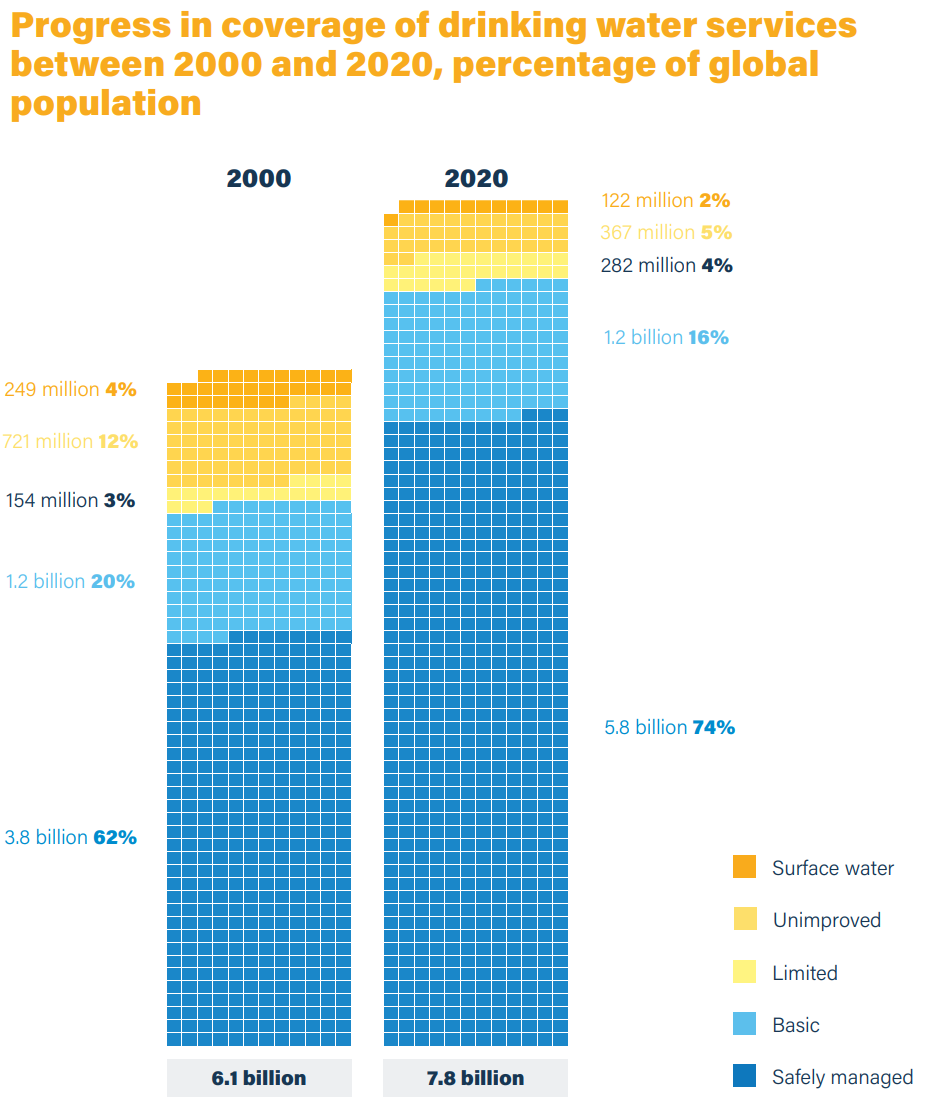
The UN is calling it a 'historic change.' Between 2005 and 2019, nearly 415 million people in India were lifted out of what is known as multidimensional poverty, a measure that includes health, education and standard of living. Children saw the fastest reduction, with child poverty falling from 34.7% to 21.8%. Economic Times
In the decade before the pandemic, 72 countries reduced poverty. One of those was Nepal, which reduced the proportion of people living in multi-dimensional poverty from 39.1% in 2010 to 17.7% in 2019. This was accompanied by the country's largest ever reduction in the proportion of people deprived of sanitation —from 60.6% in 2011 to 21.4% in 2019. Kathmandu Post
A new dengue vaccine that cuts the risk of fever by 61% and hospitalisation by 84% is on the cusp of being approved by the European Medicines Agency. Big news. Global dengue cases have almost doubled over the last three decades, and the only other vaccine we've tried wasn't safe. This new one is.
The arrival of two vaccines for malaria portends a sea change for humanity's efforts to fight one of our greatest scourges. The first, Mosquirix, was approved by the WHO last year and will begin distribution in 2023. A more powerful vaccine with up to 80% efficacy, developed by a team at Oxford, is also just a year or two away. NYT

Remember the Ice Bucket Challenge? Of course you do. Well, the FDA recently approved a new drug for Lou Gehrig's disease that was partially funded by those proceeds, and the ALS Association says the remaining funds are supporting funding 130 research projects in 12 different countries, as well as 40 potential treatments in development. NPR
Slovenia's parliament has passed an amendment allowing same-sex couples to marry and adopt after a constitutional court ruling earlier this year made it the first country in Eastern Europe to do so. "With these changes, we are recognising the rights of same-sex couples that they should have had for a long time." Euro News
Earlier this month, the US federal government took a big step in repairing the harms of the War on Drugs, by pardoning thousands of people with federal offenses for marijuana possession, and initiating a review of its classification. The move lifts a burden on the roughly 6,500 people whose employment and housing chances are harmed by their past convictions. Reuters
Japan will change an archaic 19th-century law whereby a child born to a woman within 300 days of divorce is considered to be that of her former husband, even if she has remarried. The revised legislation will also end a ban on pregnant women remarrying within 100 days of divorce. Bloomberg
The past quarter century has witnessed an unprecedented decline in US child poverty. In 1993, more than one in four children lived in families living below the poverty threshold. 26 years later, that number has fallen to roughly one in 10. The magnitude of this decline - 59% - is unequalled in the history of poverty reduction efforts in the United States. Child Trends
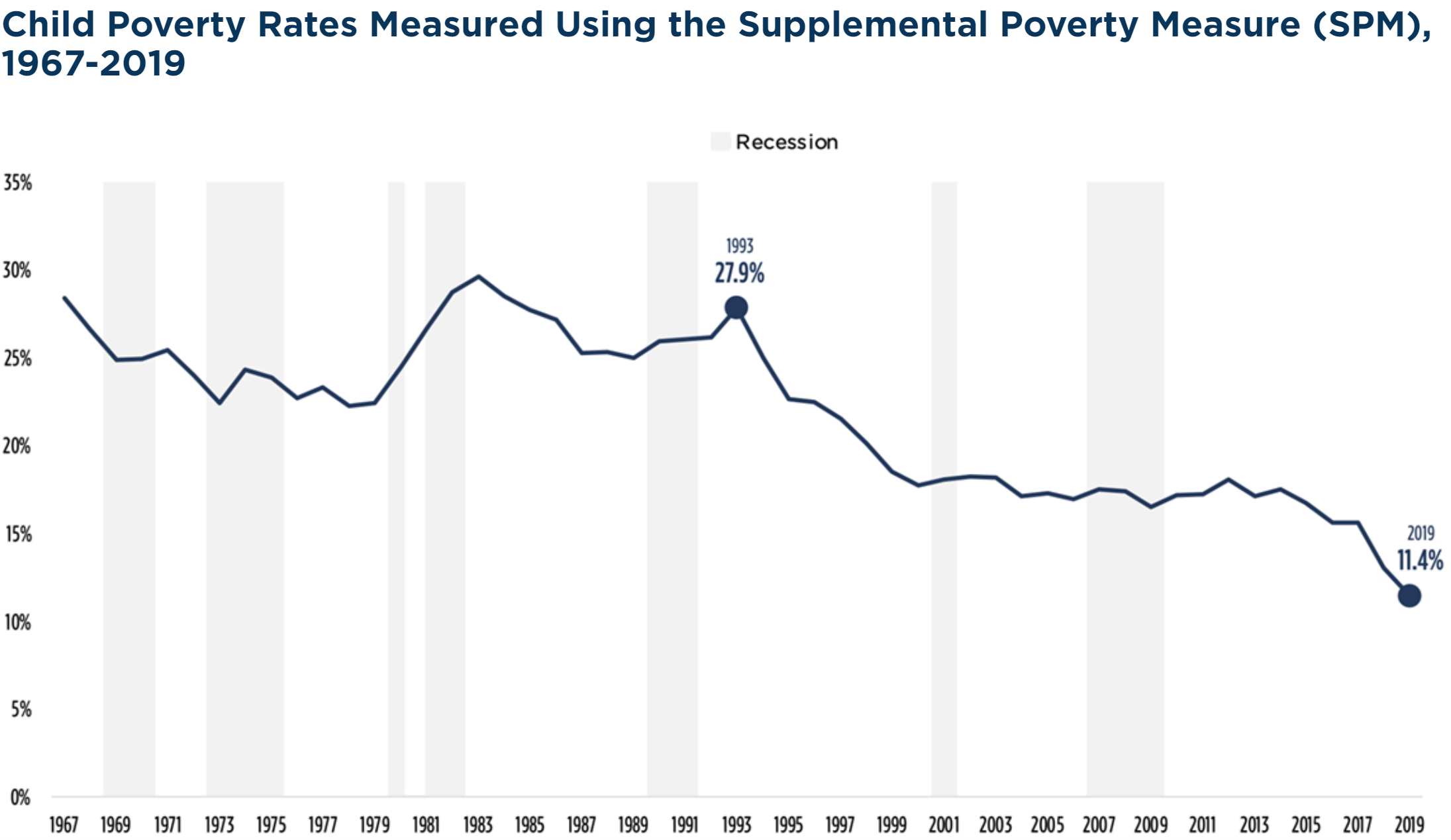
Fewer teenage girls as a proportion of the global population are giving birth today than at any point in human history. Global adolescent birth rates have decreased from 64.5 births per 1,000 women at the beginning of the 21st century, to 42.5 births per 1,000 women in 2021. Every single region of the world has seen declines during this period. WHO
In September, India's Supreme Court delivered a landmark decision, giving the country's 73 million single women the right to choose. It's a human rights victory on a monumental scale - the first time a legal question about abortion in India has been approached from a women's perspective, and setting an example that could echo far beyond the sub-continent. Al Jazeera
The Mexican state of Quintana Roo has voted to decriminalise abortion, becoming the latest state in the country to ease restrictions, and joining the 'green wave' of reproductive rights victories across Latin America. Al Jazeera
Did you know Sri Lanka has a network of more than 7,000 midwives? They're the backbone of the country's public health system, bringing health and education to every front door, vaccinating 99.1% of the country's children, and helping maintain one of the lowest maternal and child mortality rates in Asia. Gavi

Oman has become the first country in the WHO Eastern Mediterranean Region to successfully eliminate mother-to-child transmission of HIV and syphilis. It's thanks to investments in primary health care, a high quality network of laboratories across the country, and a new electronic health system. Next milestone? Elimination of mother-to-child transmission of hepatitis B. WHO
Pakistan has reduced malaria cases by approximately 45% since 2015, thanks to the provision of free-of-cost treatment and related facilities in the public and private health sectors, and nationwide efforts to distribute bed nets. The number of estimated cases fell from 992,605 in 2015 to 542,960 in 2020. Gavi
The number of homicides in Scotland in 2021 reached their lowest point since records began in 1976. This is in line with a significant downward trend in other categories - overall crime has fallen by a total of 43% since 2007. "There are thousands fewer victims in Scotland than there were 15 years ago." BBC
Basic income works. Pilot programs launched across the US and the rest of the world in the last few years have repeatedly shown that it pulls people out of poverty, improves health outcomes, and makes it easier for people to find jobs and take care of their children. The economic evidence is overwhelming. The political battle however, is only just beginning. WaPo
“The most astonishing and heartening coral rebirth the world has ever seen." In 2015/16, the strongest El Niño on record moved across the coral reefs of the Pacific Line Islands, killing half of them. Six years on the reefs are thriving, with more than 43 million colonies per square kilometre. Nature will recover if we let it. Nat Geo
The Republic of Congo will establish its first three marine reserves in the Atlantic. The reserves will cover 12% of the West African country’s ocean zone and protect breeding grounds used by humpback whales and leatherback turtles. The reserves will also cover areas inhabited by whale sharks, the world’s largest fish. Bloomberg
The endangered Galápagos Penguin has recorded its best breeding season on record. In 2010, conservationists began chiselling small holes out of lava for the birds after original nesting sites were taken over by feral predators. 12 years later, a quarter of the population are juveniles - a significant milestone for a species numbering less than 5,000 birds. Nat Geo
A rewilding project spanning 8,500 km² of Spain's Iberian highlands is reintroducing black vultures, lynx, and wild horses. A herd of tauros – cattle bred to fulfil the ecological role of ancient aurochs – has already been released along with 11 semi-wild horses. It's the tenth project from Rewilding Europe, and the first one in Spain. Guardian

A record-breaking 92 Saimaa ringed seal pups were born in the Saimaa Lake region of Finland this year, thanks to fishing restrictions introduced in the last few years. The population of the highly endangered species has increased by of 5.6% every year between 2015-20 due to reduced deaths from fish traps and nets. Yle
Switzerland has reversed the decline of endangered amphibians in the Aargau region. In 1999 the canton decided a mass conservation effort was needed to combat the loss of frogs, newts and toads. Authorities, non-profits, landowners and volunteers worked for 20 years to build 422 ponds - resulting in an increase in almost every pond-breeding amphibian species. BBC
New legislation in the EU will require USB-C to be the single charger standard for all new smartphones, tablets, and cameras from late 2024. The makers of laptops will have until early 2026. The move is expected to cut over a thousand tons of electronic waste every year. Tech Xplore
We might be slowly getting a handle on the food waste problem. In London, grocers have stopped putting expiry dates on fresh produce, in California and France supermarkets are now giving away unsold food, and South Korea’s tough-love approach is working: between 2010 and 2019 food waste in the country declined from 3,400 tons to 2,800 tons per day. NYT

A community-led initiative to expand the Tarras Valley Nature Reserve in Scotland has "achieved the impossible," securing enough funding to more than double the size of the reserve, which was created last year, to over 10,000 acres. “This is about a grassroots fightback against the climate emergency and biodiversity crisis, and helping to create a better future." The National
US air quality is improving. Since 1990, fine particulate matter pollution has declined by 41% and concentrations of O3, a precursor to smog, have declined by 22%. The result? 370,000 avoided premature deaths, 189,000 fewer hospital admissions for cardiac and respiratory illnesses, 147 million fewer acute respiratory symptoms, and 8.3 million fewer lost school days... every year. NRDC
Kenya is planning on growing five billion trees in five years and an additional ten billion by 2032, with the hope of restoring 10.6 million hectares of degraded lands. The government plans to immediately recruit an additional 2,700 forest rangers and 600 forest officers to support the program. Bloomberg
Six years ago, the US government created the world’s largest fully protected ocean reserve, the Papahānaumokuākea Marine National Monument in Hawaii. Now scientists have found that the vast reserve, which spans 1.5 million km2, is helping restore fish populations. Nearby catches of yellowfin tuna rose by 54% between 2016 and 2019, and bigeye tuna by 12%. Inside Climate News
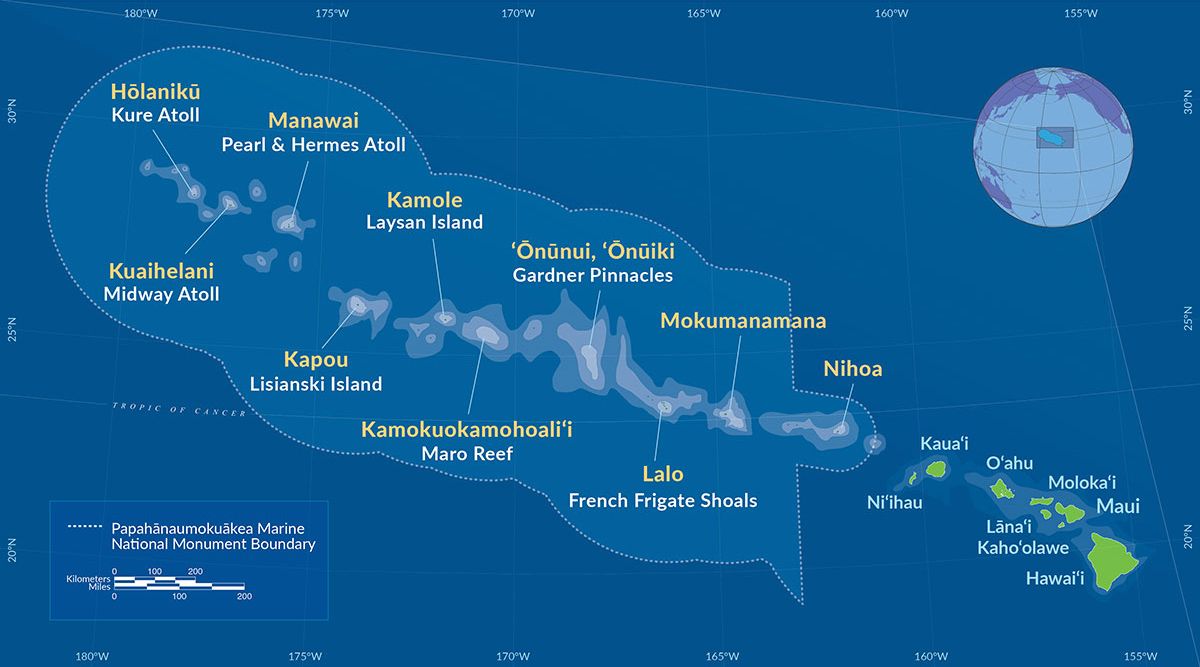
Norway is planning to create ten new national parks along its western edge. Four of them will be brand new, while six will see currently designated conservation areas upgraded into full-blown national parks. It’s part of an effort to protect 30% of Norwegian land by 2030. Afar
The first commercial crop of the methane-busting seaweed Asparagopsis has been harvested off the coast of Western Australia. When added to cattle feed, a daily dose of 20 grams per animal can reduce methane output by up to 95%. While still in its infancy, the asparagopsis industry is forecast to be worth $100 million by 2025. ABC
Chile’s Atacama Desert, renowned for its clear skies and spectacular desert blooms, is set to be made into a national park. Earlier this month, Chilean president Gabriel Boric announced plans to protect the area from development and fund research into its ecosystems. Timeout
California has completed the cleanup of contaminated soil and groundwater in Mission Valley, the site of one of the state's biggest ever toxic fuel spills in the 1980s. Over $70 million gas been spent on the clean-up since 2005, removing almost a million kilograms of petroleum contamination. San Diego Union Tribune
Europe's decarbonisation continues to speed up. The bloc as a whole is now aiming to reach 82% clean energy by 2030, and a handful of nations - Portugal, Austria, the Netherlands and Denmark - are aiming even higher, looking to reach 100% clean power by the end of this decade. Euro News
In 2019, science journalist David Wallace Wells wrote a best-selling book called The Uninhabitable Earth. Three years later, he's in the New York Times with a piece entitled: "Beyond Catastrophe: A New Climate Reality Is Coming Into View." It's well worth a read. Things can (and do) change.
Amidst the justifiably scary talk of climate crisis, it's worth remembering tipping points aren’t just for desertification, ice sheets and coral bleaching. The same gradually-then-all-at-once dynamic also applies to decarbonization. 87 countries have now crossed the 5% tipping point for clean energy, and 19 countries have done it for electric vehicles (Canada, Australia and Spain are next). Bloomberg
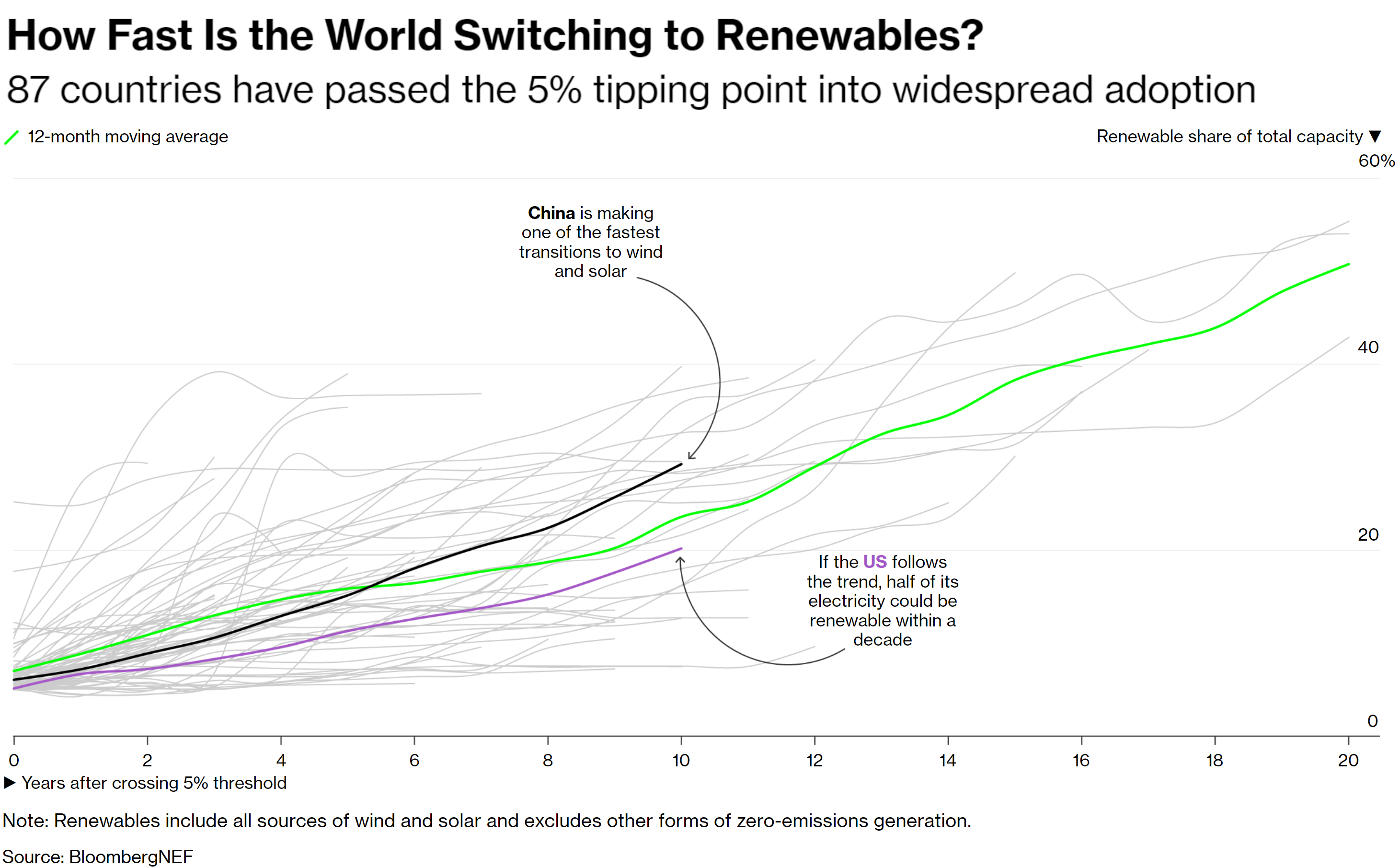
The ambition for solar and wind in China continues to balloon. Early this year, analysts tallied up plans for 600 GW of additions in 2021-25, but have now had to revise that upwards to 870 GW. That equates to China adding a US-sized, instead of a German-sized amount of clean energy, every year. At this pace, China will hit peak emissions by 2025. Lauri Myllyvirta
The city of Chaozhou in China is building a wind farm in the Taiwan Strait so large it will be able to power 13 million homes, or more than all the power plants in Norway combined. Construction on the 43.3 GW offshore wind farm (can't even believe we're writing that number) will begin before 2025. Offshore Wind
US households are installing record numbers of solar panels on their rooftops, loosening ties to the power grid and the utilities that run it. About 5.3 GW will be installed this year, the most ever, and roughly equivalent to all the country's rooftop capacity in 2015. FT
Think solar is booming now? Wait until you see what's coming. China’s solar cell production capacity doubled in 2021, is projected to double again in 2022, and again in 2023. Total manufacturing capacity could break 1 terawatt per year by 2024, most of it high efficiency n-type cell technologies. Buckle up. PV Magazine
Want to see how quickly this technology can eat the world? Check out the energy interconnection queue for the United States. Absolutely astonishing shift in less than a decade, as the not-so-invisible hand of the market has really started to bite. Enough building for you, Marc Andreessen? MISO

Uruguay is doing it right: a low poverty rate, a rapidly increasing middle class and an electricity grid powered by 98% renewables. It’s also pulled off the remarkable feat of increasing annual beef production without any increase in emissions. “The true revolution is a different culture: learning to live with less waste and more time to enjoy freedom.” NYT
Coal has gone off a cliff in India. More than 606 GW of coal-fired power projects has been cancelled or shelved since 2010. The world's third largest energy-consuming country is now adding 4o GW of clean energy a year, on track to surpass its target of 50% of electricity from non-fossil fuel sources by the end of the decade. AP
Fantastic news from our home state, Victoria. Our government just jacked up our clean energy targets to a 95% share of renewables in the electricity grid by 2035 and a 75-80% reduction in emissions by the same date. “The coal generation companies are leaving. They have made their money and they are going." Renew Economy
Common misperceptions about the energy transition in Germany. No, it has not increased carbon emissions, no it has not replaced nuclear with coal, the Energiewende has not increased the country's reliance on Russia and no, renewable energy has not increased the risk of blackouts. Chad Vestor
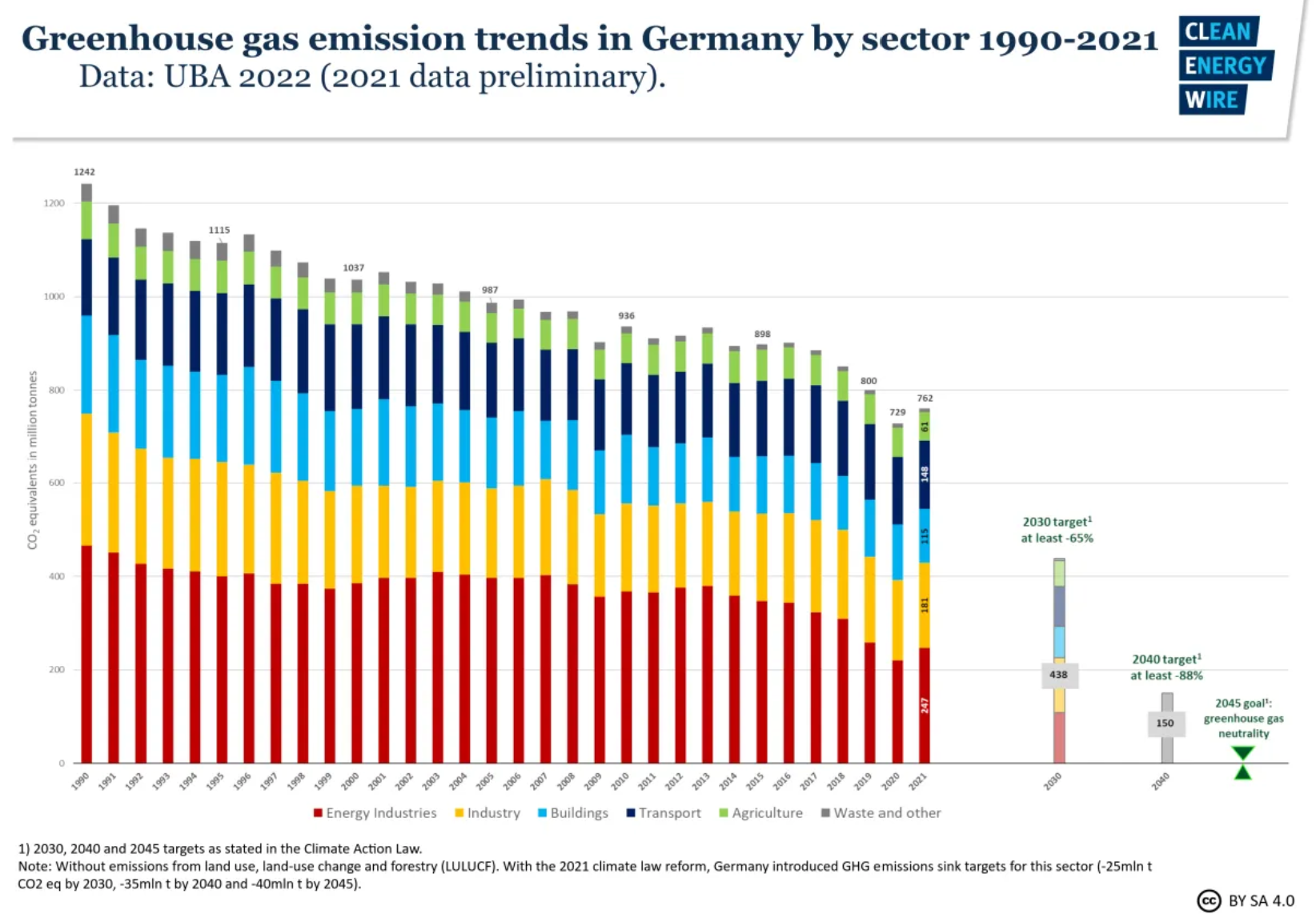
China's year old ban on overseas coal plants has put a significant dent in the global pipeline. Cancellations since the ban was announced account for around a fifth of the 104 coal plants either planned or under construction. Half of those plants have not yet started construction either, making them prime candidates for cancellation. SCMP
New coal projects are becoming 'effectively uninsurable' outside China because so many insurance companies have ruled out support. 62% of the reinsurance market and 39% of the primary insurance market are now covered by coal exclusions, and there has also been a significant shift away from oil and gas, with more than a third of the reinsurance market now covered by exclusions. Insure our Future
The latest company to do so is the world’s largest reinsurer, Munich Re, which published an ambitious oil and gas exit policy earlier this month. The German reinsurer says that as of April 2023 it will not invest or insure projects involving new oil and gas fields or new midstream oil infrastructure.
Deutsche Bank, Germany's largest bank, has committed to reducing the emissions tied to its upstream corporate oil and gas sector loans by 23% by 2030, and by 90% by 2050. The bank also announced new targets for three other high-emitting sectors: power generation, automotive and steel. Reuters
The next time someone tells you lithium is bad for the environment, you might want to remind them that we extracted 4.2 billion tons of oil in 2021, or 1.6x as much as the world's most mined metal (iron ore) and 40,000 times more than all the lithium. EVs and renewables don't just stop global warming and air pollution - they reduce material extraction. Visual Capitalist

Germany will spend €6.3 billion over the next three years to expand its charging network for electric cars, with the eventual goal of a million public charge points by 2030. “We are not just any automotive location, but a leading one in the world. And that’s why it’s important to us that what we’re preparing succeeds.” Reuters
EV battery manufacturing in the United States is about to go nuts. Six gigafactories, worth around $5 billion, were announced between 2018 and 2020. Since the start of 2021, more than 15 new facilities or expansions have been announced, reflecting a potential investment of more than $40 billion. Enough building for you, Marc Andreessen? Dallas Fed
At the biggest trucking show in the world, held in Germany last month, the exhibition was dominated by electric trucks. Scepticism about the future of battery long-distance freight is gone. Reports said it was difficult to spot a single diesel model. "No noise, no vibrations, no emissions. This is the biggest transition we've ever seen." The Driven
24th September 2022 - 7th October 2022
There's been substantial progress in South America in eliminating river blindness, a severe, disfiguring parasitic skin disease. A program launched in the 1990s has eliminated it completely in Colombia, Ecuador, Mexico and Guatemala, and reduced the number of people at risk from over half a million to just 35,518, scattered across the Brazil-Venezuela border. WHO
In the past three years, the number of cancer survivors in the US has increased by a million, reaching over 18 million as of 2022. This is mostly due to progress against lung, colorectal, and breast cancer, whose age-adjusted death rates have decreased by 44%, 42%, and 53% respectively since the 1970s. AACR
The American Cancer Society says breast cancer death rates in the United States dropped by 43% between 1989 and 2020. As a result, 460,000 breast cancer deaths were averted in US women during this period. The average five year survival rate is now over 90% - up from around 70% back in the early 1980s.
Malawi has eliminated trachoma as a public health problem, the first country in southern Africa to do so, and the fourth country in Africa after Ghana, Gambia and Togo. In 2015, there were 7.6 million people at risk of infection. In just seven years, that number has fallen to zero. WHO

Vanuata has also eliminated trachoma, the first Pacific nation to reach this milestone. Eight years ago, 12% of children were infected, prompting the launch of a national programme. Trachoma is the second non-tropical disease to be eliminated from the 83 island nation, after lymphatic filariasis in 2016. WHO
The Serum Institute of India, the world's biggest vaccine maker, has developed a cervical cancer vaccine that costs less than $5, and is aiming for 200 million doses by 2024. Big news. Cervical cancer is the fourth most common cancer among women globally, causing an estimated 342,000 deaths a year, almost all in low and middle income countries. Reuters
Nigeria has recorded a significant decrease in child marriage, with the proportion of girls married before their 18th birthday falling from 44% in 2016 to 30% in 2021. There has also been considerable progress in child mortality, which has decreased from one in eight children dying before their fifth birthday in 2016, to one in ten in 2021. UNICEF
This is going to sound crazy, but did you know that global economic inequality has actually decreased since 2011? The size of the global middle class increased by around 68%, while the proportion of people earning less than $10K a year fell substantially. This reflects the growing prosperity of emerging economies in the last decade, a story most of us hardly ever hear about. Credit Suisse
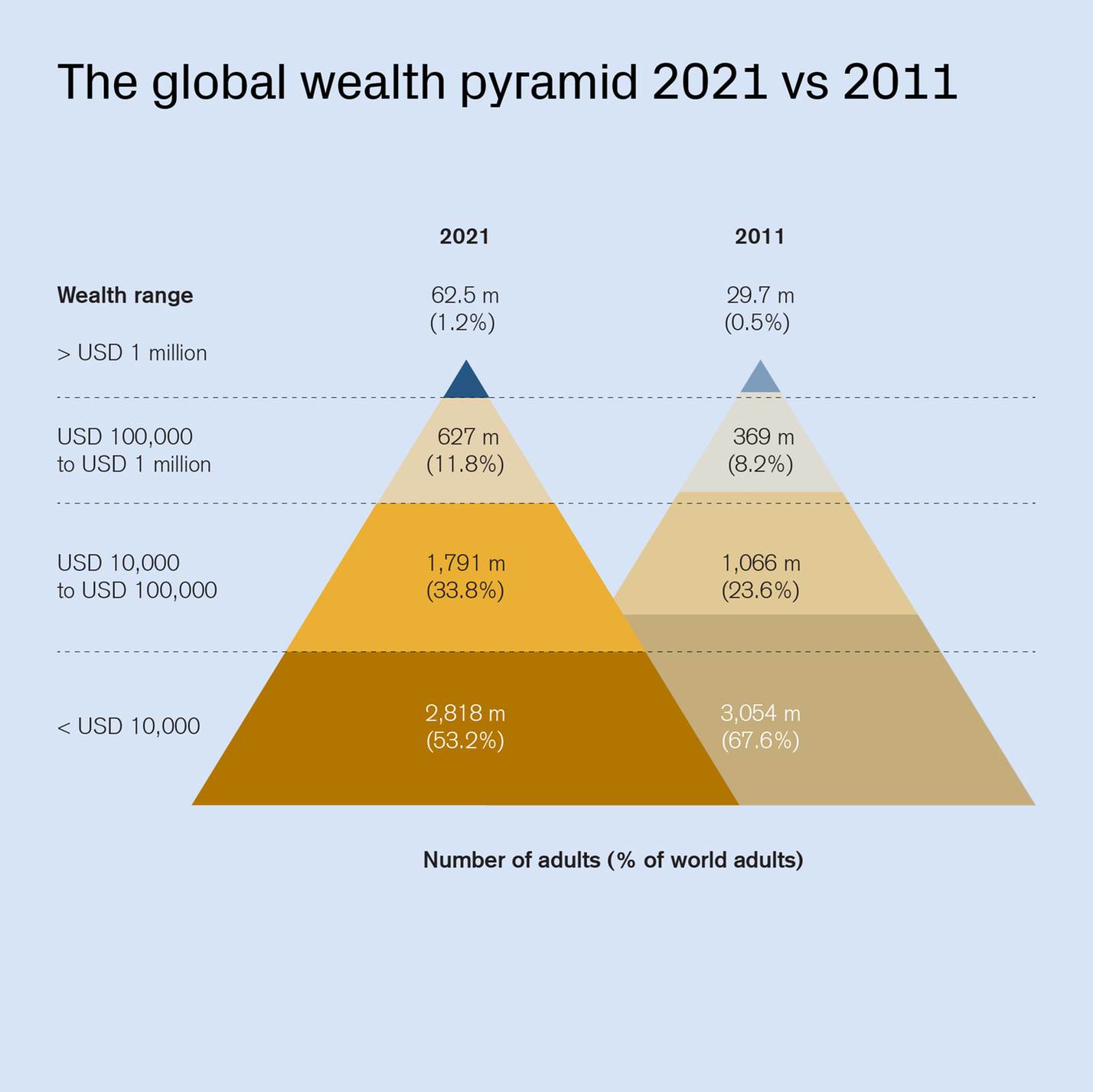
Family planning is an unsung hero in the story of human progress. The number of women and girls using modern contraception in low and lower-middle income countries now stands at 357 million. In the last year alone, their use has averted 135 million unintended pregnancies, 28 million unsafe abortions, and 140,000 maternal deaths. UNFPA
India is on track to meet its SDG targets on child mortality. New figures released by the country's Registrar General show that between 2019 and 2020 there was a 8.6% decline in under five mortality, a 6.7% decline in infant mortality, and a 9.1% decline in neonatal mortality. Economic Times
You might remember that earlier this year we reported Hawaii has reached the milestone of having no girls in its only youth correctional facility — a first in state history. Here's a great story from NBC on how they pulled that off, and how it could be a model for other states to follow.
Violent crime continues to fall in the United States. Between 2012 and 2021, the rate of violent victimization (sexual assault, robbery, aggravated assault, and simple assault) declined from 26.1 to 16.5 incidents per 1,000 people. Wouldn't it be nice if this data from Department of Justice appeared in any news outlet other than this one?
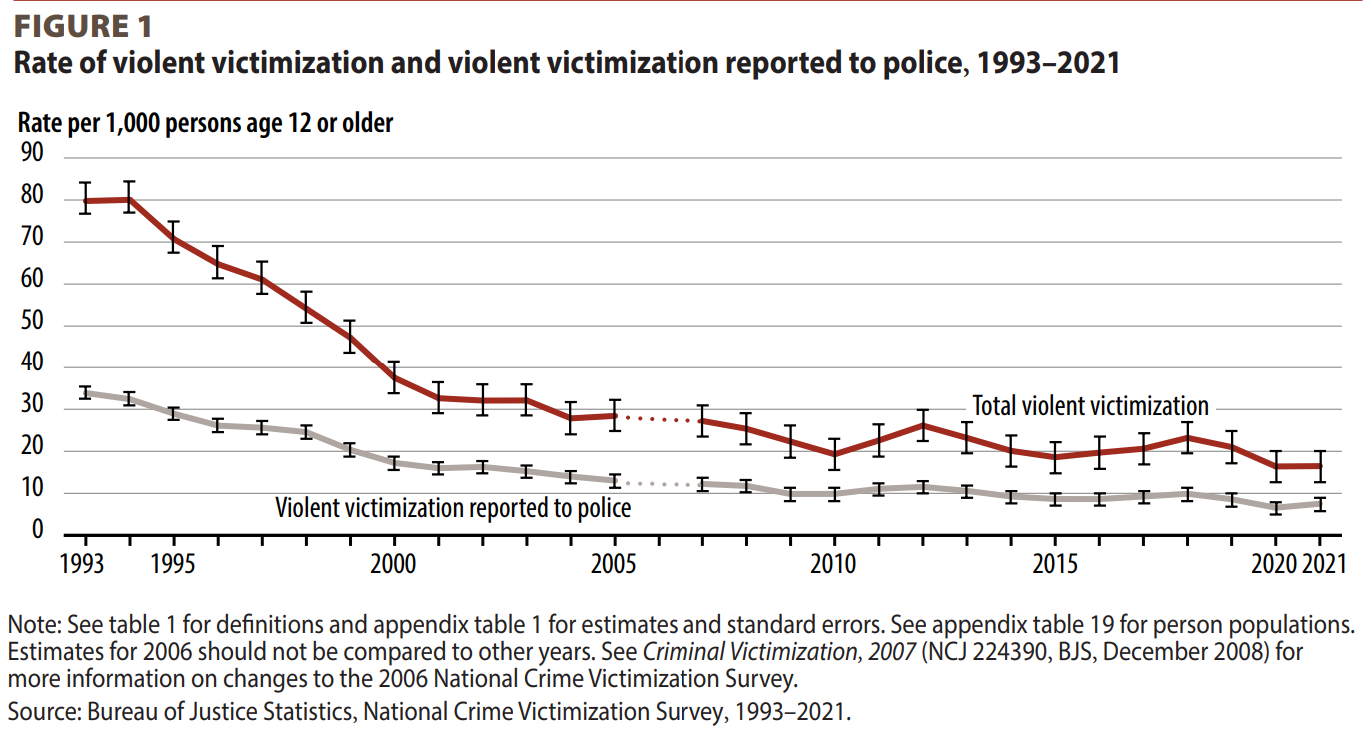
Five years after #MeToo went viral, seven in ten adults in the United States say that people who commit sexual harassment in the workplace are now more likely to be held responsible for their actions, and about six in ten say that those who report harassment or assault at work are more likely to be believed. Pew
India's Supreme Court has upheld the right of a woman to an abortion up to 24 weeks into pregnancy regardless of marital status, a decision widely hailed by women's rights activists. This overturns a law dating from 1971, which limited the procedure to married women, divorcees, widows, minors, 'disabled and mentally ill women' and survivors of sexual assault or rape. Reuters
The world's biggest trial of a four day work week, involving 70 firms giving 3,300 employees full pay for 80% of their normal hours, just reached its halfway point. 46% of firms say overall productivity has actually improved, and more than eight in ten say it's working so well they're going to keep on going once the trial ends. Gizmodo
Cubans have overwhelmingly approved gay marriage and adoption in a government-backed referendum that also boosts rights for women. 66.9% of voters said yes to a new family code that legalizes same-sex marriage and civil unions, allows same-sex couples to adopt children, and promotes equal sharing of domestic rights and responsibilities between men and women. Reuters
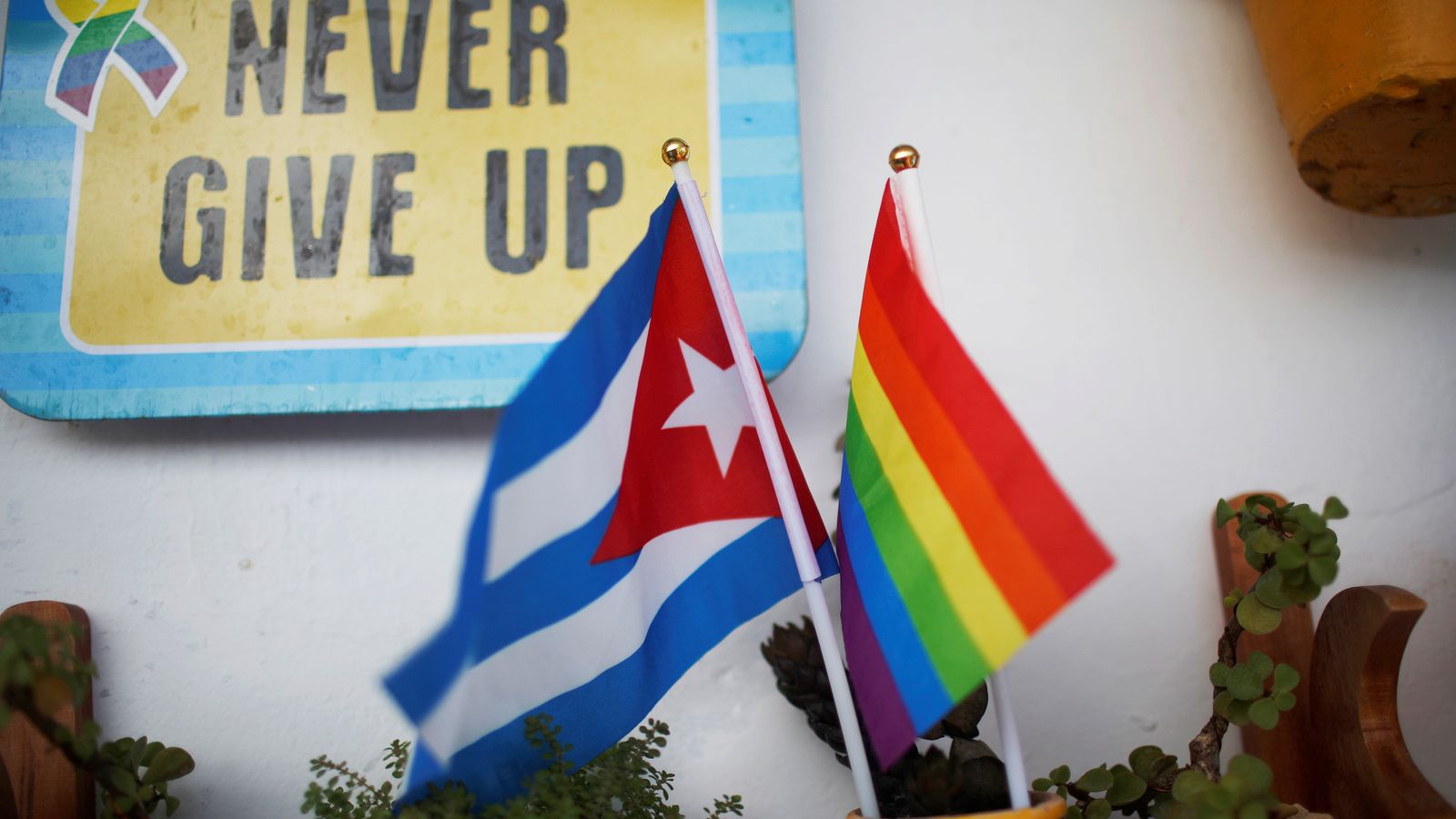
Poland has welcomed over two million Ukrainian refugees with open arms. Private citizens have spent $2.1 billion on aid, the government has spent $3.4 billion, and 1.2 million Ukrainians have been granted access to health care, education, and social benefits. Attitudes are changing too. 80% of the population now supports taking in refugees fleeing violence and war, up from 49% in 2018. Bloomberg
The Dominican Republic has passed legislation enshrining the rights of domestic workers. They will now have access to minimum wage, defined working hours, insurance coverage, workplace injury protection, survival and disability benefits and inclusion in state pension programs. Latina Republic
"No new extinctions." Australia has unveiled an ambitious ten-year recovery plan for threatened species, including the prevention of any new native animal or plant extinctions. The government has pledged $224.5 million towards the project, and committed to conserving 30% of the continent's land mass. Australian Geographic
Spain has become the first country in Europe to give personhood status to an environmental entity - legally recognising the rights of the Mar Menor lagoon to exist as an ecosystem and evolve naturally. More than 600,000 citizens backed the initiative after the lagoon suffered massive degradation from coastal development and local farming. Euro News
If you're looking for a definition of 'regenerative' how about this? As America’s coal industry recedes, it's leaving behind barren, acidified sites across Appalachia. Chestnut seedlings however, thrive in those soils, and conservationists are now planting tens of thousands of them on former mines across the region. NYT
Did you know last year's infrastructure bill, passed by the US government, contains more than $55 billion in funding for water projects? The first tranche of funding, totalling $7.4 billion, went out at the end of last year, and now another tranche of $1.3 billion has been awarded to 18 states. ENR
After seven years of lobbying, 661,416 hectares of wetland in Argentina has been declared as a new protected area, the Ansenuza National Park. It’s the largest wetland in South America and a crucial ecosystem for 66% of all migratory and shorebird species, including three species of flamingos. WHSRN
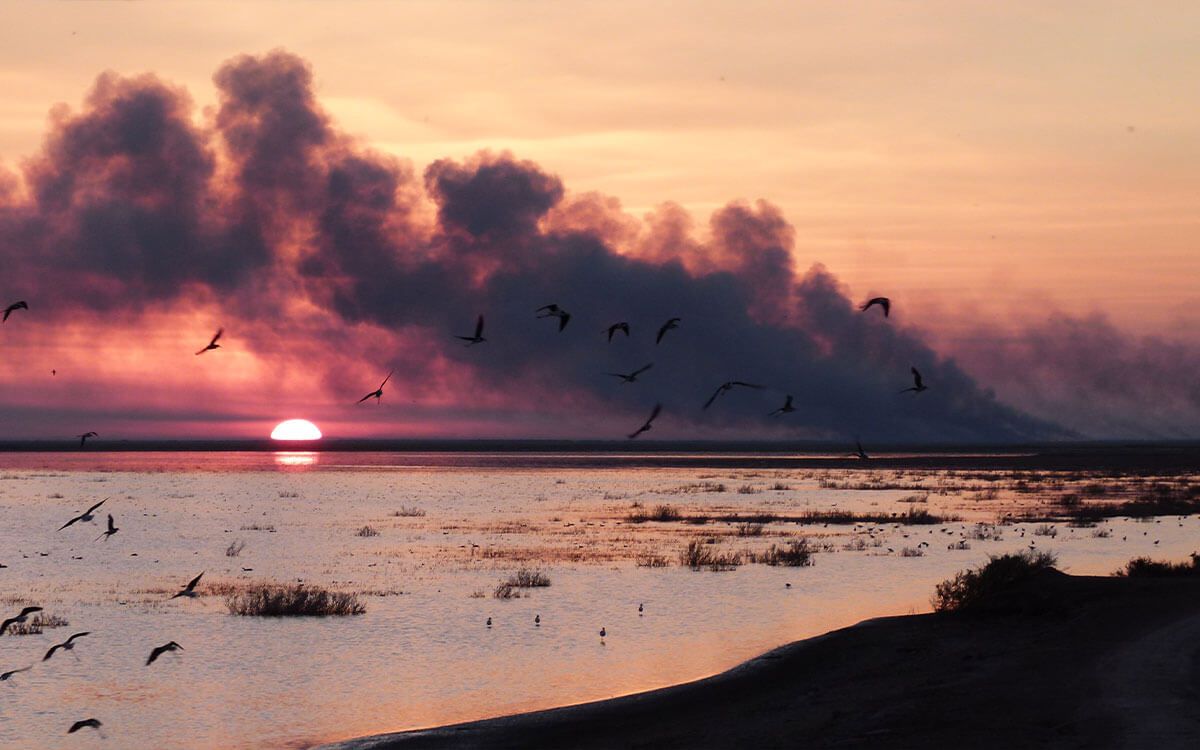
Multiple Indigenous nations across Canada are declaring protected areas based on their own sovereignty. The idea took off in 2018, following the publication of a report showing Indigenous-led conservation could help Canada reach its commitments on climate change and conservation. Half a million square kilometres of protected areas across the country have now been proposed. Narwhal
Europe has closed 87 sensitives zones to bottom trawling in the Atlantic, putting 16,419 km2 of waters below 400 metres off limits. This comes after a ban four years ago on bottom trawling below 800 metres, providing further protection for vulnerable marine ecosystems such as cold water reefs, sea mounts and sea pens. EC
New fishing regulations will ban bottom trawling in Kattegatt, a 30,000 km² sea area between Sweden & Denmark, which is home to porpoises and endangered Swedish shark species. Conservation groups have fought for the measures for over a decade and the new regulations are now the strongest in Europe. Greenpeace
As of Tuesday this week, plastic shopping bags are not allowed in Montreal. The regulations apply to all retail businesses and restaurants, the first of a series of moves designed to make Canada's second largest city zero waste by 2030. Next thing to go is single use plastic in restaurants, starting in March 2023. TVA Nouvelles
Paris is winning its war on cars. Since 1990, the proportion of car journeys has dropped by 45%, public transport use has risen by 30%, and cycling has increased tenfold. Next up: a new citywide speed limit of 30 km/h, car-free zones outside schools, and 'peaceful zones,' that make it illegal to drive through the city centre without stopping. RTBC
Poaching is less of a threat to sea turtles than it used to be, with a new analysis showing illegal poaching has dropped sharply around the world in the last decade. The numbers are reflected in anecdotal reports from conservationists too. In Lousiana, for example, hatchlings have been spotted on the uninhabited Chandeleur Islands for the first time in over 75 years. PBS

Conservationists are celebrating the recovery of the snail darter, a small freshwater fish native to the Tennessee river. In the 1970s, the fish became the focus of a Supreme Court ruling and an act of Congress when a proposed dam threatened its extinction. It was transplanted to the Hiwassee and Holston rivers and today can be found in several additional locations. Mirage
European populations of mammals and birds are bouncing back following decades of successful conservation initiatives. Most of the 50 species tracked for a new report, including bison, lynx, wolves, beavers and bears, are increasing in numbers and spreading to new areas across the continent. “It shows that, if you take measures, wild animals can recover.” Bloomberg
New animal welfare legislation in New Zealand will ban live animal exports by sea from April 2023. Although the country only exports animals for breeding, not slaughter, its remoteness means animals are at sea for extended periods, heightening welfare-associated risks. Guardian
After been hunted to extinction 400 years ago, Eurasian beavers have been declared a protected species in England, making it illegal to capture, kill, injure, or disturb them. Wildlife organisation have praised the move, saying beavers' dams help keep water clean and prevent flooding and drought. BBC

Based on the headlines, you'd expect the global energy crisis to have caused an increase in coal and gas in 2022. Except that's not what happened, at least in the electricity sector. In the first half of 2022, renewables and hydro met all of the growth in global electricity demand, preventing a 4% increase in fossil generation, avoiding $40 billion in fuel costs, and avoiding 230 Mt of CO2.
It's worth drilling down on the numbers for the world's four biggest emitters. In China, wind and solar additions caused fossil fuel power to fall 3%, rather than rise by 1%. In India, they slowed down the rise from 12% to 9%, and in the United States, from 7% down to 1%. In Europe, they prevented a major carbon bomb; without wind and solar, fossil fuel generation would have risen by 16% instead of 6%.
Why are we reporting this for the second time in a row? Because meeting additional global demand with clean electricity is the first step to stopping growth in fossil fuels. Only once we achieve that can we begin phasing dirty energy down. Huge, huge milestone for the global clean energy transition. Ember
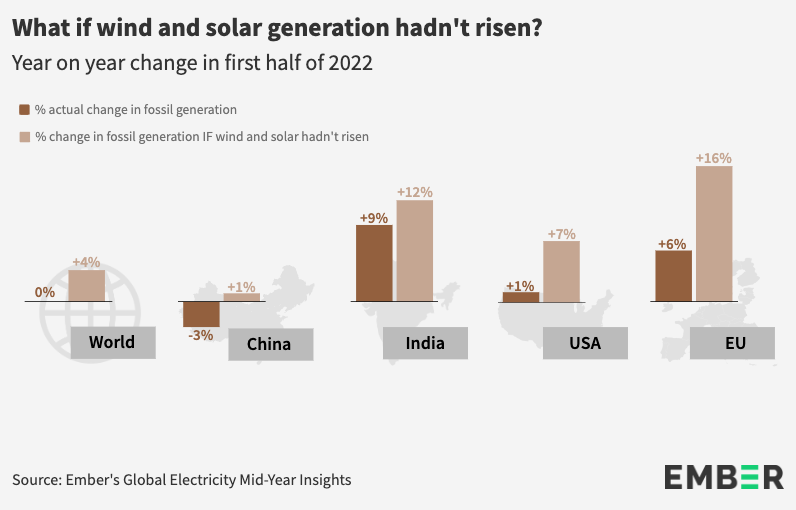
What if the the US Senate passed an international climate treaty so powerful it could avert nearly 1°F of global warming, and nobody noticed? That's pretty much what happened last week. Fortunately, Robinson Meyer has it covered over at the Atlantic.
Utility scale solar is now a third cheaper than fossil gas in the United States, "presenting a deflationary opportunity for electric supply costs" (hello Inflation Reduction Act). That's why there is now a mind-bending amount of solar in the country's interconnection queues, 674 GW to be precise, 284 GW of which includes batteries. Bloomberg
A recent report from the IEA says that to meet global climate goals, the world needs to mobilize $90 billion in public funding for commercial-scale demonstration projects by 2026. Never going to happen right? Except it already has. Last week, 16 countries delivered $94 billion in funding, exceeding and achieving the goal four years early. Department of Energy
Loy Yang, Australia's most polluting power plant, is going to be shut ten years earlier than planned. Fantastic news! The giant brown coal station generates about 30% of the state of Victoria's power every year, and emits twice the amount of CO₂ as every gas power generator in the national electricity marker combined. SMH

It's been a good few weeks for the clean energy transition in Australia. Victoria announced a target of 6.3 GW of storage by 2035, enough to power half the state's homes at peak energy use, and Queensland, the heartland of Australia's coal industry, announced a plan to get 80% of its energy from renewables by 2035.
It's been a good few weeks for the energy transition in Germany. The country's largest coal power company, RWE, which owns more than a quarter of the remaining coal fleet, is bringing forward its phaseout date by eight years to 2030, and the largest coal miner, LEAG, is investing €10 billion to turn 33,000 hectares of its mining assets into Germany's largest green energy hub.
Portugal has raised its debut offshore wind power auction target to 10 GW, more than three times the target at the start of 2022. That kind of capacity should be able to produce around 45 TWh a year, equivalent to 90% of the country's 2021 national electricity consumption. In a single auction. Reuters
Beginning in April 2025, Tokyo the largest city in the world, will require all newly constructed homes to have solar panels. The regulation will make it the first prefecture in Japan to have such a requirement, and will affect a hefty percentage of all new buildings. ZME
In 2020, electric vehicles accounted for 5% of all new car sales in China. In 2021, the proportion had shot up to 13%, blowing every forecast out of the water. For 2022, electric cars are on track to hit more than the a quarter of all car sales. “We have reached a point where we’re competing on price, we’re competing on features. It’s not a subsidy thing. The market is taking over.” Exponential View

In Germany, electric cars aren't the future. They're the present. Plugin vehicles hit 28% market share in August, and Tesla isn't even in the top five brands by overall sales. The most registered passenger electric car in Germany so far this year? The Fiat 500 electric. Clean Technica
Can Europe decarbonize its heavy industry? The answer, increasingly, seems to be yes, thanks to tougher emissions targets, rising carbon prices, changing consumer demand and most importantly, low carbon technologies coming of age. More than 70 projects across the continent are now commercialising decarbonization in basic-materials industries. Economist
Ford's electric vehicle sales tripled in September, driving an increase of 16% in overall deliveries in the latest quarter. The company's increased the price of the electric F-15o twice in the last month. Also, responding to 'overwhelming demand,' the EPA is nearly doubling the money available to states to buy electric models of the iconic yellow school buses that millions of children ride every day.
New York is following in California’s footsteps with a new regulation that requires all new passenger cars, pickup trucks, and SUVs to be zero emissions by 2035. Oh, and electric vehicle charging sites now outnumber petrol stations in Manhattan by ten to one, and are fast approaching parity across all five boroughs. Autoblog
Another week, another electric plane. Or how about two? Swedish company Heart Aerospace has unveiled its ES-30, a regional hybrid-electric plane with a capacity of 30 passengers, and in Washington, US startup Eviation has completed the first test flight of its nine passenger prototype. “It’s an opportunity to build the future of aviation. It’s revolutionary.”

10th September 2022 - 23rd September 2022
The WHO says the end of the COVID-19 pandemic is officially in sight. Weekly reported deaths have fallen to their lowest level since March 2020 and attention is now turning towards helping countries 'finish the race'.
Over the past two decades the Global Fund has saved 44 million lives from three of the world’s deadliest epidemics, AIDS, tuberculosis and malaria. One of the biggest drivers of the fund’s success is its community-led approach. It was one of the first international organisations to give community groups a voice and representation at board level.
Global AIDS deaths fell to 650,000 in 2021, down by more than 11% since 2019. While the fight is far from over and huge challenges still remain, it's an extraordinary achievement. The tens of thousands of activists, donors and healthcare workers who made it happen deserve more recognition (they sure aren't getting any from global media). UNAIDS

Leprosy has decreased from over five million cases a year in the 1980s to just 133,802 in 2021. In the past decade there has been a 42.5% decrease in new global cases. Multidrug therapies and screening programs have been instrumental in reducing transmission and 14 countries have reported no new child cases for five consecutive years. WHO
Have you heard of the UNFPA Supplies Partnership? It's one of the most impactful, yet least known aid programs of all time, delivering contraceptives and maternal health medicine to adolescents and women around the world. Since 2008 it's prevented 89 million unintended pregnancies, 26.8 million unsafe abortions, 254,000 maternal deaths, and saved 1.6 million children.
Tanzania is one of the world's worst affected countries by malaria - but has made significant progress in the last decade thanks to bed nets, insecticides, and a new vaccine. Malaria-related deaths decreased by 71% between 2015 and 20121, and prevalence among primary school children has also nearly halved, falling from 21.6% in 2015 to 11.8% in 2021. Global Citizen
The poverty rate in America plummeted to 7.8% in 2021, the lowest level on record, cutting the number of children in poverty by nearly half. "Even temporary support can have lasting impact. There is a great literature that shows improvements in income, especially at early ages, have long-term payoffs for kids."
Youth crime has reached its lowest level on record in the United States. In 2020, there were an 424,300 arrests for violent crime involving persons younger than 18. That's 38% lower than the number of arrests in 2019, half the number of arrests from five years earlier, and 78% below the 1994 peak. Naturally, this story has been making headlines everywhere. OJJDP
Oklahoma, which once had the highest incarceration rate in the US, has achieved remarkable success in reducing prison populations. A series of bipartisan bills has led to a 21% decline in prison populations in the past five years — from 28,342 in 2017 to 22,341 in 2022. Among other achievements, the number imprisoned for felony offenses has fallen by a third, and for drug offenses by 62%.

Incredible thread summarising efforts in the US to reform bail. Hundreds of thousands more people are free and hundreds of millions of taxpayer dollars have been saved, without any correlated increase in crime. Turns out people are less likely to commit crime if you let them return to their jobs and communities. "We can have more freedom, more fairness, and more safety all at once.”
El Salvador, once known as the 'murder capital of the world' has substantially reduced its murder rate since 2015. Seven years ago, the rate was 103 homicides per 100,000 people - the highest in the world. In 2021, that had dropped to 18 per 100,000, and the downward trend has continued into 2022. El Salvador Info
Equatorial Guinea, one of the world’s most authoritarian countries, has become the latest nation to get rid of the death penalty. Capital punishment has been 'totally abolished' in the central African country after the president signed a new penal code earlier this week. Guardian
After decades of advocacy by labour activists, Spain has passed a landmark law improving the rights of domestic workers. The new regulations, which enter into force on the 1st October 2022, will give over 370,000 domestic workers (almost all women) the right to unemployment benefits, appeal against unfair dismissal, and health and safety protections equivalent any other employed person. ILO
Poland has welcomed over two million Ukrainian refugees with open arms. Private citizens have spent $2.1 billion on aid, the government has spent $3.4 billion, and 1.2 million Ukrainians have been granted access to health care, education, and social benefits. The war is also changing attitudes. 8 in 10 Poles now support taking refugees that are fleeing violence and war, up from 49% in 2018. Bloomberg
Yvon Chouinard, the ‘existential dirtbag’ who founded Patagonia, has given away the entire company to a trust that will use future profits to fight the climate crisis. "Earth is now our only shareholder. Instead of extracting value from nature and transforming it into wealth for investors, we’ll use the wealth Patagonia creates to protect the source of all wealth." Guardian
The National Oceanic and Atmospheric Administration of the United States has says that concentrations of CFCs, the harmful chemicals that damage the ozone layer, have now dropped by just over 50% compared to the 1980s. Scientists say it is a “significant milestone” on the path to recovery. Euro News
The US Senate has ratified the Kigali Amendment, a global climate treaty that formally phases down the use of HFCs, the industrial chemicals that replaced CFCs in the 1980s. Republicans supported the phase-down as being good for business, while Democrats and climate activists praised it as good climate policy. NYT

Chip Wilson, the founder of Lululemon, has pledged $75.8 million to acquire wilderness in British Columbia. It's one of the largest philanthropic gifts in Canadian history, and will be used to buy forests and repurchase mining, forestry and other resource licenses, turning huge tracts of land into parks managed by indigenous communities. Bloomberg
Two inspiring river stories for you. In the Netherlands rewilding experts are undoing 500 years of engineering on the Meuse River, a project described as Europe’s largest river restoration. In Canada, indigenous communities are co-leading an effort with the government to restore the estuary of the Squamish River, "reopening its lungs, and bringing back the natural being of it.”
Three great ocean conservation stories too. The Republic of the Congo has created its first ever marine protected areas, covering 4,000 km2 off the West African coast, Albania has declared its Porto-Palermo Bay as a nature park, and after a decade of work Canada has unveiled a blueprint for a vast network of marine protected areas across the northern third of its West Coast.
Make it four. 20 years ago, Indonesia's Raja Ampat archipelago was in trouble due to unsustainable fishing practices. In 2004 authorities incorporated it into a network of over 20,000 km2 of protected areas, and today fish populations have rebounded, coral is recovering and livelihoods for local communities have improved. Earlier this year it was given a Blue Parks Award. CNN
After a decade of efforts, Sweden has hit a new recycling record, collecting 552,600 tonnes of packaging in 2021, an increase of 6% since 2020. On average, each Swede handed in 53 kg of packaging including 23.2 kg of glass, 18.9 kg of paper and 9 kg of plastic. Warp
Over the past decade Bridgestone has invested more than $100 million into eco-tyres made from guayule, a drought-friendly shrub that produces a compound that's good enough for race tyres. The eco-tyres have been tested on Indy Cars for over a year and provide 'similar or better performance' than traditional rubber tyres. Ars Technica

Italy has officially banned the slaughter of male chicks to end the culling of up to 40 million young birds by the egg industry each year. It follows two years of campaigning by activists, starting with a petition in 2020. France and Germany have also banned culling and a similar petition in the US has exceeded 50,000 signatures. Plant Based News
The world’s largest shipping company, the Mediterranean Shipping Company, is rerouting its fleet to avoid collisions with endangered blue whales off the southern tip of Sri Lanka. The company is working with scientists and marine experts to modify its navigation guidance to reduce the risk of a ship striking a whale by 95%. Business Insider
After being driven to extinction in the United Kingdom in 1979, the large blue butterfly has just had its best year since record keeping began 150 years ago. The success is thanks to reintroduction efforts that began in 1983, and the establishment of multiple protected habitats across southwest England. Ecowatch
There has been a string of recent successes in rewilding the osprey across the UK. After being hunted to extinction in the 19th and early 20th centuries, there are now close to 300 breeding pairs across the British Isles. “It’s been a tremendous success. From a human perspective, we’re making good on what we destroyed." Guardian
The US federal duck stamp program is one of the most successful conservation programs ever created. Since 1934, it's raised $1.1 billion through sales of stamps, and helped conserve more than six million acres of habitat. Earlier this week the Interior Department announced another $105 million of funding to conserve or restore 116,305 acres of habitat for waterfowl and other birds in 18 states. Mirage

Two of the world's top universities have recently published research proving that saving Planet Earth really is cheaper than ruining it. Last month, Marc Jacobson and his team at Stanford showed that for 145 countries, a transition to 100% wind, water, solar and storage would pay for itself within six years, and create 28 million new jobs. 95% of the technologies needed are already fully commercial.
Now another study from Oxford has come to a similar conclusion, showing that switching from fossil fuels to renewable energy could save the world as much as $12 trillion by 2050. If solar, wind, batteries and electrolysers stay on their learning curves for another decade, we will achieve a near-net-zero emissions energy system within just 25 years.
Feels impossible, until it's done. Take California. For years, it clung to its contradictory status as both a climate leader and prolific fossil fuel producer. But no longer. Among the flurry of bills that's been passed in recent weeks are a set of extraordinary, once unthinkable restrictions on the state’s oil and gas industry. New Republic
Well that happened fast. Clean energy now provides more employment globally than fossil fuels, according to the International Energy Agency. Clean energy, which under IEA’s definition includes nuclear power, is now estimated to account for 40 million jobs, more than half of the 65 million energy sector jobs globally.
Contrary to the stories we've been getting from almost every media outlet in the world, Russia's invasion of Ukraine has reduced fossil fuels usage. While global power demand in the first half of 2022 grew by 2.5%, emissions fell by around 1%. Coal consumption by power plants dropped 1.2% and gas saw a small decline too, compared with a 17% jump in wind and solar output. Bloomberg

Installations of rooftop solar in Spain have increased ten-fold in 2022. Favourable rules and ample room for expansion, combined with soaring costs for other forms of energy, have accelerated what was already a very strong growth trend in the sun-drenched nation. Who's responsible? See above. Bloomberg
Nine nations bordering the North Sea have announced a massive increase in targets for offshore wind power in the coming decades. The numbers are insane. 76GW by 2030, 193 GW by 2040 and 260 GW by mid-century. To put this in perspective, current capacity in the region is less than 20GW. Time to build. AP
Samsung, one of Asia's biggest industrial giants, has committed to reaching net zero for its mobile, television and consumer electronics divisions by 2030, and across all global operations including semiconductors by 2050. Pepsi and agriculture giant ADM are partnering to implement regenerative agricultural practices on two million acres of American farmland by 2030.
Norway's sovereign wealth fund will require all companies it invests in to reach net zero by 2050. This might not sound like a big carbon coup, but it is. The fund is estimated to own around 1.3% of the global stock market, putting it in a position to exert genuine pressure on major companies to clean up their act. Reuters
Liaoning, a province in the northeast of China that was once one of the country's major coal and industrial hubs, has launched a $87 billion plan to expand clean energy production. The province is planning 60GW of renewables, nuclear and virtual power plants, enough combined generation to power all of Thailand. Bloomberg
Japan is forecasting a huge wave of power plant closures this decade. Its Ministry of Economy, Trade and Industry is now predicting over 43 GW of thermal capacity shutting by 2030. That's 50% higher than previous estimates, and represents a quarter of all the country's fossil fuels capacity. Bloomberg Japan
Electric vehicles are exploding across the United States. Market share in the southeast has doubled compared to last year, Hertz just announced plans to order 175,000 EVs from General Motors, Bloomberg has updated its forecasts to 50% market share by 2030, and none of the car companies can keep up. WSJ
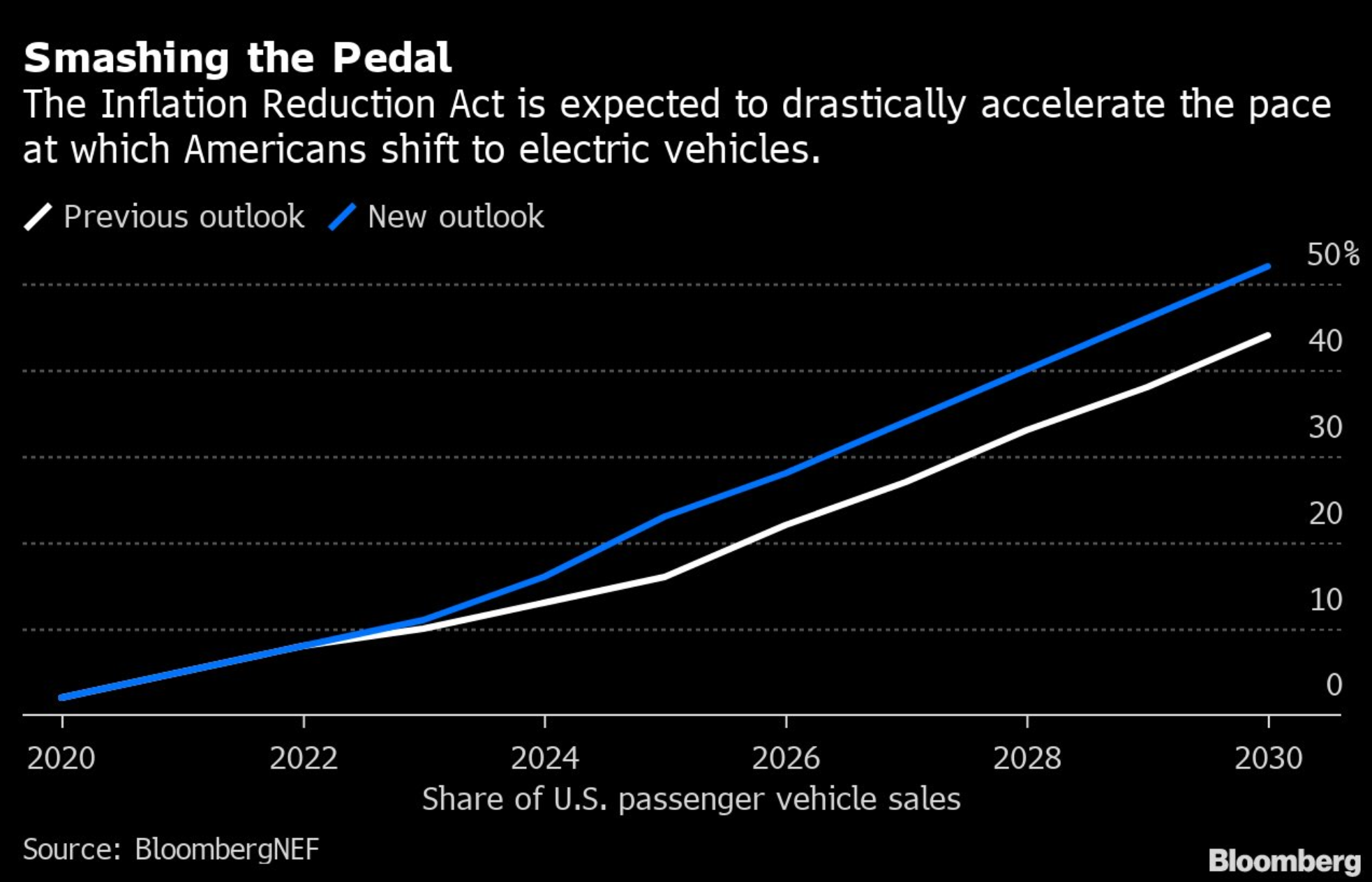
Spain is getting serious about cleaning up its air. Due to legislation passed last year, all municipalities with 50,000 residents or more will have to implement low-emission zones within their borders in 2023. According to one Spanish news source, that’s nearly 150 Spanish municipalities. Clean Technica
That's part of a wider trend. The number of clean air zones across Europe has risen 40% since 2019. Low-emission zones have now been introduced in 320 European city regions, a figure expected to rise to 507 by 2025. All ten of the continent's most popular tourist cities now restrict petrol and diesel clunkers. C'mon Straya. Guardian
Thyssenkrupp, Germany’s largest flat steel manufacturer, has formally decided to begin the move away from coal at its flagship Duisburg plant due to customer demand for green steel. Starting in 2026, 2.5 million tonnes a year will be made using hydrogen-powered direct reduction, about 6% of all German steel production.
If exponential growth in solar and wind blew your mind... if you never saw the electric vehicle rocket coming... we've got news for you. Heat pumps are next. Switching to one is one of the few individual actions you can take to drastically reduce your climate impact. Wondering where to start? Try this.
Mercedes-Benz just unveiled its long haul trucking prototype. The engineering is incredible - 500 kilometres per charge, 10 ton payload, 1.2 million km battery life, no tail pipe pollution, hardly any noise and regenerative braking. A timely reminder that electric vehicles don't just replace combustion engine vehicles, they're actually better on multiple counts.
Volvo is launching three new massive electric truck models. Full scale production has begun on the the Volvo FM, Volvo FH, and Volvo FMX. Each weighs up to 44 tonnes, and designed to cover a wide range of applications including city distribution, refuse handling, regional transport, and construction work. Business Green

21st August 2022 - 9th September 2022
Countries in southeast Asia have made substantial progress towards eliminating measles, with 5 out of 11 achieving elimination in the last two decades. Measles cases declined by 92% between 2002 and 2020, and the death rate decreased by 97% - saving an estimated 9.3 million lives during this period. WHO
Maternal mortality rates in Zimbabwe declined from 657 deaths per 100,000 births in 2007, to 217 per 100,000 births in 2019. Significant improvements in maternal, neonatal and child health as well as interventions to reduce HIV, malaria and TB are working. Egypt and South Africa have also seen declines. BMJ
A malaria vaccine with 'world-changing' potential has been developed by scientists at Oxford, who expect to roll it out next year after trials showed up to 80% protection from the world's deadly animal. A deal has already been reached to manufacture 100 million doses a year. The charity Malaria No More says it might mean children dying from malaria could end "in our lifetimes". BBC
Togo has become the first country to eliminate four neglected tropical diseases: dracunculiasis, lymphatic filariasis, human African trypanosomiasis and trachoma. All four were eliminated in just eleven years. These diseases are symptoms of extreme poverty, and lifting their burden will lead to social and economic benefits. WHO
This is an outstanding achievement and a gift not only for the people of Togo today but for generations to come.
Dr Tedros Adhanom Ghebreyesus, WHO Director General

Iran is on the cusp of eradicating illiteracy, with the rate now surpassing 98%, a huge leap from just 48% in the 1970s. The country has also closed its literacy gender gap from 23% in 1976 to less than 6.1% in 2020. Meanwhile, government efforts in Cambodia have increased the literacy rate among adults from 77.6% in 2008 to 87.8% in 2020.
In its 75 years since independence, India has made astounding progress in public healthcare: eradicating both polio and smallpox, decreasing HIV and malaria, and reducing the infant mortality rate from a harrowing 200/1,000 births in the 1940s to just over 27 per 1,000 births today. Healthcare efforts have more than doubled average life expectancy from 32 years in 1947 to 70 years in 2022. Times Now
Fewer families in India are using prenatal testing to ensure the birth of sons rather than daughters. The imbalance of boys to girls peaked in 2011, with 111 boys per 100 girls. Government efforts to curb sex selection and cultural shifts over the past decade are starting to normalise the balance with 108 boys per 100 girls recorded in 2021. Pew
India’s ambitious Jal Jeevan Mission, which aims to connect piped water to 192 million households by 2024, is over halfway to meeting its goal, having reached a 100 million homes. The initiative is already reaping huge benefits in public health, with a 66% decline in water-borne diseases in areas provided with clean drinking water. Hindustan Times

Singapore's controversial 377A law has been repealed, effectively decriminalizing homosexuality. While there is still a long way to go in fighting discrimination, the landmark decision marks a significant shift in attitude for a country where LGBTQ+ rights were completely taboo a few decades ago. BBC
After years of advocacy, Vietnam has taken a big step forward in LGBTQ+ rights, with the government declaring that being gay, bisexual, or transgender is not a disease and urging practitioners to end discrimination in medical care. Meanwhile Canada has joined the UK, Ireland, and the Netherlands in creating a national LGBTQ+ action plan, pledging $100 million to support community groups.
Historic legislation in Spain with the passing of the 'only yes means yes' law. Its the result of one woman's campaign after she was raped by five men during the 2016 bull-running festival in Pamplona. Under the new law, sexual consent must be affirmative and cannot be assumed by default or silence. Guardian
The tides of public opinion are shifting in America, with 66% of voters now supporting a woman's right to choose, up from 55% in March. Approval of interracial marriage continues to climb too. According to Gallup, it's reached a new high of 94% - up from just 4% when the poll was first taken in 1958.
Attitudes can and do change, sometimes in less than a generation.

Smoking in the United States has reached its lowest levels ever, with just 11% of people saying they now smoke cigarettes. Good news, because smoking is the cause of about 20% of all cancers, and lung cancer is the leading cause of all cancer deaths. The decline in smoking is one of the main reasons cancer deaths have fallen by 27% in the last two decades.
Japan’s roads are now among the safest in the world, recording less than 3,000 fatalities in 2021- a more than five fold decrease since the 1970s. The dramatic decline is attributed to the country’s innovative approach to public transport, including the world’s first bullet trains, no on-street parking in neighbourhoods and the introduction of microcars. Bloomberg
Did you know that the Inflation Reduction Act contains the largest single round of funding for conservation in the history of the United States? Audubon
- $4 billion for drought resilience and water conservation in the American West.
- $2 billion for wildfire risk reduction, including funds for nature-based solutions like beavers, to restore natural hydrology and reconnect river systems.
- $450 million to help private landowners manage forests and to provide incentives to conserve more forest ecosystems.
- $220 million for tribal climate resilience and $550 million for disadvantaged communities to plan, design, and build water projects that create or improve reliable access to water.
- $2 billion for forest management to make national forests more resilient to climate change, and to provide important bird habitat and ecosystem services like water quality, flood control, and carbon storage.
- $1.5 billion in grants for urban and community forestry.
- Hundreds of millions of dollars for wetland conservation and restoration.
- $121 million for rebuilding and restoring parts of the National Wildlife Refuge System and state wildlife areas.
- $2 billion for forest management to make national forests more resilient to stressors like climate change, and provide important bird habitat and ecosystem services like water quality, flood control, and carbon storage.
- $2.6 billion dollars for coastal protection and restoration.
- $20 billion for voluntary conservation programs on private lands throughout the United States.
- Not bad huh?

Two years ago, the US Congress passed the Great American Outdoors Act, a bipartisan victory decades in the making. Since then, more than 220 repair projects across nine national parks from Alcatraz to Yosemite have been funded to upgrade trails and amenities, contributing $3.8 billion to economic output and creating over 36,000 jobs. NPCA
Florida has acquired nearly 20,000 acres of land for conservation, rounding off the Florida Wildlife Corridor, a recently designated network of connected lands that provide crucial habitat for wildlife. South Carolina is linking ecologically significant landscapes across its Hampton and Jasper counties to create a 12,000 acre stretch of protected land, and in New Mexico, a collaboration between private landowners, government, and conservationists has protected over 54,000 acres.
A 30-year marine conservation effort in the Virgin Islands has helped recover the red hind, a species of grouper in the Caribbean. Fishing restrictions and seasonal closures of spawning sites have resulted in a 35% increase in average fish size and recovered the population to a sustainable benchmark. Phys
In the 19th century, puffins were hunted to extinction on islands off the coast of Maine. In 1981, conservationists started the world’s first restoration of a seabird to habitats where humans had killed it off. Today, there are more than 1,300 pairs of puffins across several islands - the only state in the US where the bird breeds. EHN
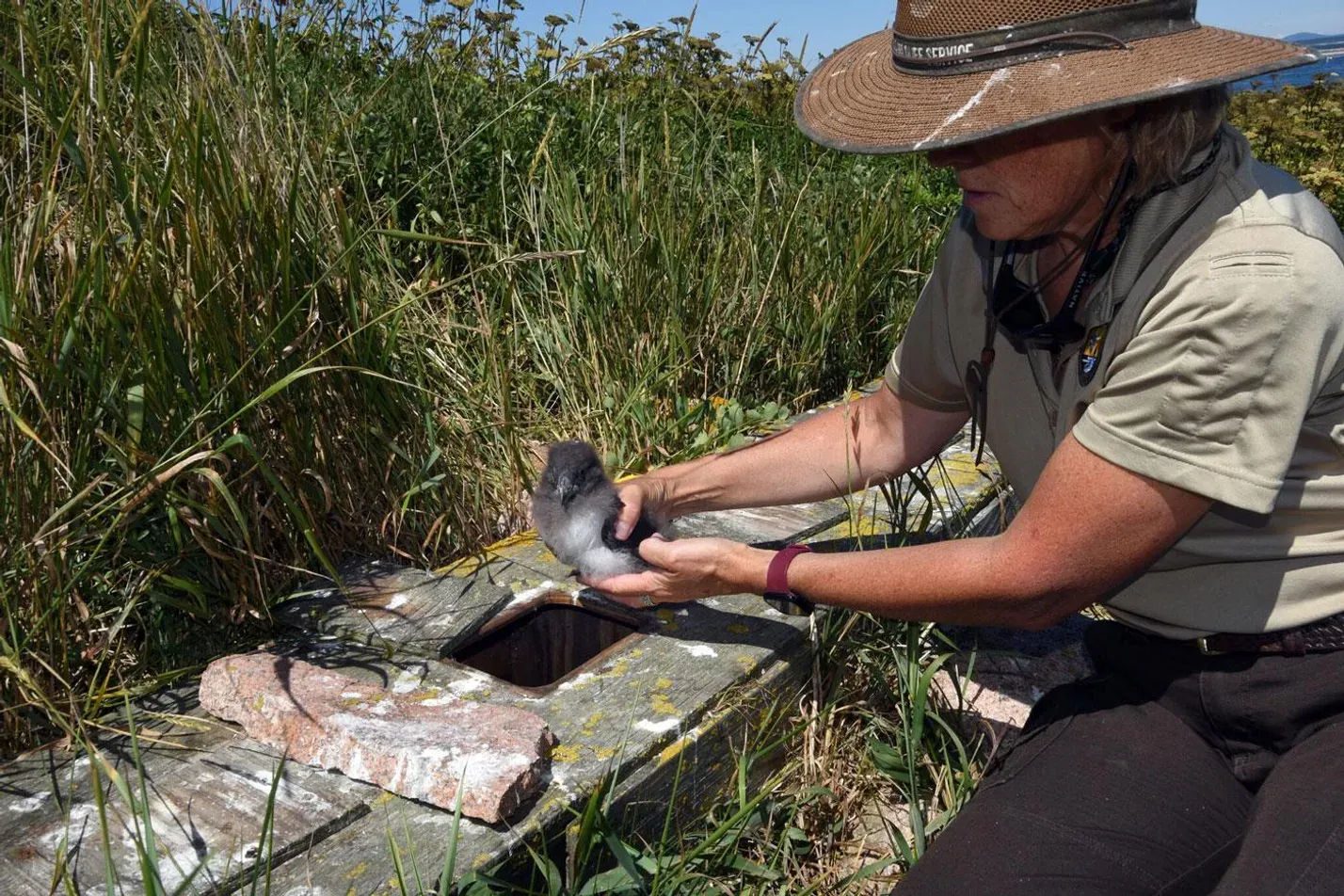
Indonesia has pledged to increase its marine protected areas by from 284,000 km2 to 325,000 km2 by 2030. The country is home to some of the most diverse marine life on the planet, especially its corals and reef fish. By 2045, the government plans to triple coverage to 975,000 km2. Mongabay
362,000 hectares of national park and freehold land in Queensland’s Cape York have been returned to its traditional owners, heralding a “new era” for the peninsula. Over the past 27 years the Queensland government has handed back over 4.3 million hectares of land, an area the size of Switzerland. Guardian
Farmers and landowners across England are leading a ‘once in a generation’ landscape recovery scheme to revive biodiversity in 22 areas, while still producing food. Collectively, the project aims to restore nearly 700km of rivers across farmed and rural landscapes and revive 263 species including water vole, otter, pine marten, lapwing, great crested newt, European eel, and marsh fritillary. Guardian
The key is this is a collaboration with farmers. What I find really encouraging is farmers, landowners and environmental NGOs working together on solutions that work at a local landscape level so we can design something that’s fit for purpose and fit for the future.
Jake Fiennes, Conservation Director, Holkham Estate
In the past decade, Gabon has increased its elephant population by over a third to 95,000 animals. The success is attributed to tough penalties for poachers and smugglers and legislation to protect Gabon’s equatorial rainforest, which boasts the largest populations of gorillas and forest elephants in the world. Times

16 Indigenous communities in drought-stricken parts of Mexico have created over 579 water infrastructure projects, including absorption wells and water pans, to help manage and harvest water locally. Initiated by a handful of women in 2005, the projects are capturing enough water to regenerate soils for crops and boosting the return of wild fauna and flora. Mongabay
In 1986, the last remaining 22 Californian condors were captured from the wild in a drastic attempt to save them from rodenticide and environmental toxins. In this case, human intervention paid off. Thanks to the collaboration of government agencies, scientists, and indigenous tribes, 537 birds now soar over North America today, 334 of them in the wild. RTBC
New York’s waterways are the cleanest they’ve been in over a century and the animals are coming back. Significant numbers of humpback, fin and right whales have started appearing along with bottlenose dolphins, spinner and hammerhead sharks, seals, blue crabs, seahorses, and oysters which vanished decades ago. Economist
“A massive victory for the planet.” A South African court has banned Shell from searching for oil and gas reserves along the country’s Wild Coast. Conservation groups took the oil giant to court after the government renewed exploration rights in 2021. 6,000 km of coastline is now protected, which is good news for humpback whales that migrate to the waters each year to mate and rear calves. Euro News
Incredibly critical victory for people and the planet. The victory against #Shell during this climate emergency is a crucial one for the future of humanity. The court reaffirmed the importance of community consultation and consent and the connection to land and ocean pic.twitter.com/aclEHXpcTw
— pooven moodley (@POOVENMOODLEY) September 1, 2022
One of the hallmarks of the global clean energy revolution is the consistent inability of most journalists to predict its speed. Case in point: the polysilicon sector is now betting on annual sales of 940GW of solar by 2025. That's 5.8% of global electricity demand, every year, or the equivalent of the world’s entire fleet of 438 nuclear plants every 20 months. Bloomberg
It's not just that journalists underestimate clean energy, it's that they consistently overestimate coal too. Remember the US coal surge last year? It's already finished. And in China, coal consumption fell for 12 straight months between June 2021 and June 2022, before ticking up in July and August due to extreme weather. Guess what people hear about? Carbon Brief
California, the world’s fifth-largest economy, just passed its most aggressive ever climate change legislation. Lawmakers approved a record $54 billion in climate spending and passed sweeping new restrictions on oil and gas drilling as well as a mandate that California stop adding carbon dioxide to the atmosphere by 2045. NYT
California regulators have also officially put in place a plan to ban the sale of gasoline-powered cars by 2035. This is big. Not only is California the largest auto market in the United States, but more than a dozen other states typically follow its lead when setting standards. Officials in New York, Washington, Oregon and Rhode Island already say they're planning to implement similar regulations. CNN
In the aftermath of the Inflation Reduction Act, analysts are now predicting 'staggering' amounts of clean energy coming online in the United States. Wind, solar and batteries account for over 95% of capacity in interconnection queues, and check out the new forecasts for coal plant retirements too. Ouch. S&P
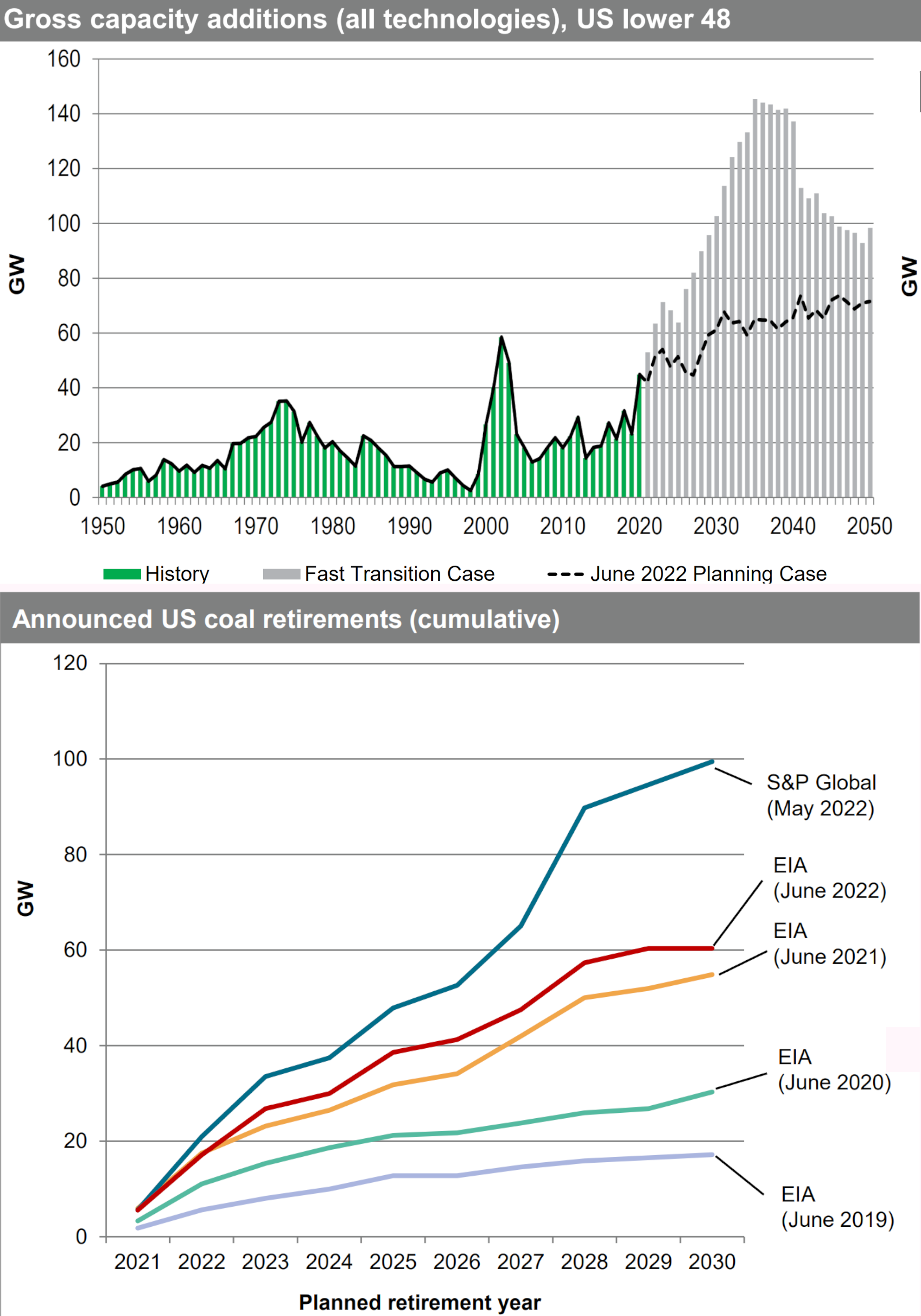
Global offshore wind is on a tear. Almost 7GW went into operation in the first half of this year, a close to five fold increase on last year. 33 offshore farms started operations, almost all of them in China, plus a few in Vietnam and Europe. China now has 24.9GW of installed capacity. Renew Biz
Europe's doing its best to catch up. Eight EU countries bordering the Baltic Sea have agreed to increase their offshore wind power generation capacity seven-fold by 2030 in order to reduce dependency on Russian energy. Chalk up another one for everyone's favourite climate hero in the Kremlin. Reuters
Solar installations in India rose by 59% in the first half of this year, to a record 7.2 GW, bringing the country's total installed capacity to 57 GW. "Even with mounting challenges from supply constraints and rising costs, India had its best quarter and first half ever for solar." Economic Times
Solar is now regularly outcompeting coal on the Australian grid in winter, and it's happening earlier every year. In the process, the country's coal fleet has been revealed as neither cheap nor reliable. Next big milestone should arrive in a few years, when wind and solar are producing 100% of grid demand at any one time. RE
Europe has smashed all its solar records this summer, generating a record 12% of electricity between May and August, up from 9% during the same period last year. Those solar panels saved the continent €29bn in fossil gas imports. The numbers are astonishing - since 2018, Poland has increased solar generation by a factor of 26, and Finland and Hungary have seen five-fold increases. Ember

Four more global insurance providers have ruled out support for the East African Crude Oil Pipeline, bringing the total number to 12. The pipeline poses a threat not just to climate goals, but to ecosystems in east Africa too. This move is significant, because it won't go ahead without substantial levels of international insurance. StopEACOP
France has become the first country in the world to ban fossil fuel advertising. Under new rules, supermarkets cannot run ads for cheap petrol, for instance, and ads for natural gas will be banned too. Activists say it doesn't go far enough - but we would argue that the symbolism is really what matters here, showing that fossil fuels are heading the same way as big tobacco. Euronews
Electric vehicle batteries are lasting far longer than predicted, meaning there's plenty of life after use as backup storage in big solar arrays. The big worry was that all the batteries would end up in landfill, but it now looks like the opposite problem is taking shape - there's more recycling capacity coming online than there is battery scrap available. Bloomberg
A total of $15 billion of investment into four US gigafactories has been announced in the last two months, enough to more than double the country's entire current production capacity. The announcements, from Panasonic, Honda and Toyota, will increase forecast US battery production capacity by 60% by 2025.
EV adoption in the US is happening for quicker than anyone predicted, with sales projections for 2030 more than doubling to 53%. Ford, for example, has seen a four-fold increase in EV sales, and cannot keep up with demand for its F-150 electric trucks, which are being sold, on average, eight days after hitting dealerships, the fastest for any current Ford vehicle.
Volkswagen, the only legacy carmaker in the top 12 for global EV sales, has a new CEO, Oliver Blume. Here's what he says about the company's electrification plans. "I am a fan of e-mobility and I stand by this path. We will keep the current pace and, where possible, increase it." Reuters
6th August 2022 - 20th August 2022
World population growth has fallen to 1%, its slowest rate since 1950. The main cause? A decline in fertility. The latest projections suggests a peak around 10.4 billion in the 2080s. That means we have 78 years to figure out how to provide 11 billion people with a good standard of sustainable living. The Week
The WHO says the global child mortality rate has dropped by 60% over the past three decades, with the number of annual under-5 deaths plummeting from 12.6 million in 1990 to five million in 2020. The leading causes of death are birth complications, pneumonia, diarrhoea, and malaria, all of which are now being treated with affordable interventions in health and sanitation.
Children are leading the fight against dengue in Rio de Janeiro by breeding mosquitoes infected with Wolbachia - a bacteria that blocks the transmission of dengue to humans. Cases have fallen by 95% since 2015. Similar efforts in Indonesia and Colombia have reduced cases by up to 89%, and programs are now being rolled out across Mexico, Sri Lanka, Vietnam, Fiji, Kiribati, New Caledonia, and Vanuatu.
Cervical cancer is the most common cancer affecting women in Rwanda. Thanks to rapidly expanding testing facilities, the deployment of tens of thousands of community health workers, and a successful HPV vaccination programme for 12 year old girls, officials believe it is on track to become the first country in the world to eliminate the disease. Guardian
Here's one of the least celebrated stories of human progress. Teenage pregnancies are declining across the world, with only a third of all women bearing children in adolescence compared to 50% sixty years ago. The decline is contributing to a positive change in girls' education, and infant and maternal mortality rates. ORF
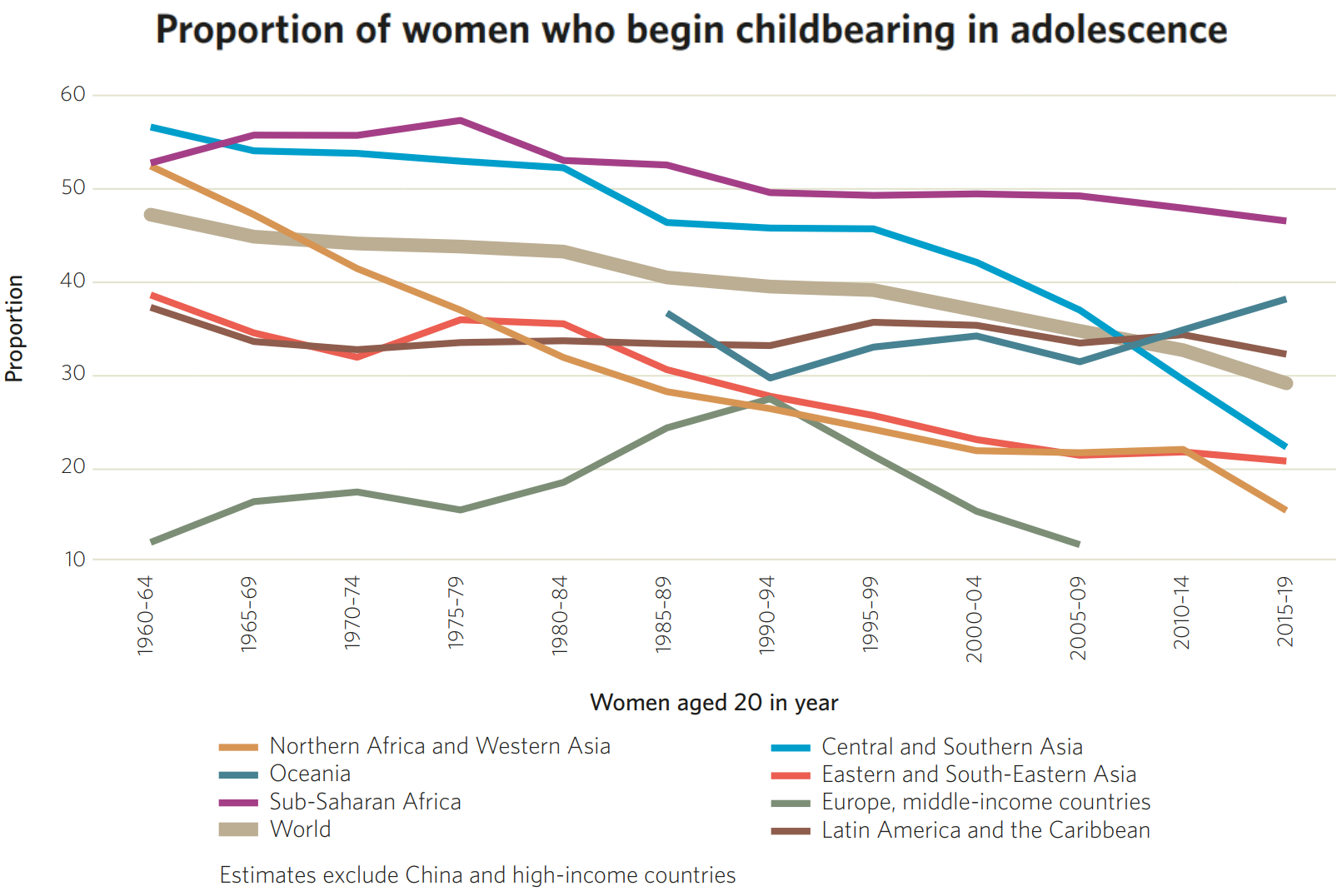
Healthy life expectancy (the number of years spent in a good state of health) increased in Africa by an average of ten years per person over the last two decades, from 46 years in 2000 to 56 years in 2019. Improved access to health services and progress in the fight against infectious diseases have played a big role. Relief Web
The sharp rise in healthy life expectancy during the past two decades is a testament to the region’s drive for improved health and it means that more people are living healthier, longer lives, with fewer threats of infectious diseases and with better access to care and disease prevention services.
Dr Matshidiso Moeti, WHO Regional Director for Africa
Global leaders and African heads of state have managed to rally over $4 billion of funding towards the global effort to end malaria and neglected tropical diseases. It's welcome news after years of warnings about a slowdown in funding. Relief Web
Zambia has become the latest country to commit to abolishing the death penalty. While a moratorium has been in place since 1997, this is the first time the measure has been approved by its legislature. It joins a growing list of African nations to have abolished the practice - Guinea in 2016, followed by Chad in 2020, Sierra Leone in 2021, and the Central African Republic earlier this year. UN
A non-profit group, RIP Medical Debts, has relieved 3.6 million low-income patients in the United States of their healthcare debts. The initiative, developed by two former debt collectors, involves the company buying bundles of delinquent hospital bills but instead of profiting from customers, clearing their debt. NPR
Scotland has become the first country to offer tampons and pads for free nationally. Thanks to legislation approved in 2020, free menstrual products will be available in pharmacies and community centres for anyone who needs them. New Zealand, Kenya and the states of New York, Virginia and Oregon currently distribute products for free in public schools. NPR
New legislation in Colorado will stop sales tax on all diapers and menstrual products, saving consumers around $9.1 million annually. Nationally, one in four American teenagers report missing school due to no access to period products and one in three American families can’t afford diapers. Gazette
An epic 18-day health campaign carried out in Somalia in May 2022 distributed preventative worm medicine to around 2.48 million school-aged children and adults. Officials say that country is on track to eliminate schistosomiasis and soil-transmitted helminth infections as public health problems by 2025. WHO

In the past seven years, India’s digital revolution has increased the number of people connected to the internet from 19% to 60% of its 1.3 billion population. The government launched Digital India in 2015 with a mission to make India a trillion-dollar digital economy by 2025. BBC
After a decade of efforts to reform the juvenile system in Hawaii, for the first time ever, there are no girls at the Hawaii Youth Correctional Facility in Kailua. Incarceration rates for girls dropped 42% from 2018 to 2022 due to significant reforms including the decriminalization of prostitution for minors and the addition of trauma-informed care. Hawaii News Now
It’s about how can systems collaborate and work together to position interventions earlier, and to make sure that we’re responding with healing and support instead of punishment.
Hannah Green, Vera Institute of Justice’s Initiative to End Girls’ Incarceration
A victory for LGBTQ+ rights, with Pennsylvania banning conversion therapy. Steady progress has been made across America with 20 states completely banning the practice and five others enforcing partial bans. LGBTQ+ youth who experience conversion therapy are more than twice as likely to attempt suicide than youth who don’t. NBC
Schoolchildren across California will be eligible for free breakfast and lunch when they return to class in September, regardless of their family’s immigration status or income level. It's the first state in the US to implement the program for any student requesting a meal. Several cities including New York, Boston, and Chicago, also have free meal initiatives in place. USA Today
Leuven, a city of 150,000 people in Belgium, has officially banned cars from its centre. Cycling is now the preferred mode of transit, with public transport coming in second and cars third. Similar trends are accelerating across the continent, and across the Channel too - cycling in London is up by 25% from pre-pandemic levels.

Although it’s attracted little attention, the bipartisan CHIPS Act, signed into law just a few days before the IRA, contains an estimated $67 billion for clean energy R&D and climate resilience. On its own, that makes it one of the largest climate bills ever passed by Congress. Vibe shift anyone? Atlantic
Since we are all apparently incapable of feeling good about things, you've probably heard that Joe Manchin shoved in some clauses about oil and gas leases. Thing is, they negate less than 2% of the bill's carbon effectiveness, and even if the government does auction those leases, it doesn't look like the fossil fuel companies want to buy them. Grist
Thanks to a lawsuit brought by environmental activists, a US federal judge has revived a nationwide Obama-era ban on new coal leases that was tossed during the Trump administration, saying a thorough environmental assessment is needed before the moratorium can be lifted. Reuters
Under new regulations, China's steel industry will be required to reach peak CO2 emissions by 2025. Difficult to understate the importance of this (and baffling it hasn't been picked up by global news organizations). China produces more than half of the world's steel, and over 60% of the industry's global carbon emissions. Yicai Global
India has officially updated its climate change pledges. In 2015 it committed to 40% of electricity from non-fossil sources by 2030, and to reducing emissions intensity by 35% compared to 2005. Those targets have now been increased to 50% clean electricity and a 45% reduction in emissions intensity by 2030. Reuters
The Phillipines has confirmed that the moratorium on new coal power plants announced in October 2020 by the Duterte administration will remain in place under the new Marcos administration. Apparently insurers do not want to support new coal projects, and investors are “finding it difficult.” Indeed. Manila Bulletin
Transmission, transmission, transmission. The three sexiest words in energy. State Grid Corp. of China, the world's largest utility, just announced $22 billion in funding for new power lines for clean energy, and MISO, the operator of the US Midwest's electrical grid, has approved a $10.3 billion upgrade across nine states.
Massachusetts has a major new climate law boosting offshore wind and solar, and - in a first for the state - allowing cities and towns to ban fossil fuels in new buildings and renovations. “It really bolsters the offshore wind industry. It sends a signal to the world that Massachusetts will be a significant player in the space.” Boston Globe
The world's biggest battery maker, CATL, is investing $7.6 billion into building a factory in Hungary. It's the single largest investment in Hungary's history. As we've said many times: if you thought the digital revolution was a big deal, wait until the clean energy revolution gets going. Bloomberg

Conservation goals in Cuba! Almost 19% of the country’s wilderness is now officially protected. The country had a huge boom in the number of protected areas in 2021 with the addition of 26 new sites, bringing the national tally to 144. Cuba News
A landmark legal battle has saved Tasmania’s Tarkine rainforest from the construction of a dam to store toxic mining waste. Forest defenders fought against the proposal, blocking the road to the site for 550 days - and for good reason. The forest is crucial habitat for 60 rare and endangered species including the Tasmanian devil and the masked owl. Euro News
Ten years after an ambitious pest eradication project Macquarie Island, off the coast of Tasmania, has become a shining beacon of grand-scale environmental recovery. Once on the brink of collapse, the island has sprung back to life with giant tussock grass, mega herbs, and orchards and the return of birds like blue and grey petrelsand Antarctic prions. Guardian
A landmark conservation agreement between Indigenous communities, NGOs, and governments in Pastaza, Ecuador, will protect the country’s largest and most biodiverse forest from mining. The agreement recognises the integral role Indigenous communities play in the fight against climate change Pastaza’s forests capture a whopping 858 million tonnes of carbon annually. Euro News
The Gitxsan Nation of northwest British Columbia has just declared the entirety of its 1,700 square km2 territory in the upper Skeena River watershed as protected. It's vital habitat for the likes of mountain goats, wolverines, grizzlies and wild salmon."What Gwininitxw did was based on laws that are way older than Canada.” Narwhal
Pakistan has increased mangrove coverage in the past three decades from 476 km2 in 1990 to an impressive 1,463 km2 in 2020. What began as a series of small,
piecemeal efforts has grown into one of the most ambitious reforestation campaigns in the world. The success is credited to a scientific approach, government commitment, and strong support from local communities. RTBC
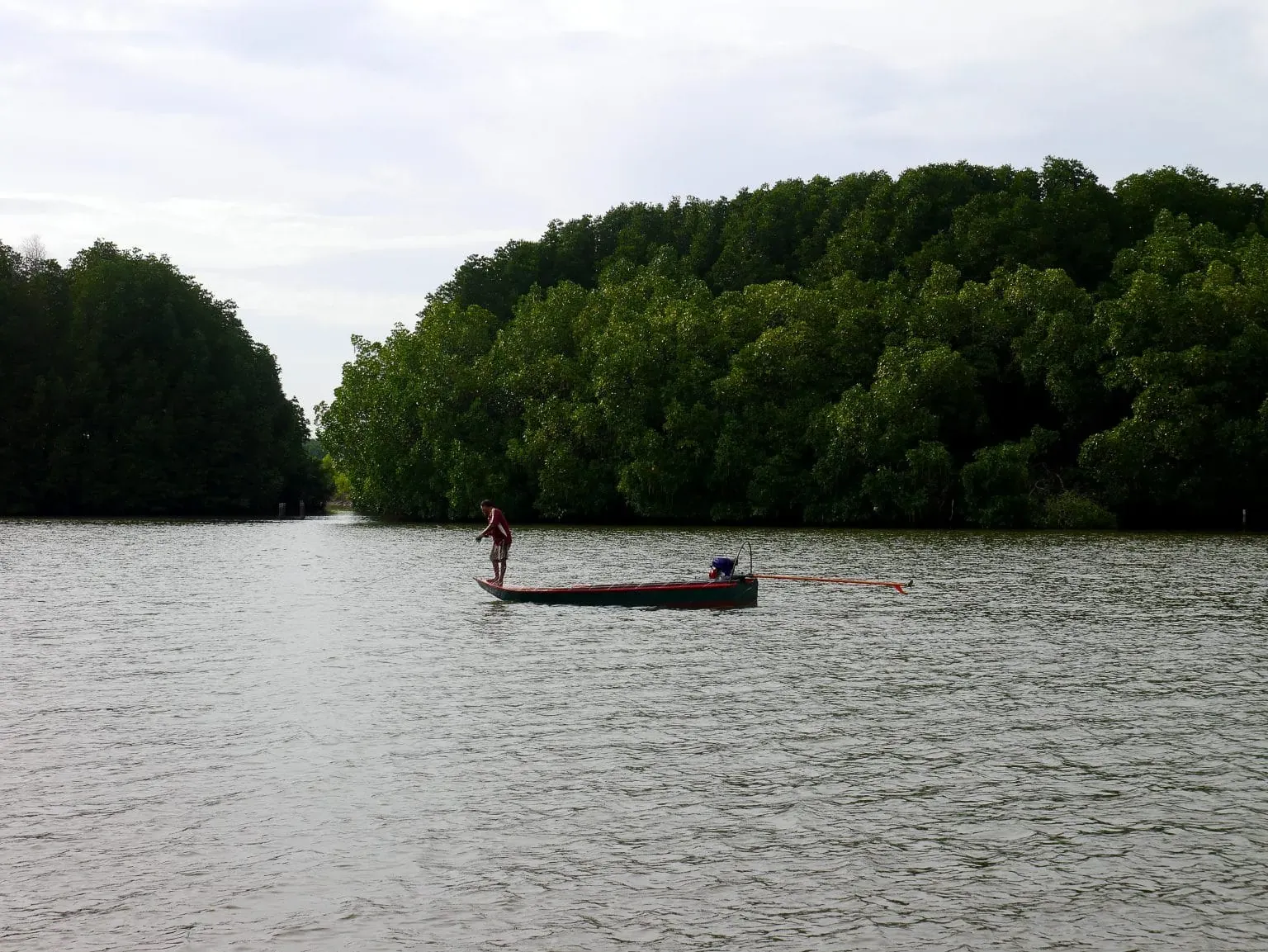
Conservation efforts in Scotland are turning the tide on land ownership, with a group of villagers in Langholm fundraising enough to buy 2,100 hectares to add to an existing nature reserve the same size they purchased last year. The grassroots effort aims to restore local wildlife and peatland while creating a flourishing nature-based economy. Euro News
Australia is phasing out battery eggs, after a lengthy battle between the egg industry and animal welfare groups. The reforms, announced yesterday, state that egg producers must phase out the use of conventional layer hen cages over the next 10 to 15 years, and by 2036 at the latest, depending on the age of their current infrastructure. Guardian
Single-use plastic bag use in England has fallen by 20% after an increase in price from 5p to 10p last year. The average person now buys around three single-use carrier bags a year compared with 140 bags in 2014. Since charges were first introduced in 2015, total usage in England has decreased by 97%. BBC
The population of saiga antelope in Kazakhstan has rebounded 10-fold after a fatal disease killed half the population seven years ago. 1.3 million saiga now roam the grasslands, a huge leap from the 130,000 left in 2015. The huge success is thanks to government protection of nearly 5 million ha to support wildlife rehabilitation. New Scientist
Georgia's endangered loggerhead sea turtles are multiplying in record numbers, with conservationists counting 3,966 nests this year, a new record. Biologists and volunteers have worked since the 1990s to boost the population, which has increased by 4% every year. CNN
The number of wolf packs in the Alps has jumped more than 25% in just one year, from 250 in 2021 to over 300. Wolves were nearly eradicated in Europe in the 19th and 20th centuries and activists have worked for decades to revive populations. "The wolf is here to stay." DW
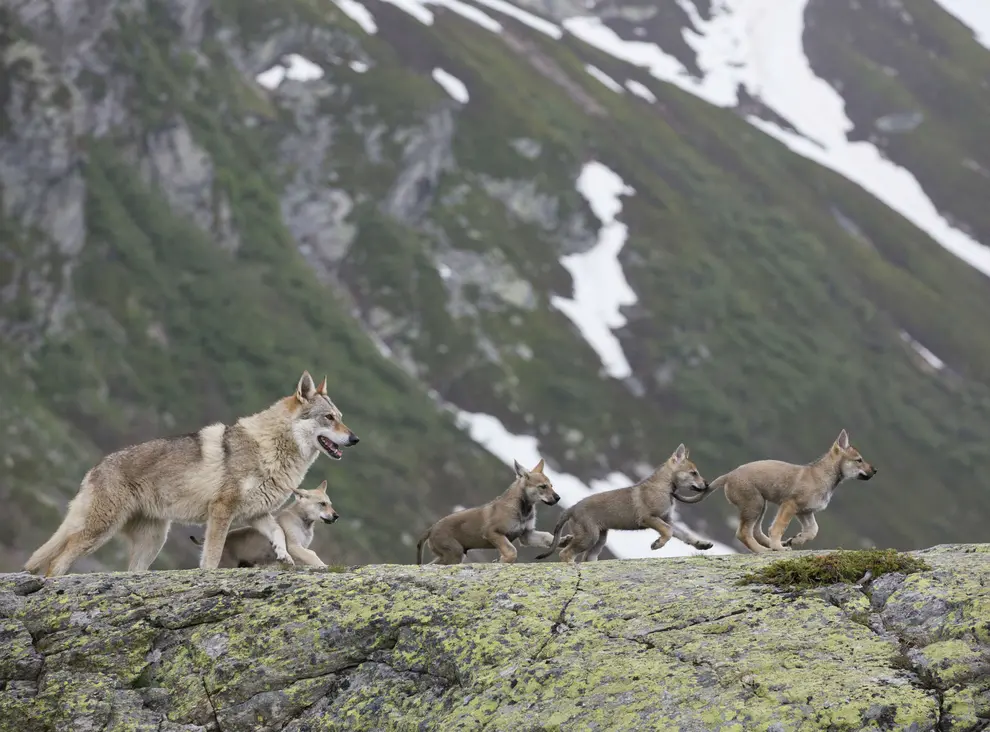
25th July 2022 - 5th August 2022
Humanity is making steady progress towards eliminating mother-to-child transmission of hepatitis B. By 2020, 190 of 194 WHO member states had introduced a universal infant HepB vaccination, compared with 186 in 2016, and 110 states now provide a birth dose to all newborns, a 10% increase from 100 in 2016. WHO
South Nigeria has successfully eliminated maternal and neonatal tetanus. thanks to increased vaccination rates and skilled birth attendees. It's usually caused by unclean abortion or delivery and infections during the first 28 days of life. South-East and South-West Nigeria achieved elimination in 2017 and 2019, respectively. WHO
Ghana, Kenya, and Malawi will expand their rollout of a malaria vaccine for children, thanks to newly announced funding of nearly US$160 million. The three countries were part of a pilot in 2019 that saw 1.3 million children protected, resulting in a substantial drop in hospitalization and child deaths. WHO
A landmark ruling in India has expanded the scope of the country's abortion laws to allow single women to end a 24 week pregnancy if they are a minor, or survivors of sexual violence. India currently allows abortion for all women until 20 weeks of pregnancy. Independent
Secondary school dropout rates among 11-14 year old girls in India have declined to their lowest level ever, from 18.4% in 2017 to 13.7% in 2021. That means almost two million more girls staying in school each year, thanks to a government scheme offering free uniforms and textbooks, sanitary pads and self-defence training. The Print
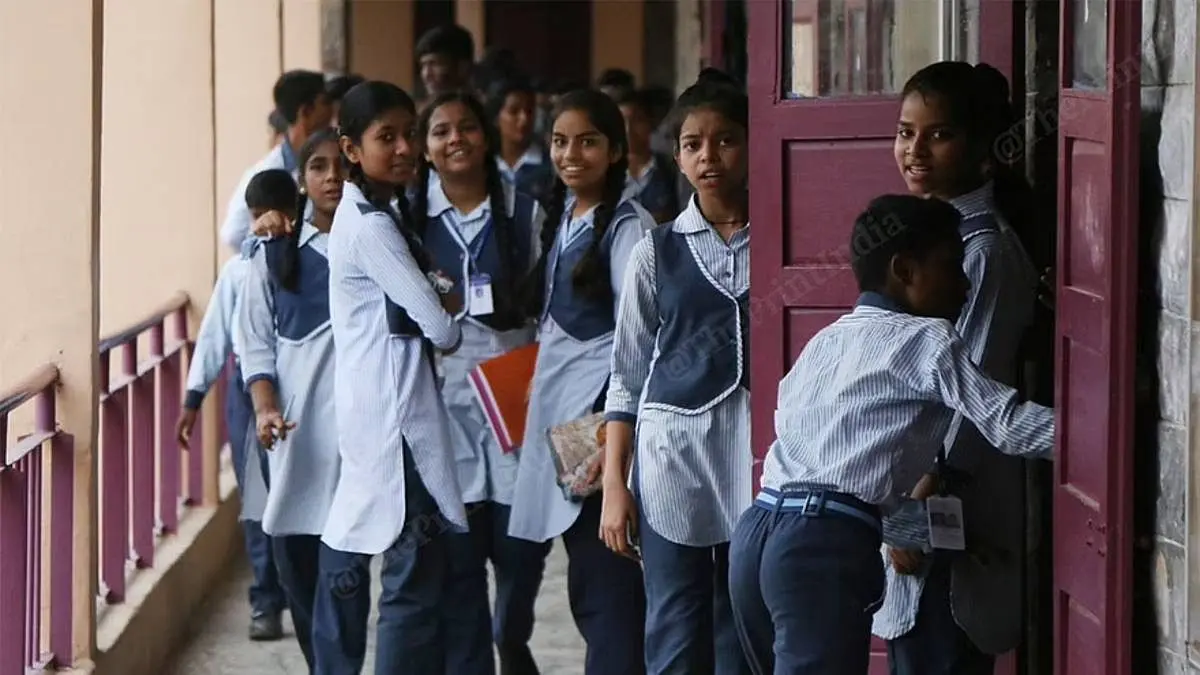
Despite COVID disruptions, Chad has increased its vaccination coverage, with the number of children receiving vaccines against diphtheria, tetanus, and pertussis increasing from 50% in 2019 to 58% in 2021. It’s an incredible feat, considering in 2017 Chad had one of the lowest levels of vaccination in the region. Gavi
Cambodia’s poverty rate has plummeted over the past two decades from nearly 40% in 2009 to 17.8% in 2020, driven by rising wages and earnings. The country’s COVID-19 cash transfer programme also helped, assisting 2.8 million people from poor and vulnerable households. Vietnam Plus
Andorra has approved a new family code that eliminates legal differences between married heterosexual couples and gay and lesbian couples in civil partnerships, and the Caribbean nations of Antigua and Barbuda have decriminalized gay sex, removing a colonial era law.
After decades of advocacy, a big victory for LGBTQ+ rights in Michigan. The state has amended its civil rights legislation to ban discrimination in housing, employment, education, and public accommodation against people because of their sexual orientation.
OK you probably did hear about this one. A huge win for womens rights in Kansas with the state voting to protect abortion in this week’s referendum. Kansas is the first state to put abortion rights to a vote since the overturning of Roe vs. Wade and will now remain a safe haven for abortion in the Midwest. Guardian

British Columbia has become the first Canadian province to end immigration detention in jails. Over the past five years, hundreds of immigrants have been incarcerated in BC with no legal limit on duration. The victory is thanks to the human rights campaign #WelcomeToCanada that launched last October. HRW
Today’s decision is a momentous step. This is a true human rights victory, one which upholds the dignity and rights of people who come to Canada in search of safety or a better life.
Ketty Nivyabandi, Secretary General of Amnesty International Canada
The number of Americans living without health insurance has hit a record low of 8%. Since 2020, 5.2 million more people have received coverage, with the biggest uptake by people below the federal poverty line. The welcome news is thanks to extra federal funding during the pandemic and efforts to expand the Affordable Healthcare act. Fierce Healthcare
After a decade of debate, Brazil’s Drink-Driving Law is fully constitutional, and all drivers must now have a blood-alcohol content of zero. Alcohol has been attributed to nearly 10% of all road deaths, which are the leading killer of children aged 5 and 14. This legislation will make a big difference. WHO
Numerous European countries are experimenting with free public transport. Spain, Germany, Estonia, and Luxembourg are already on the bandwagon while Ireland, Italy and Austria have reduced fares or introduced vouchers for lower-income workers. It’s an interesting idea - one day public transport could be a basic human right. Wired
The difference between crime rates in New York and its residents' perception of them has never been wider. Widespread anxiety obscures the fact that crime is actually at decades-long lows. The reason for the mismatch? Views on crime are influenced more by what people see in the news than by hard numbers. Bloomberg

A milestone five decades in the making, the UN General Assembly has declared access to a clean, healthy, and sustainable environment to be a universal human right. This is a profound shift in the way we see ourselves, and a crucial part of the moral framework we need if our species is going to succesfully make it out of our industrial phase.
From a foothold in the 1972 Stockholm Declaration, the right has been integrated into constitutions, national laws and regional agreements. Today’s decision elevates the right to where it belongs: universal recognition.
Inger Andersen, United Nations Environment Chief
A new electricity law in Bosnia has banned the construction of small hydroelectric power plants, saving the country’s 244 rivers from over 350 planned projects. The victory comes after a decade of court battles and protests by Balkan activists to protect Europe’s last wild rivers. ABC
Meat consumption has fallen by 12% in Germany in the last decade, from 63 kg per person in 2011, to 55 kg today. Understanding the causes behind Germany's newfound love for plant-based food could be critical in figuring out how to slow climate change - meat and dairy account for around 15% of global greenhouse gas emissions. Vox
Colombia has launched a $245-million initiative to support the creation, expansion, and improvement of 32 million hectares of protected areas in the next decade. The country contains around 10% of the world’s biodiversity and the project aims to create over 3 million hectares of new protected areas and biological corridors, and 15 million hectares of marine protected areas. Mongabay
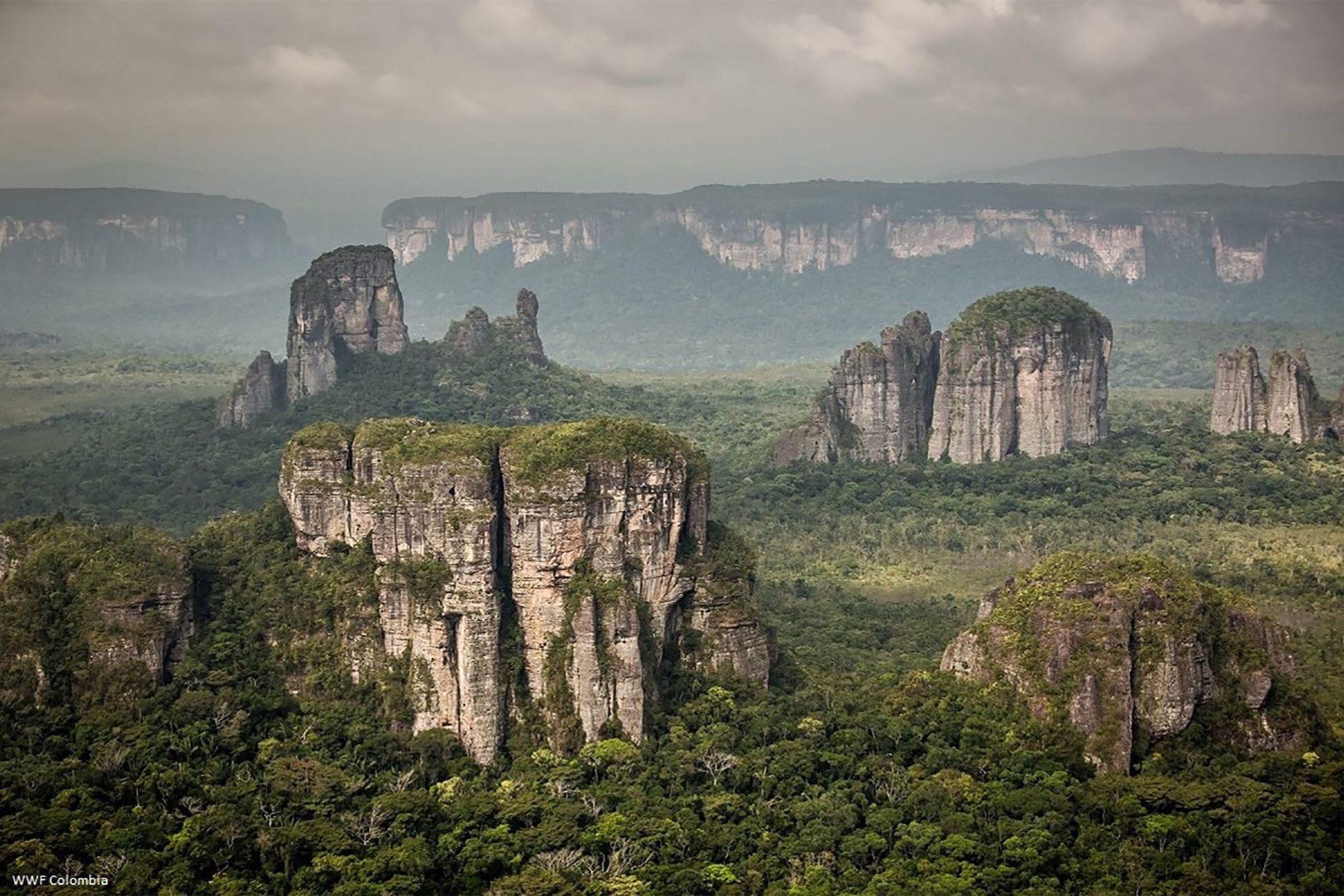
The US government will plant one billion trees over the next decade to revitalize millions of acres of burned and damaged forests across the American West. Wildfires have devastated woodlands in recent years creating a reforestation backlog of 4.1 million acres. Over the next few years planting will increase from 60,000 to 400,000 acres of trees each year. Smithsonian
Tigers are having a good year. Officials in Nepal just announced that numbers have more than doubled in a bit more than a decade, and last week, a wildlife group reported there are as many as 5,500 tigers prowling jungles and swamps across Asia, a 40% jump from its 2015 assessment. WaPo
Jaguars have been born in an Argentine wetland 70 years after they went extinct from the area, and in Brazil, the Spix's macaw has made its return to the wild, two decades after it was last seen in nature. These kind of reintroduction efforts aren't just symbolic - the other animals and plants that live in the associated conservation areas also benefit.
A conservation program in Cambodia is bringing gibbons back to the iconic Angkor Wat temple, decades after poachers destroyed populations. Since 2013, four different pairs of gibbons have returned to breed, along with 40 other species including silvered langurs, muntjac deers, smooth-coated otters, leopard cats, civets, wreathed hornbills, and green peafowl. Taipei Times
Iguanas are reproducing on Santiago, one of the Galapagos islands, more than a century after they disappeared. In 2019, 3,000 iguanas were reintroduced from a nearby island to restore the island’s ecosystem and they have been hard at work since: removing soil, dispersing seeds and even providing food for other animals. ABC
Bighorn sheep have returned to Nebraska’s high plains a century after they were wiped out by overhunting and disease. Scientists and conservationists started reintroducing bighorn in 1981 and the 40 year program has resulted in a flourishing population of 320 sheep today. Yale360
After 22 years of restoration, a 1,600 acre glen in southern Scotland called Carrifran has transformed a once overgrazed barren landscape into a thriving ecosystem with the return of foxes, badgers and otters and tree species that existed in the area thousands of years ago. Independent
Carrifran 1999 and today 27th July 2022.
— Rewild Scotland 🏴 (@RewildScotland) July 27, 2022
Landscape scale habitat restoration.#RewildScotland #RewildOurPlanet pic.twitter.com/1eENWGk6HJ
Farmers and scientists in Mexico City are working together to save 6,000 acres of Indigenous agricultural wetlands that are a source of local food production and home to the critically endangered axolotl. The waterways of Mexico are the only natural habitat of the axolotl, whose extraordinary regenerative abilities to grow new limbs could hold the biological secrets to renewing human tissue. Undark
Non-profit organisation The Ocean Cleanup has officially removed more than 100,000 kg of plastic from the Great Pacific Garbage Patch. The milestone is thanks to Jenny, a device that has swept over 3000 km2 of ocean, capturing plastic and funnelling it into a net. A 1,000 Jennys, and the Garbage Patch is gone.
Central California will halt new oil and gas leases across more than one million acres of public lands until the potential health and environmental risks are assessed. The moratorium comes after several years of legal challenges from environmental groups and local communities.
Central Valley residents and grassroots activists work every day to make their communities healthy, and today they got a win in the fight against air and groundwater pollution from oil and gas development.
Daniel Rossman, The Wilderness Society
Proving that religion and conservation can go hand in hand, India's temples are playing a critical role in protecting the country's fauna and flora, with an estimated 100,000-150,000 sacred groves across the country, preserving biodiversity and the habitats of endangered species. BBC

The big news in energy circles right now is obviously the possibility of a climate deal in the United States. We're holding off on the celebrations until it passes Congress, but if it does, we'll have to issue a mea culpa on our last edition. We're very, very hopeful, we just don't want to be disappointed again.
In the meantime, did you hear lawmakers in Germany just approved their own version of a Green New Deal? $180 billion to be spent between 2023 and 2026 to accelerate the shift to an economy that’s cleaner and less dependent on Russia for energy supplies. Bloomberg
Solar in Germany generated a new record in July 2022, accounting for roughly a fifth of the country’s electricity generation and also marking the third record month in a row. Only coal plants now generate more electricity, accounting for 21.9%. Total renewables share reached 50.6% in July. Clean Energy Wire
Global coal plant construction peaked in 2015 at 107 GW. By last year, it had dropped to 45 GW, and in the first six months of 2021 only 13.8 GW has been built. 11.4 GW has been retired during the same period, meaning the world has only added 2.4 GW of coal capacity this year. On current trends, humanity will start reducing total coal-fired capacity in 2023. Global Coal Plant Tracker
Spain's energy minister says Europe is close to a game-changing overhaul of its power market that separates the pricing of dirty energy and clean energy, Ireland has reached a deal with its farmers to cut agricultural emissions by 25% by 2030, and in Greece, solar energy is transforming the country's coal-laden 'Valley of Tears.'
Somewhere in the North Sea, the world's first commercial installation of a wind turbine with recyclable blades has just been completed. The 81 metre long blades are made by Siemens, and will also be available in 108 metre and 115 metre versions.
We’ve brought the technology to market in only ten months: from launch in September 2021 to installation at RWE’s Kaskasi project in July 2022.
Marc Becker, CEO, Siemens Gamesa Offshore Business Unit

China built nearly 31 GW of new solar power capacity in the first half of this year, up 137% from a year earlier, with full-year installations on course to smash all previous records. The country's total solar power capacity is now 340 GW, up by a quarter compared to last year. Reuters
Big news on industrial emissions in China. Companies in seven key sectors with annual revenues over $2.9 million have been ordered to reduce energy consumption by 13.5% by 2025 compared to 2020 levels. This kind of thing wasn't supposed to happen for at least another decade - until very recently industrial emissions were considered 'the hard stuff'. SCMP
It gets better. China’s new emissions trading system is already the world’s largest carbon market, three times bigger than Europe's. It's about to grow another 70% under plans to add heavy industry, making it the single largest global climate policy, covering more emissions than the rest of the world's carbon markets put together. Forbes
Wouldn't it be great if India did something like that as well?! Oh, would you look at that. It appears an announcement is imminent on an ETS for major emitters in the country's energy, steel and cement industries. That would mean carbon markets in three out of four of the world's four largest carbon culprits. Bloomberg
In case you missed it, green hydrogen now costs less than fossil gas in eight European countries. You have to hand it to Putin - his determination to speed up humanity's decarbonization efforts knows no bounds. WSJ

German steel producer Salzgitter has committed $723 million to the first stage of decarbonizing its business — representing 1% of Germany’s carbon emissions — by 2033. It's the largest investment in green steel to date (larger investments have been announced by rival steelmakers LKAB, SSAB and ArcelorMittal, but that funding has yet to be approved). Recharge
India's state-run energy transition company is planning a $10 billion tender for 50,000 electric buses to help the world's third largest emitter decarbonize public transport. Its managing director, Mahua Acharya, says the country could electrify all its two-wheelers and public buses within the next seven years. Bloomberg
Porsche says that its electric cars will be as profitable as its conventional cars within two years. Automakers have long lamented the thin profit margins on EVs, which have always been more expensive to make and held less appeal to customers. Now though, with manufacturing facilities scaling up and consumer interest on the rise, things are starting to change. Yale360
In Norway, new car registrations are now 89.9% fully electric and 11.2% hybrid (and plugin vehicles are covering more ground than ICE counterparts). In the Netherlands, plugins now account for 34% of all new car sales, and Volvo says plugins accounted for 31% of sales in 2Q 2022, up from 24% last year.
China sold 565,000 new plugin vehicles in June this year - 28% of market share. Fully electric vehicles alone accounted for 22% of new auto sales. If electrification continues at this pace, sales of new cars in the largest automotive market in the world will be majority electric within the next three years. Clean Technica
Take a moment to let that one sink in.

2nd July 2022 - 24th July 2022
Global electricity access rose markedly between 2010 and 2020, from 83% to 91% of the world's population, with the number of unserved falling from 1.2 billion to 733 million during that period. The pace of growth was faster than in previous decades, although it did slow between 2018 and 2020, because of the difficulty in reaching unserved populations and the impact of COVID-19. UN
Botswana may become the first African country to eliminate mother-to-child HIV transmission after a ‘ground-breaking’ drop in rates from 40% in 1999 to 1% in 2021. It’s astonishing progress for the county that used to have the highest rate of HIV in the world and is thanks to an increase in testing rates and access to antiretroviral therapy. Guardian
When a newborn baby tests HIV negative, we’re very much part of this victory against the virus. We celebrate the news with the mother and are celebrated by the community for the role we do.
Dr Kaite Mashini, Central District’s Health Team, Botswana
After 45 years of public health efforts, Niger is on the verge of becoming the first country in Africa to end onchocerciasis, also known as river blindness. The fight against the disease gained momentum in the 1990s thanks to mass administration of the drug Mectizan. Gates Foundation
Indonesia is one of the most spectacular development successes of the last two decades. With 274 million people, it's the fourth largest country on Earth - yet between 2000 and 2021, reduced the share of people living below the national poverty line from 20% to 10% - lifting around 25 million out of poverty.
Despite the financial turbulence of the past year, The World Bank's Global Findex Database 2021 has offered some positive news on the growth of account ownership and uptake of financial services. Some highlights:
- Account ownership in developing economies increased from 63% to 71%.
- The gender gap in account ownership narrowed for the first time in the last decade, decreasing in developing countries by 3%.
- The pandemic accelerated digital adoption of financial services with around 720 million adults in developing economies making a digital merchant payment for the first time.
- Around half of adults in developing economies can now access emergency money within 30 days if faced with an unexpected expense.
A record 181 women (one third of all candidates) are running in Japan’s upper house election this weekend, a big step up from 77 in 2019. The increase is attributed to a commitment by parties ensure more gender equality after the country ranked 163rd out of 190 countries for women in politics. Guardian
A top court in Slovenia has ruled that imposing bans on same-sex couples getting married and adopting children is unconstitutional and has ordered its parliament to amend the law within six months. The ruling makes Slovenia the 18th European country and 31st country worldwide to legalize same-sex marriage. Gay Times
Sierra Leone is on the cusp of decriminalizing abortion after the government's unanimous backing of the 'risk-free motherhood' bill. The provisions of the bill also cover other aspects of maternal health, expanding access to contraceptives, post-abortion care and other reproductive health services. Guardian
At a time in the world when sexual and reproductive health rights for the women are either being overturned or threatened, we are proud that Sierra Leone can once again lead with progressive reform. I want it to be a norm that as an African man, an African leader, I can and should speak freely and publicly about menstruation, because there is no shame in menstruation.
President Julius Maada Bio
It's not just Sierra Leone. Abortion legislation across Africa is slowly becoming more progressive, with Tunisia, South Africa, Cape Verde, Mozambique, and Benin all legalising abortions. The city of Lagos, home to 15 million people, is also pioneering plans to offer them in public hospitals. DW
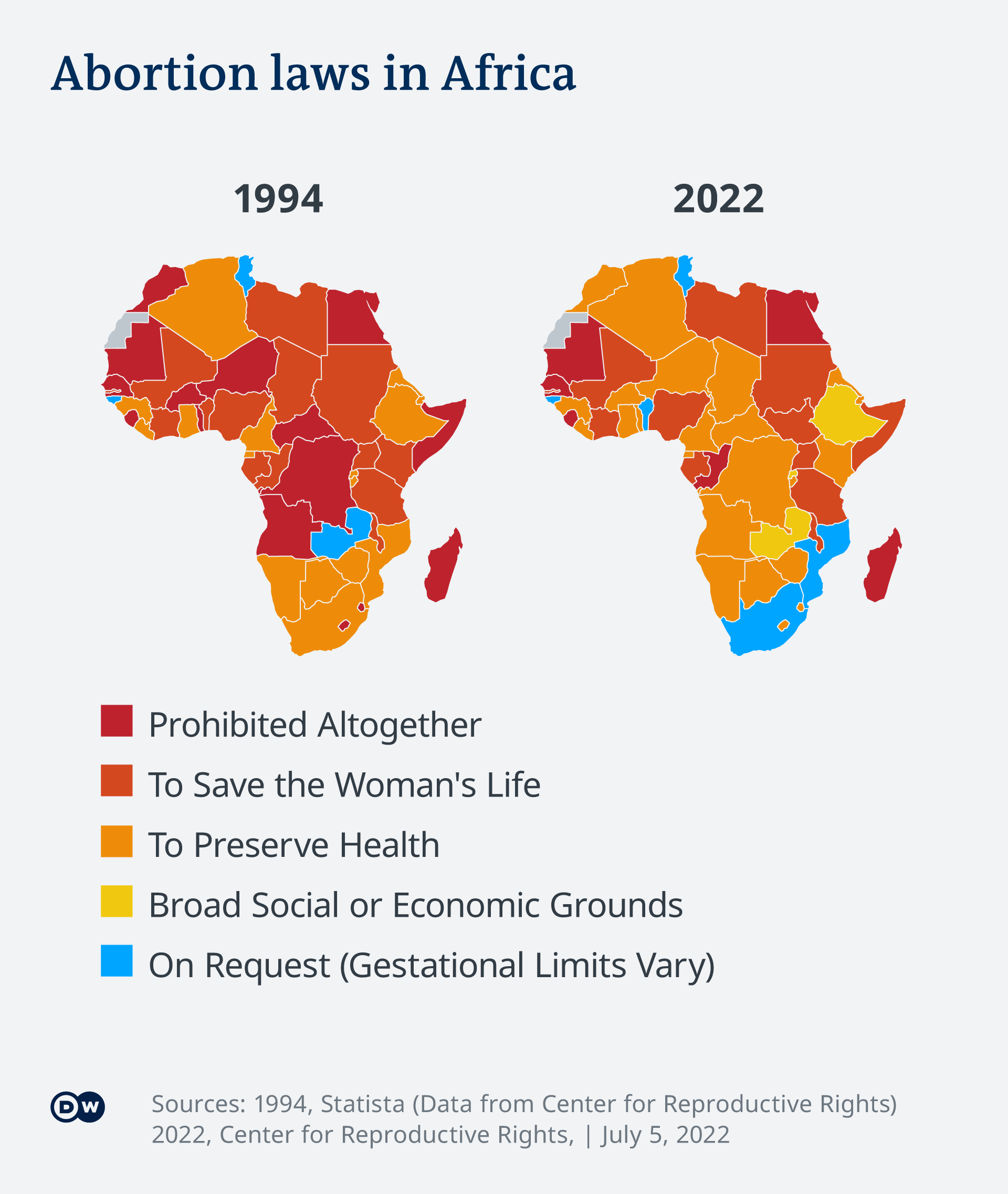
A landmark ruling in Kenya will see the Indigenous Ogiek people paid reparations for decades of illegal evictions from their ancestral land in the Mau Forest. It’s the first time a court has ruled in favour of both material and moral damages and the decision could set a precedent for other Indigenous peoples in East Africa. Grist
Argentina has approved a groundbreaking law to reduce discrimination against people living with HIV, viral hepatitis, TB and other sexually transmitted infections. The legislation prohibits mandatory testing for HIV and STIs by employers or educational institutions. Mirage News
Doctors in the UK say we could see a cure for haemophilia B happen with the next few years, after a successful trial of a 'transformational' therapy consisting of an engineered virus that corrects the genetic defect that leaves people's blood struggling to clot. 9 out of 10 patients who took part in the trial no longer needed clotting injections. BBC
California - the fifth largest economy on the planet - just announced it's going to manufacture its own insulin. This will make it significantly more affordable for millions of residents of the state, and push down prices nationwide. More than eight million Americans with diabetes depend on the drug. CNN
Pfizer is extending its donation of the antibiotic Zithromax for trachoma until 2030. The company’s 23-year commitment has played a crucial role in the prevention of the world's most common eye disease, with a 91% decrease in cases in the past decade. WHO
A simple, but important observation. On almost every single social issue, from womens rights to racial tolerance, minority rights, immigration, religion, gun ownership and abortion, Americans are more tolerant today than they have been at any point in their history. It's just that their governing and legal institutions have been captured by a fringe minority who are not. Globe & Mail
A new study has shown the global oil and gas industry has extracted $2.8 billion in profits from humanity every day for the last 50 years. That's an insane amount of money - you can buy every politician in the world with that. The recent collapse of Build Back Better in the US is just the latest example of how the industry continues to wield that kind of power.
So what comes next? Well, if this part of the newsletter has a consistent message, it's that when it comes to solving climate change, politics is overrated, and technology and economics are underrated. As Noah Smith points out, climate activists keep on insisting we can't rely on technology to save us, even as hard-working technologists continue to save us.
Case in point: the Supreme Court's ruling on the EPA's ability to regulate emissions has come too late for Joe Manchin and friends. S&P, a financial services firm, estimates 145 GW of coal capacity will retire in the US this decade, with coal’s share falling from the current 22% to 5% in 2030. Thanks technology. EE News
And despite supply chain challenges, the US energy transition continues to accelerate: renewables have generated at least 25% of electricity on 59 days this year – versus just three times in 2019. As of the 15th June, wind, solar and hydro have generated 23% of US electricity, topping both coal and nuclear. IEEFA
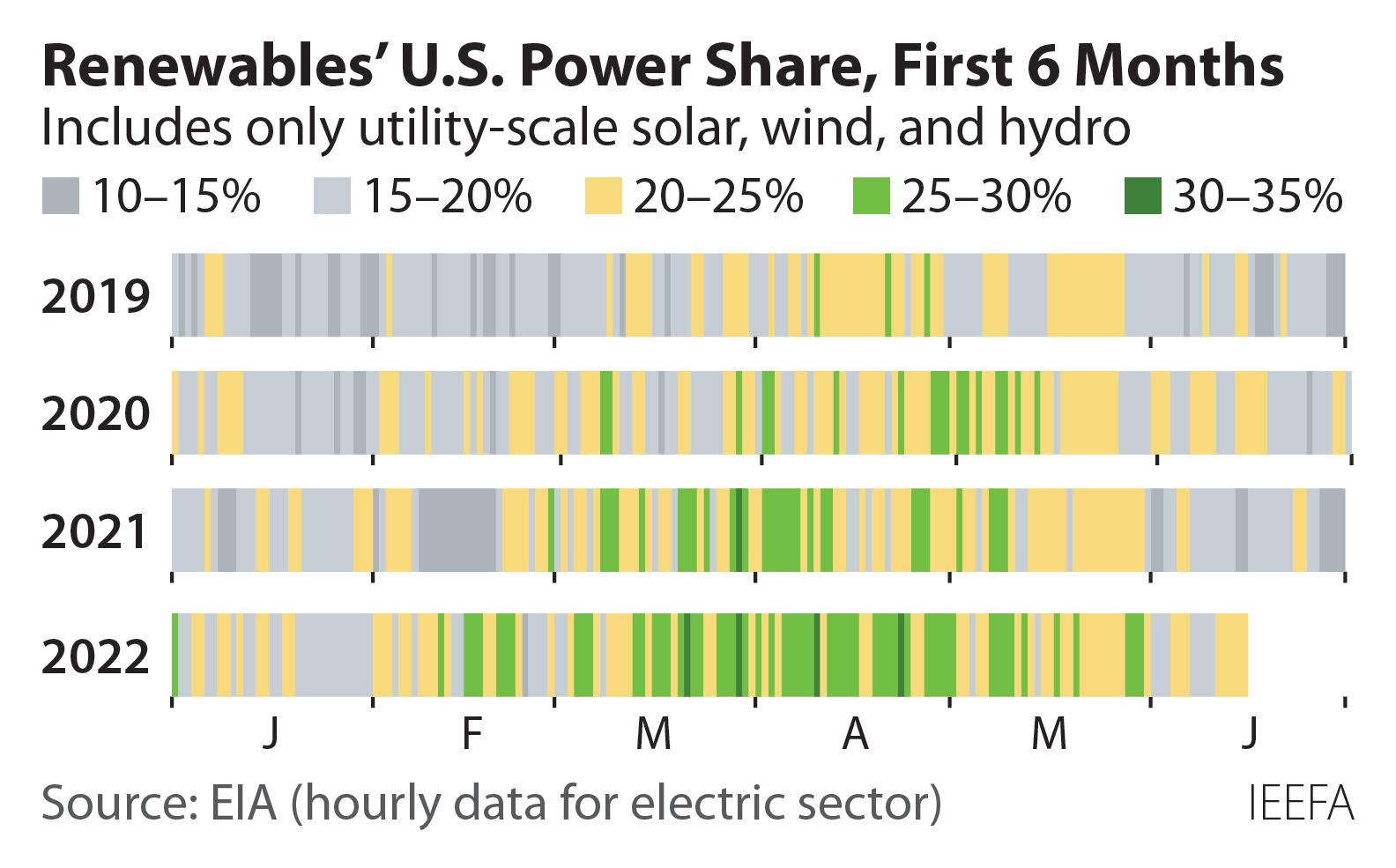
It's not just power generation. Bloomberg says EV sales have crossed the 5% tipping point in America, and is now predicting a quarter of all new cars will be electric by 2025, several years earlier than expected. Reminder: transportation is responsible for more emissions than electricity in the US.
And guess which states have had the highest EV growth since 2014?? California and New York aren't even in the top five. Leading the pack is Mississippi, followed by Hawaii, Utah, Maryland and Wyoming. Climate change might be partisan, but buying a better car is as American as apple pie. Deseret
That's why the car companies aren't waiting around for the politicians to get their act into gear. Ford just cut 8,000 jobs from its ICE operations to fund further investments into EVs, and says it's on track to hit annual EV production of 600,000 by 2023, and over two million by 2026. "We are putting the industrial system in place to scale quickly."
And finally, remember that America only accounts for around 13% of global emissions. The failure of Build Back Better has received endless coverage in English language media - unlike China's announcement of 570GW of wind and solar in its latest Five Year Plan. That's 10X Africa, 1X Asia (excluding China) 1X the EU, 1X North America and 2X South America... all by 2025. Carbon Brief
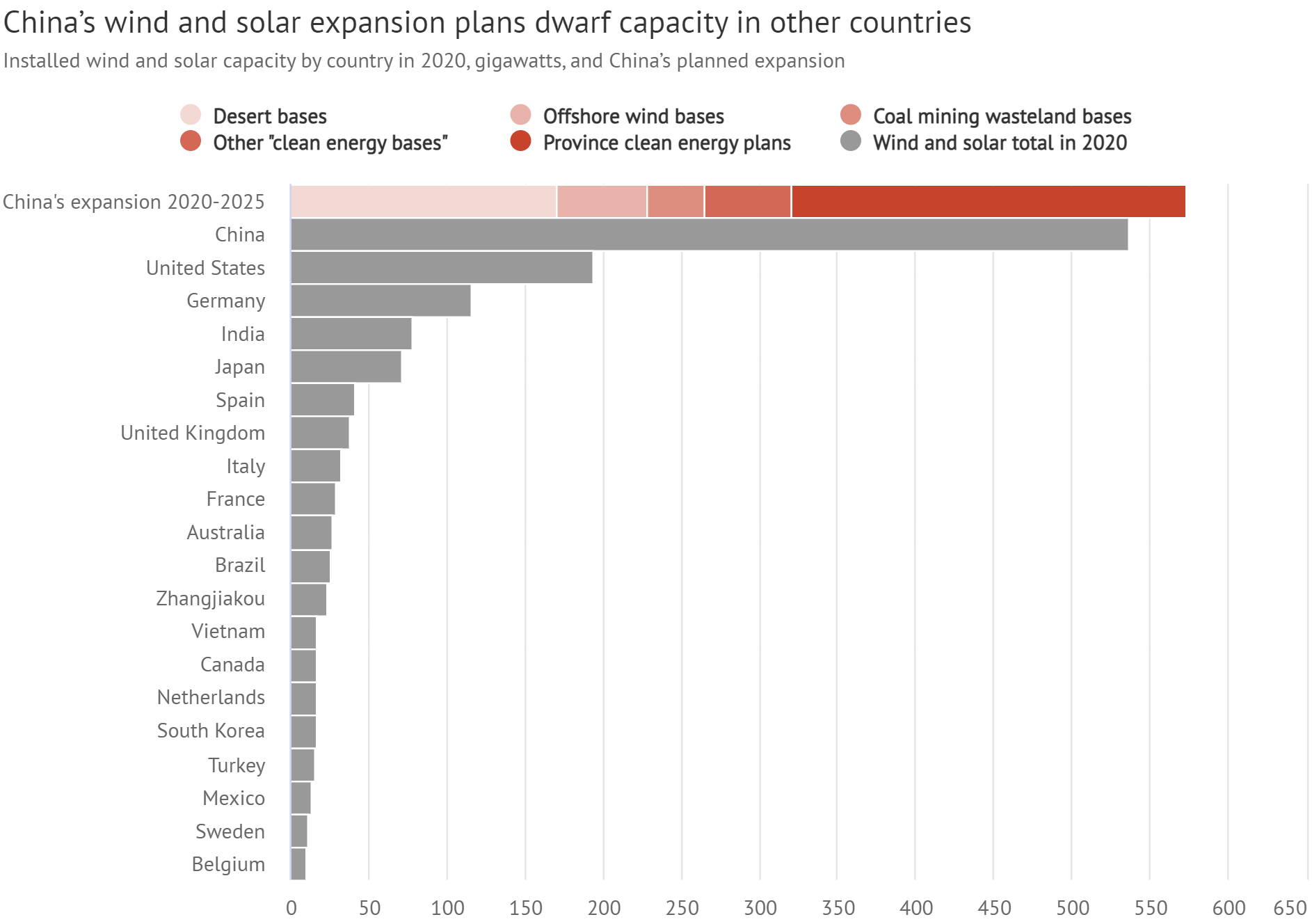
Did you hear about the £15 billion of new offshore wind farms announced at record-low power prices in the UK? Unless you're on Energy Twitter, then probably not. Here are some highlights:
- 11GW of renewables, in the government's biggest ever round of its flagship renewables auction scheme.
- 7GW of offshore wind, 2.2GW of solar, around 1GW of onshore wind, and for the first time ever, successful bids for tidal stream and floating offshore wind.
- A total of 93 projects across England, Scotland and Wales - more than in all three previous rounds combined.
- The newly awarded projects will generate around 42 TWh of electricity, roughly 13% of current UK demand, at prices four times below the current cost of gas.
- That's enough to power around 12 million British homes with clean, affordable, homegrown energy, helping to reduce exposure to volatile fossil fuel prices.
- All of it will be online by 2026/27 - around the same time as the Hinkley Point C nuclear reactor, which will generate electricity for two to three times the price. Carbon Brief
The IEA says high prices for natural gas and supply fears due to the war in Ukraine will slow growth in demand in the coming years. Global demand is now predicted to rise by 140 billion cubic meters between 2021 and 2025, less than half the increase of 370 bcm seen in the previous five-year period, which included the pandemic downturn. AP
In more 'Vladimir Putin, Climate Hero' news, the transformation of Europe's residential heating sector — the continent's largest source of gas consumption — is accelerating. More and more countries are introducing end dates. "Every gas boiler we get rid of is another step out of dependency on Russian gas," SP Global
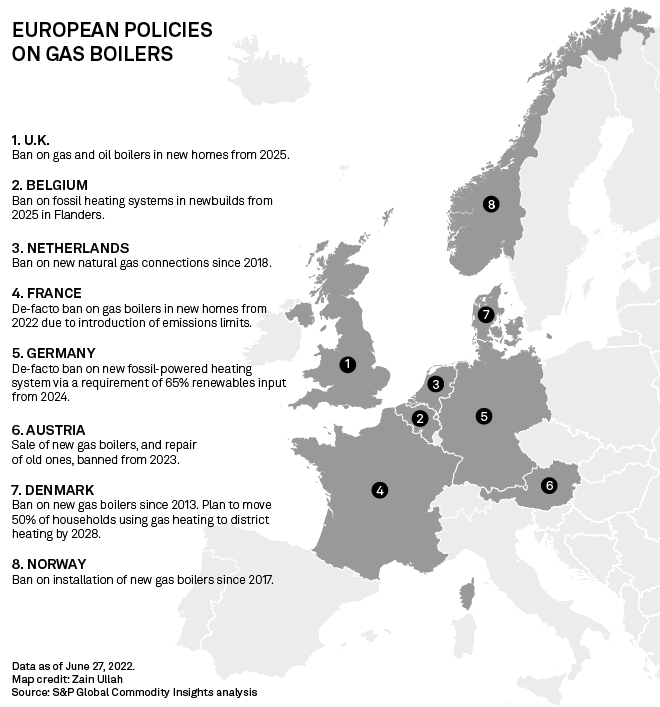
The Romanian government has published an emergency law to phase out coal by 2030, which is expected to be approved within a month. It accelerates the country’s original coal exit by two years, and clears the way for the country to exploit its enormous solar and wind energy potential. Beyond Coal
Only two countries in Africa are now building coal plants – Zimbabwe and South Africa – and the pipeline of new capacity is collapsing after China's pledge to end overseas support. Meanwhile, wind and solar are already the cheapest way to generate electricity across almost every part of the continent. IEA
The AFT is the second largest teacher's union in the US, with 1.7 million members, whose combined pensions are worth $5.8 trillion, as large as the federal budget. $255 billion used to be invested in fossil fuel corporations, until this week.
Two weeks ago, 35 faith institutions in Belgium, Brazil, Canada, Ireland, Italy, the UK and the US announced they were divesting from fossil fuels. That was quickly followed by the news that the 1.7 million United Presbyterians had voted to divest from the five big oil companies. Religion News
Colombia has become the first country in the western hemisphere to protect 30% of its ocean, with fishing and oil exploration banned in four protected marine areas. The country recently joined forces with the US, Mexico, Chile, Peru, Ecuador, Canada, Panama and Costa Rica to collaborate and work faster to protect ocean areas. Axios
In a landmark decision, the EU has banned the imports of crops using two bee-killing, neonicotinoid pesticides. The ban follows a report from the EFSA identifying 'high acute risk' to honeybees from certain neonicotinoid chemicals and the moratorium will commence before December this year. Eco Watch
Disruptions to food supply chains in Mexico City during the pandemic resulted in a revival of Aztec-era island farms known as 'chinampas.' The shallow lake farms produce beans, corn, squashes, and greens, and when lockdowns stopped produce flows to the city, customers reconnected with local chinamperos, rebooting a 1,300 year-old agricultural legacy. Nat Geo
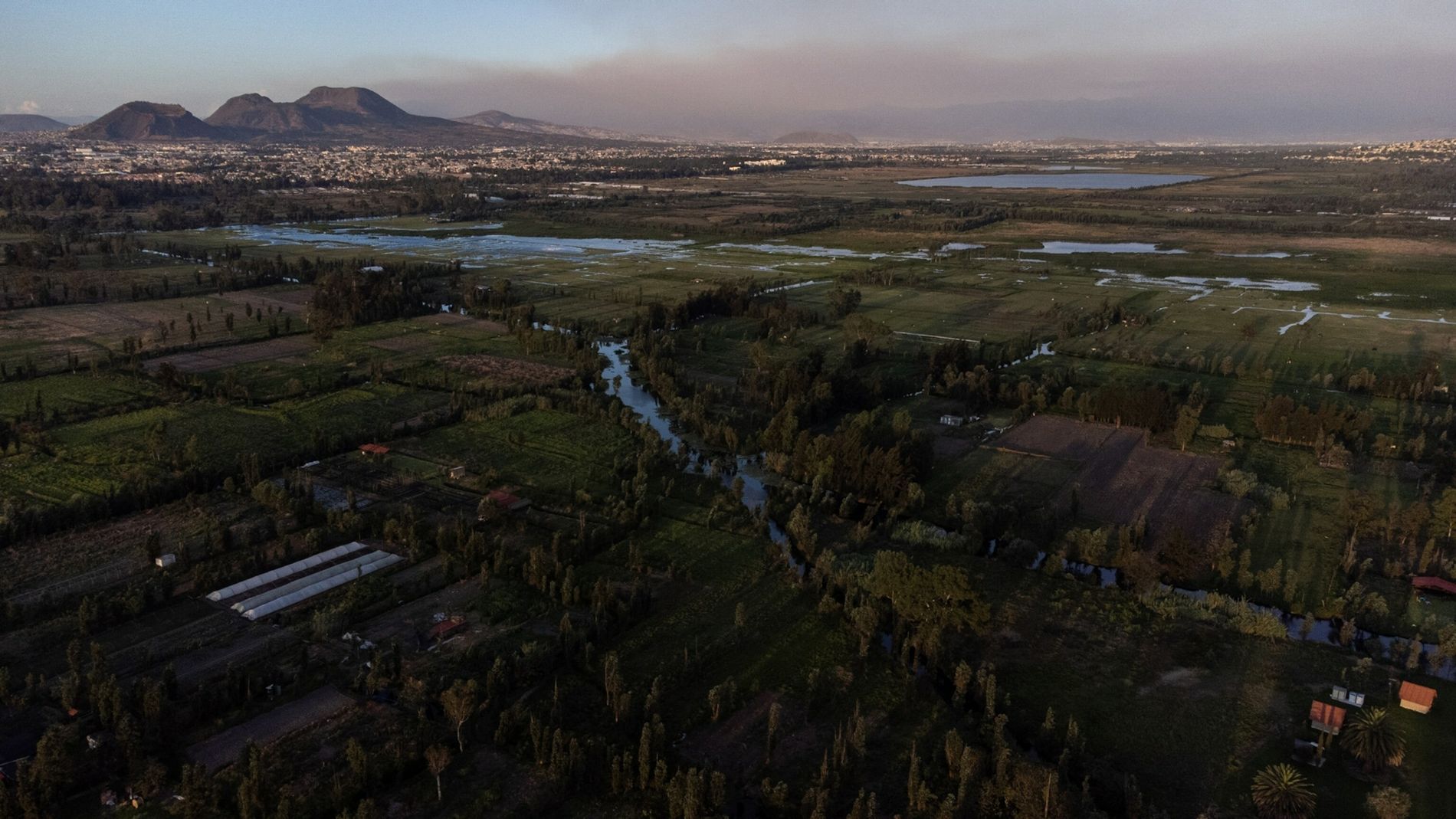
Indigenous peoples in Colombia’s Amazon are closer to self-governance after a court ordered the registration of 14 indigenous territorial entity (ITE) applications. The creation of the ITEs will allow communities to self-govern and ensure the protection of up to 10 million hectares of native forest. The first three ITEs are expected to be formalised by early 2023. Mongabay
The Amazon exists as it is because of Indigenous peoples, and their knowledge. They are not part of the solution just because they have forests. They are part of the solution because they know how the Amazon has to be governed, understood and managed.
Juan Carlos Preciado, Legal Counsel, Gaia Amazonas
A reforestation program in Burundi is restoring communities as well as nature with formerly warring factions working together to help boost the country’s forests. The initiative launched in 2018 after a brutal civil war, and in just four years has planted 150 million trees across 50,000 hectares. Mongabay
A federal judge in Northern California has restored a large number of protections for endangered and threatened species that were removed by the Trump administration. Environmental groups have applauded the move which will speed up protections and critical habitat designations for threatened species, including salmon in the Pacific Northwest. AP
38,052 acres of private timberlands in Montana have become part of the Lost Trail Conservation Area. The easement is a critical puzzle piece in the Lost Trail project, that will protect 100,000 acres of ecologically rich habitat, critical for grizzly bears and Canada lynx. Flat Head Beacon
Indigenous tribes across America have brought bison populations back from the brink of extinction over the last decade. Today 76 tribes across 20 states manage more than 20,000 bison - an incredible achievement considering the population sat below 1,000 in the early 1900s. It's also a victory for local ecosystems, with a flourishing of native grasses, animals, and insects wherever they roam. WaPo
As we look to the future, any assistance or effort that tribes are making to restore buffalo back to their lands is going to be beneficial for everybody, because it is a climate-smart, holistic idea of the relationship with nature.
Troy Heinert, Executive Director of the InterTribal Buffalo Council
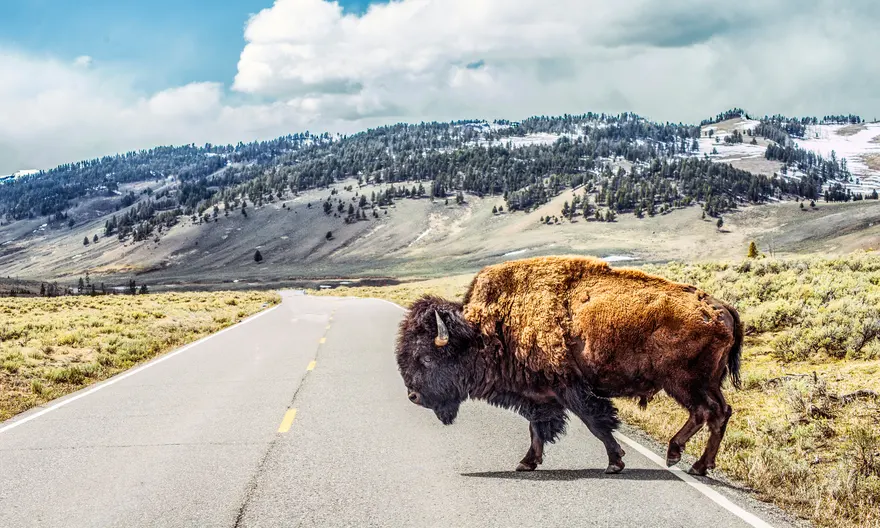
The population of Atlantic cod is showing signs of a comeback thanks to strict catch limits imposed in New England, where the fish was central to building the region’s economy. The 'class of ‘2019' includes at least a million young fish - with three or four more like it, cod could follow in the steps of haddock, a close relative, which recovered 15 years ago. The Public's Radio
Over the past ten years the Mikoko Pamoja project in Kenya has conserved over 100 hectares of mangroves and planted an additional 4,000 new mangroves along the coastline each year. The project has led to an increase in local livelihoods and inspired similar efforts in Mozambique Madagascar, Gambia, and Senegal. AP
ver the past 20 years global tree cover has increased by 130.9 million hectares - an area larger than Peru. 36 countries are now gaining more trees than they’re losing, including Ireland, Poland, Denmark, the Netherlands, Bangladesh, India, and Pakistan. WRI
An ecological revolution in Wellington, New Zealand is underway, as the return of native bird species, and close encounters with orca and whales fuel a volunteer conservation movement. The city is seeing an explosion in wildlife thanks to the presence of Zealandia, the world’s first fully fenced urban ecosanctuary located 10 minutes from downtown. Bloomberg
Louisiana has banned the ninth US state to ban the sale of any cosmetics tested on animals. It follows the lead of California, Nevada, Illinois, Virginia, Maryland, Maine, Hawaii, and New Jersey where similar bans are already in place. Humane Society
Over 200 kilometres of rivers and streams in northern New Mexico have the state’s highest water quality protections to safeguard waterways from anything that harms water quality, pollutes, drops heavy metals, increases temperature, or clouds water. Source NM
After a 200 year absence, the Mitchell’s hopping mouse has returned to Australia, with scientists hoping to bolster the population from 150 mice in a protected area that is cat and fox free. It’s part of a state-wide project to return the wild populations of more than 20 locally extinct species that suffered from habitat loss and feral animals. SMH
40 years after being declared locally extinct, rhinos are once again roaming the bush in Mozambique thanks to a translocation effort from South Africa. The black and white rhinos are being transported over 1,610 km to Zinave National Park, already home to more than 2,300 other reintroduced animals. Reuters
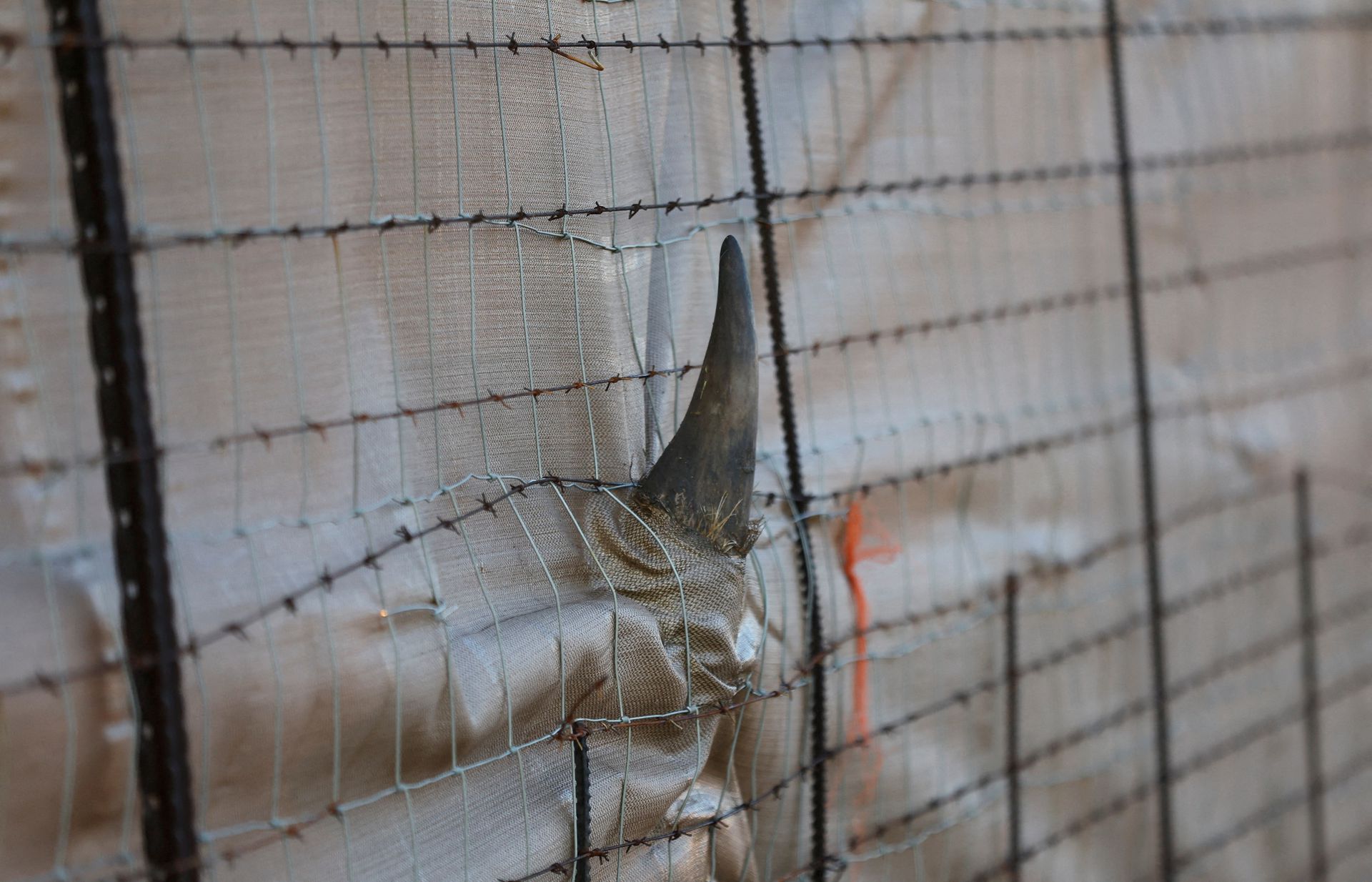

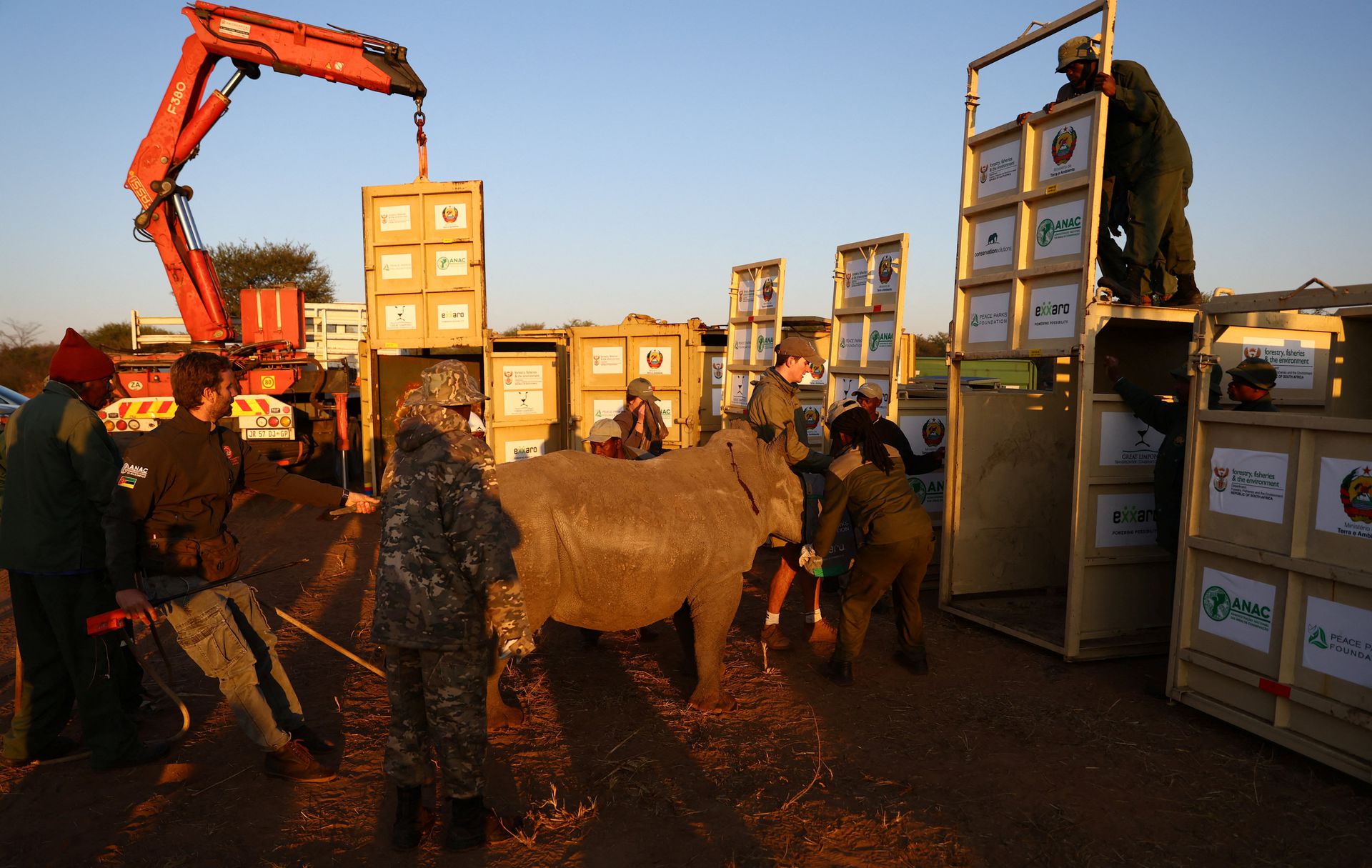
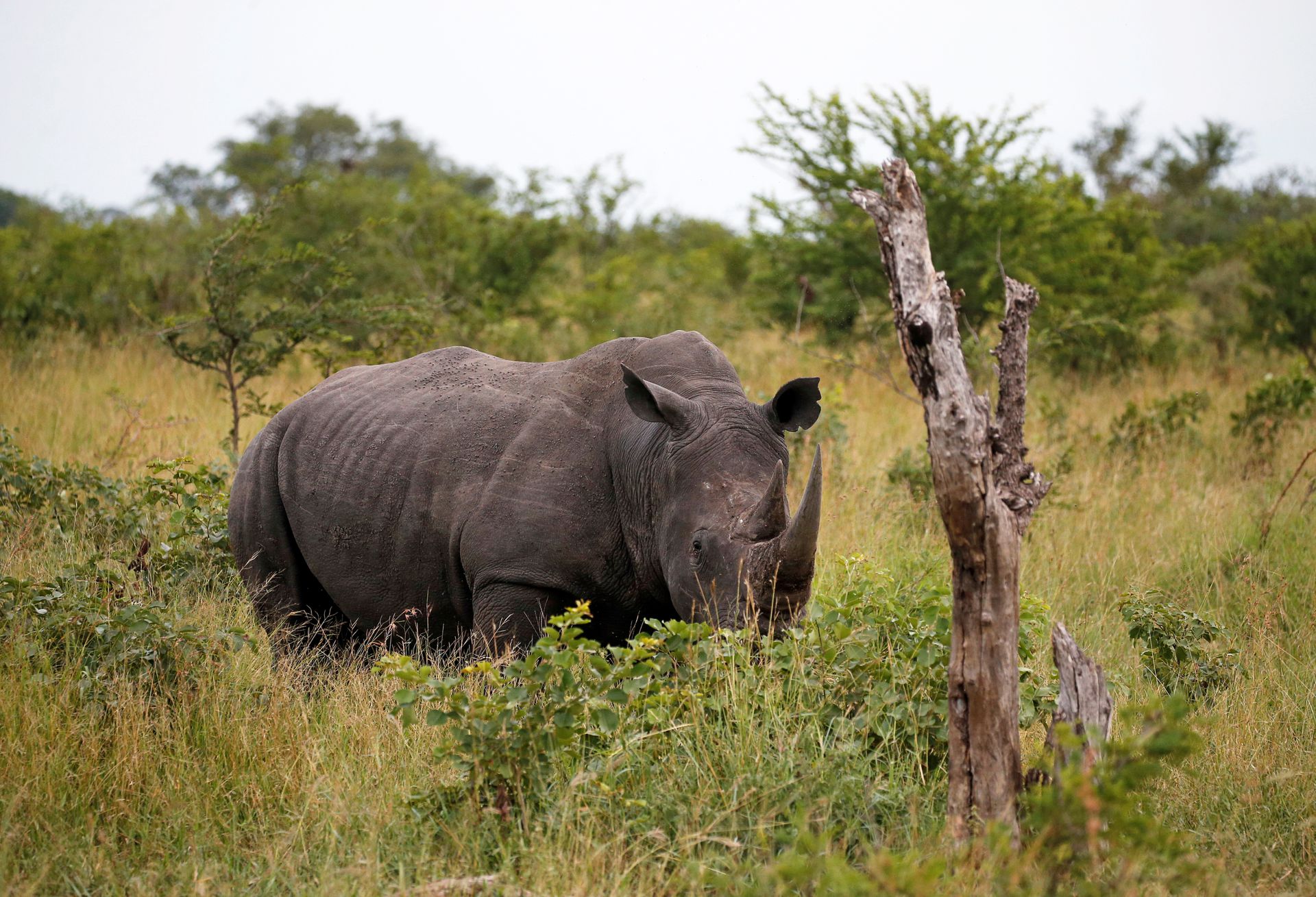
18th June 2022 - 1st July 2022
COVID vaccines prevented 19.8 million deaths during their first year of rollout, according to a new study in The Lancet. The research covered 185 countries and is the first major analysis since the first jab was administered in December 2020. India averted the most deaths at 4.2 million, followed by the US at 1.9 million and Brazil at just over a million.
Global efforts to fight malaria have yielded impressive results. An estimated 10.6 million malaria deaths and 1.7 billion cases were averted between 2000 to 2020. Twenty-six countries reported fewer than 100 cases in 2020, up from just six in 2000. Since 2015, nine countries have been certified as malaria-free. WHO
At the front of the pack is India, where malaria cases have fallen by an astonishing 86% since 2015 thanks to an increase in government resources and the tireless efforts of NGOs. Meanwhile trials of a new malaria vaccine in Burkina Faso have delivered 77% efficacy, exceeding the WHO target of 75%. At least 200 million doses will now be rolled out across another four African countries.
With a fair wind, the 2030s could see the reduction of malaria from a major killer … to a more localised minor cause of mortality.
Adrian Hill, Director of the Jenner Institute
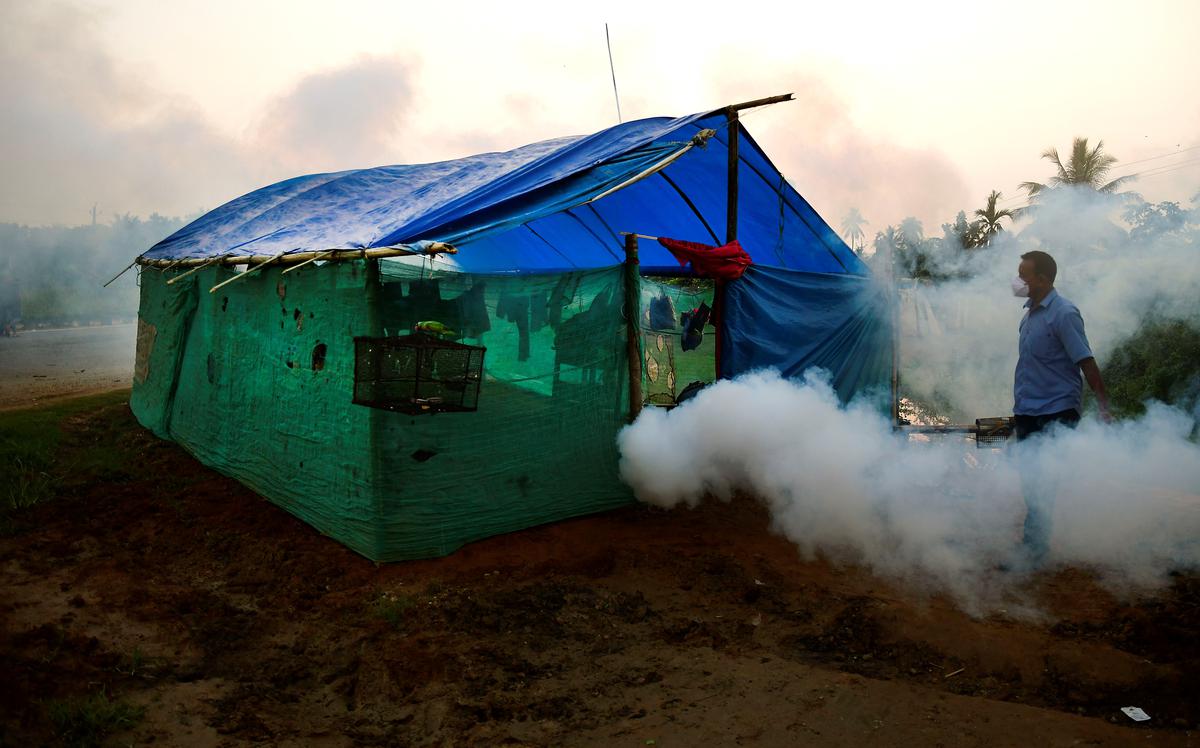
The WHO says there has also been substantial progress in the fight against neglected tropical diseases (NTDs). 46 countries have now eliminated at least one NTD and between 2015 and 2019, more than a billion people were treated every year for one or more NTDs. In the period between 2010 to 2020, the number of people requiring an NTD intervention was reduced by 600 million.
Equatorial Guinea has successfully eliminated human African trypanosomiasis, also known as sleeping sickness. Global public health efforts over the past decade have drastically reduced cases by 95% with Benin, Côte d’Ivoire, Togo, and Uganda recently eliminating the disease as well. WHO
Voters in Kazakhstan have overwhelmingly approved constitutional reforms for a 'New Kazakhstan' that will dismantle the super-presidential system that has reigned for three decades. Over half the voting population participated in the referendum and 77.17% backed the reform. DW
A step in the right direction for LGBTQI+ rights in Tokyo with local authorities recognising same-sex partnerships, making it easier for couples to access local services. While 100 municipalities in Japan now recognise same-sex partnerships, it's still the only G-7 nation yet to legalise same-sex marriage or civil unions. Bloomberg
Colombia has passed a landmark road safety law that will help prevent thousands of road crashes, the country’s second largest killer of people aged 10-45 years old. The new law will upgrade vehicle safety standards, infrastructure, speed limits and licensing to meet global recommendations. WHO
This crucial new law should help save thousands of lives. It is a major step forwards for Colombia in setting up the robust legislative framework that we need to ensure safe mobility for everyone, and establishing a proven, life-saving safe systems approach to road safety.
Gina Tambini, WHO-PAHO
Also, did you know that the rate of road deaths has been falling steadily in the OECD for the last few decades? All 38 member states have steadily reduced their rates of accidents and fatalities since the 1970s, except for one (no prizes for guessing who). OECD
The global fertility rate - the average number of children per women - has been steadily declining since the 1970s. The reasons? Women's empowerment in education and the workforce, lower child mortality and the increased cost of raising children. WEF

California has become the first state to provide undocumented residents over the age of 55 with state-subsidized food benefits. The assistance will feed around 75,000 people by 2025 and the pressure is now on to extend the benefits to younger people who are struggling with high rates of food insecurity. Fresno Bee
California has also become the first state to guarantee free health care for all low-income immigrants, regardless of legal status. The Medi-Cal coverage will protect around 700,000 undocumented Californians aged between 26-49 and could lead to the largest drop in the rate of uninsured Californians in a decade. Daily Kos
California is building a more universal, efficient, and equitable health care system for all who call California home. Health care is a human right, and our health system is stronger when everyone is included.
Jose Torres, Policy, and Legislative Advocate at Health Access California
In a landmark deal for gender equality, the EU has agreed to mandatory quotas to ensure women occupy at least 40% of seats on corporate boards by mid-2026. The directive applies to companies with at least 250 employees and fines may be issued for failure to comply. Euro News
Paid leave for parents is steadily improving. In the last decade 38 countries have increased the duration of their paid maternity leave, and 22 now guarantee at least 14 weeks. Reforms on leave for fathers have likewise gained popularity, with 37 countries introducing paid paternity leave since 2011. World Bank
Surgical abortions are no longer the norm in the United States. The majority (54%) are now done via medication - approved for up to ten weeks by the FDA, and often mailed to patients after an online or telehealth consultation. Politicians might want to police control over women’s bodies, but science and medicine have other ideas. Guttmacher Institute
Since 1980 at least 59 countries have expanded abortion access, and only 11 countries have restricted it. The US is now in some pretty illustrious company (see below). Elsewhere, progress continues. Israel just removed its requirement that women appear in front of a committee in order to receive an abortion, and Germany is moving to decriminalize a women's right to choose.

Canada is banning the manufacturing and import of a number of single-use plastics including checkout bags, utensils, food-service products, ring carriers, stir sticks, and straws. The ban will save 15 billion bags per year, and prevent 16 million straws a day ending up in landfill. Sales will be prohibited from December 2023. WaPo
Landmark legislation in California will reduce single-use plastic by 25% over the next ten years. The ambitious law requires at least 30% of plastic items sold or bought in California are recyclable by 2028 and economic responsibility falls to producers. It’s the first state in the US to approve such sweeping restrictions. Guardian
54,000 acres of private ranch land in New Mexico will be added to the existing 4,000-acre Marquez Wildlife Management Area, making it the largest state-owned recreational property in the state. The land contains important cultural sites for tribal communities and critical habitat for black bears, migratory birds, and cougars. ABQ Journal
The Cofán community in the Ecuadorian Amazon have successfully saved 32,000 hectares of their ancestral land from 52 mining projects after winning a series of landmark cases. The community established Ecuador's first indigenous guard to defend their land in 2017 and the government must now consult them before greenlighting any proposals that threaten their way of life. Long Reads
One in five councils in the UK have now launched rewilding schemes or are planning to do so. Councils are among the largest landowners in the country, and their participation plays a significant role in the current push to rewild 5% of the land. Not bad for a movement that's only a few years old. Guardian

Argentina has pioneered a private to public rewilding model that has successfully restored over 800,000 hectares of damaged land and reintroduced multiple species. Since the 1990s the Tompkins Conservation foundation has been buying private land to restore ecosystems and then donating the protected areas back to federal and local governments. Guardian
The Kawawana conservation area in Senegal was created a decade ago by a group of Indigenous Jola fishers. Today, it's entirely governed, managed and maintained by local communities, who have succeeded in restoring an area where biodiversity had all but disappeared. There are now twice as many fish species, and the reserve has recently been expanded to 20,000 hectares. Mongabay
A ban on bullfighting in Mexico City has been extended indefinitely, signalling the end of the 500 year tradition in the country. Since 2013 the states of Sinaloa, Sonora, Guerrero, Coahuila and Quintana Roohave have all banned bull fights - this however, is the death knell for the 'sport.' ABC
The European Commission has tabled a new Nature Restoration Law to repair 80% of impacted habitats and restore all ecosystems, from forest and agricultural land to marine, freshwater, and urban areas by 2050. It’s the first-ever legislation to explicitly target the restoration of Europe’s nature.
In the past 35 years, farmers in Niger, the least developed country in the world, have added a staggering 200 million trees across 12 million acres of arid land without planting a single sapling. Local farmers let nature take the lead, allowing cut trees to regrow in their fields rather than clear them. As a result, soils in the area are more fertile and crop yields are up. Nat Geo
Since its establishment in 2001, the International Dark Sky Association has recognized more than 190 sites, protecting over 110,000 km² of dark places around the globe, including dark sky reserves, communities, islands and sanctuaries. As the benefits of dark skies become better known, many more rural areas are now seeking recognition. BBC

In one of the largest transfers made to First Nations people in the US, the state of New York has returned 1,000 acres of forest to Onondaga Nation. The transfer is the first time land has been returned to a New York tribe and is part of the decades-long clean-up of Onondaga Lake. Syracuse
Launched at last year’s G7 Leaders’ Summit, the Blue Planet Fund is already helping developing countries and coastal communities adapt to climate change. The £500 million fund has backed a wave of new projects aimed at bolstering the economies of small islands and developing nations as well as protecting ocean and coastline biodiversity. Industry Update
And in other good news - the United Kingdom, Canada, and the United States just launched the world’s first global alliance to combat illegal, unregulated, and unregistered fishing, which threaten marine ecosystems, coastal communities, and global fish stocks. Global Fishing Watch
The American government has entered a historic agreement with five Native American tribes to co-manage Utah’s Bears Ears National Monument. The agreement comes after decades of lobbying and marks the first time in the history of federal land management that the government will treat tribes as equals and experts. Outside Online

Japan is ending the financing of coal projects in Bangladesh and Indonesia. This is a critically important move. Almost all the new coal plants built across South and southeast Asia in the last decade have relied on massive capital subsidies from Japan, Korea and China. Great to see Japan finally implementing their no new coal financing pledge of 2020. Bloomberg
Sompo, one of the top three Japanese non-life insurers, has become the first Asian insurer to rule out insurance and investment in companies involved in the Arctic National Wildlife Refuge. Sompo has also committed to rule out underwriting and investment in coal companies without transition plans by 2025. Insure our Future
The Catholic Theological Society of America, the world's largest organization of theologians, just announced it's divesting its financial funds from fossil fuels, a move great in moral weight and one backers hope is rich with potential to inspire similar actions at its members' institutions. NCR
In 1990, China generated less than 1/600th of the renewable power of the United States. Fast forward to 2021, and it's rocketed past both the US and Europe, adding almost 290 terawatt-hours of renewable electricity generation in a single year. Japan and India aren't far behind now either, generating a combined 302 terawatt-hours. Bloomberg

China is also tightening its environmental regulations, with a new ban on new steel, coking, oil refining, cement, and glass projects in already polluted areas. The country is also aiming for electric vehicles to make up 50% of total sales by 2030 and is prioritising the development of biomass, geothermal or solar energy for heating. Reuters
The global pipeline of offshore wind has almost doubled in the past 12 months from 429 GW a year ago to 846 GW today. Absolutely staggering growth. China has the biggest pipeline at 98 GW, the UK is in second place at 91 GW (up from 55 GW a year ago) the US is third with 80GW, and Germany is fourth at 57 GW. Renewable UK
The total capacity of proposed renewable generation and storage projects in Australia has reached 150GW. Not all of this will be built - but most of it will, as the country's energy market operator is now saying that the switch to a renewables-based grid is 'complex, rapid and irreversible.'
Canadians looking to make their home more energy efficient and environmentally friendly can now get an interest-free loan of up to $40,000 from the federal government. Last month, the scheme opened to eligible people planning green upgrades to their property. C'mon Straya. Storeys
"The site is charged with controlling the flow of electricity to 18 million people in eastern and northern Germany. Today the screens show 28% of that flow coming from wind farms and 24% from solar panels. A decade ago the custodians of the grids which keep the rich world’s lights on would have told you this was impossible." Economist

Meanwhile, in Europe, "a long but good day for climate action" after environment ministers from 27 states struck a deal to approve a raft of measures to combat climate change in the early hours of Wednesday morning. It's particularly good news in the transport sector. DW
Staying in Europe, a new report looking at the cost of ownership of electric and diesel trucks has shown that electric trucks have already reached cost parity in six cities: Berlin, Paris, Rome, London, Warsaw, and Amsterdam. That's way ahead of predictions, and yet another example of how the energy crisis is speeding up decarbonization across the continent. RAP
In the United States, heavy duty transportation, one of the hardest sectors to decarbonize, suddenly looks like it's going to makes the transition towards zero emission vehicles in years, not decades. In the next few months, the country's fleet of HD ZEVs will increase 45 fold.
The notorious lentil-eating, greenie snowflakes at the Texas Department of Transportation are planning to add enough charging stations throughout the state to support a million EVs in the next five years, starting with the main transportation corridors, and then moving to rural areas. The plan is to have a charging station every 50 miles along most interstate routes. Tribune
Chinese electric vehicle manufacturer BYD is selling cars at such a furious pace it's become the second biggest carmaker in China. Sales have surged almost 350% to more than half a million during the first five months of 2022. We've said it before, we'll say it again. EVs are coming far quicker than even the most optimistic forecasts predicted. Asia Financial
Ferrari says three out of every five vehicles sold will be either electric or hybrid within the next four years, and 80% of it cars will be electrified by 2030. CEO Benedetto Vigna: "not only it is required by emissions regulations, but most importantly, we believe we can use the electric engine to enhance the performance of our cars." Forbes

And finally, who just said this?
"By 2040, every new passenger car sold in the world will be electric."
You guessed it, renowned environmentalist, Darren Woods, CEO of Exxon Mobil. CNBC
28th May 2022 - 17th June 2022
Togo has become the third country in Africa to eliminate trachoma, the world’s leading cause of preventable blindness. Significant progress has been made across the continent, with infection rates falling from 189 million in 2014 to 116 million in 2021. WHO
The Central African Republic has officially abolished the death penalty, and Malaysia has banned it too, handing judges discretion to use a range of substitute sentences for serious crimes. 170 countries have now abolished or restricted the use of capital punishment.
Between 2013 and 2020 China’s air pollution dropped by 40%, which means the country reduced the same amount of pollution in seven years as America did in three decades. Since air pollution is the largest killer of people worldwide, this achievement equates to millions of lives saved. Bloomberg
The UN says every person on earth will be covered by early warning systems for extreme weather events within the next five years. Issuing a warning 24 hours before a storm or heatwave has been shown to reduce damage and loss of life by an average of up to 30%. EuroNews
A landmark ruling in Mexico has banned random immigration checks that target Indigenous or Afro-Mexicans who are often detained, harassed, or wrongfully deported. It’s an important victory for human rights groups who have spent years in court fighting for the change. HRW
Spain’s parliament has approved a bill that will make consent a determining factor in rape cases. The proposed legislation known as 'only yes means yes,' will free survivors of sexual assault from having to prove violence. The law includes measures such as creating a network of 24-hour crisis centres for survivors of sexual assault and their families. Guardian
From today, Spain is a freer, safer country for all women. We are going to swap violence for freedom, we are going to swap fear for desire.
Irene Montero, Spanish Minister for Equality

America’s inequality problem has improved for the first time in a generation. The poorest half of Americans now hold a bigger share of the nation’s wealth than they have at any point in the last 20 years. Some welcome news for 6.2 million workers in Germany too, who will receive up to €400 extra per month thanks to a national increase in the minimum wage.
Over the past decade Houston, the fourth largest city in the US, has reduced its homeless rate by 63% thanks to a radical 'housing first' approach that moves people into permanent accommodation rather than shelters. The city now has a $100 million plan in the works to cut homelessness by a further 50% by 2025. NYT
Thailand has become the first Asian country to legalise medicinal marijuana and allow people to grow the plant at home. While recreational use of the drug remains illegal, the government hopes the new law will boost the wellness and tourism industries. ABC
In the wake of the Uvalde shooting in Texas, Canada has implemented a national freeze on the sale and purchase of handguns. The new legislation is part of a gun control package that will also limit magazine capacities. While Canada’s gun homicide rate is less than a fifth of the US, it is higher than other wealthy countries. Reuters
For the first time in 60 years, China’s population is about to decrease. Over the past four decades the population swelled from 660 million to 1.4 billion, but in 2021 it increased by a record-low of 480,000, and is now on course to shrink in 2022. BBC
The number of young people being prosecuted in adult courts in the US has dropped from 8% in 2010 to 1% in 2020, giving tens of thousands of teens a second chance to turn their lives around. The 'raise the age' movement has contributed to the shift which deals with offenders under 18 years old through the juvenile justice system and community-based programs. AP
Regardless of what young offenders are charged with, what works is community-based intervention and letting communities lead reform efforts.
Naomi Smoot Evans, Executive Director of the Coalition for Juvenile Justice in Washington
Did you know that same sex marriage just took a big step closer to being legalized in both Thailand and Czech Republic?

A community-led effort to protect turtles in Mohéli, one of the islands of the Indian Ocean nation of Comoros, has inspired the expansion of Comoros’s protected areas from one to six, including three new marine protected areas (MPAs). The country’s first MPA was created in 2001 and is now one of the largest nesting sites for green sea turtles in the Indian Ocean. Mongabay
Oil drilling in the Arctic’s National Wildlife Refuge is officially bad for business with three major oil companies cancelling leases and five of America’s big banks refusing to fund projects there. The 20 million-acre reserve provides critical habitat for the Southern Beaufort Sea’s remaining polar bears. WaPo
The ocean off Gaza is ‘crystal blue’ for the first time in years, after sewage treating facilities stepped up operations to stop untreated sewage flowing directly into the water. It’s good news for the 2.3 million Palestinians who can finally enjoy a swim this summer. Euro News
The Pacific Island state of Niue is creating a marine park to protect 100% of its ocean, an area the size of Vietnam spanning 317,500 km2. The island’s waters are a birthing ground for humpback whales and boast the world’s highest population of grey reef sharks and the katuali sea snake. Niue follows the lead of the Cook Islands which has also committed to 100% protection. Guardian
The ocean is everything to us. It’s what defines us. We have to ensure our reefs and corals remain to provide a healthy ecosystem and continue to create a food source for our people.
Dalton Tagelagi, Premier of Niue
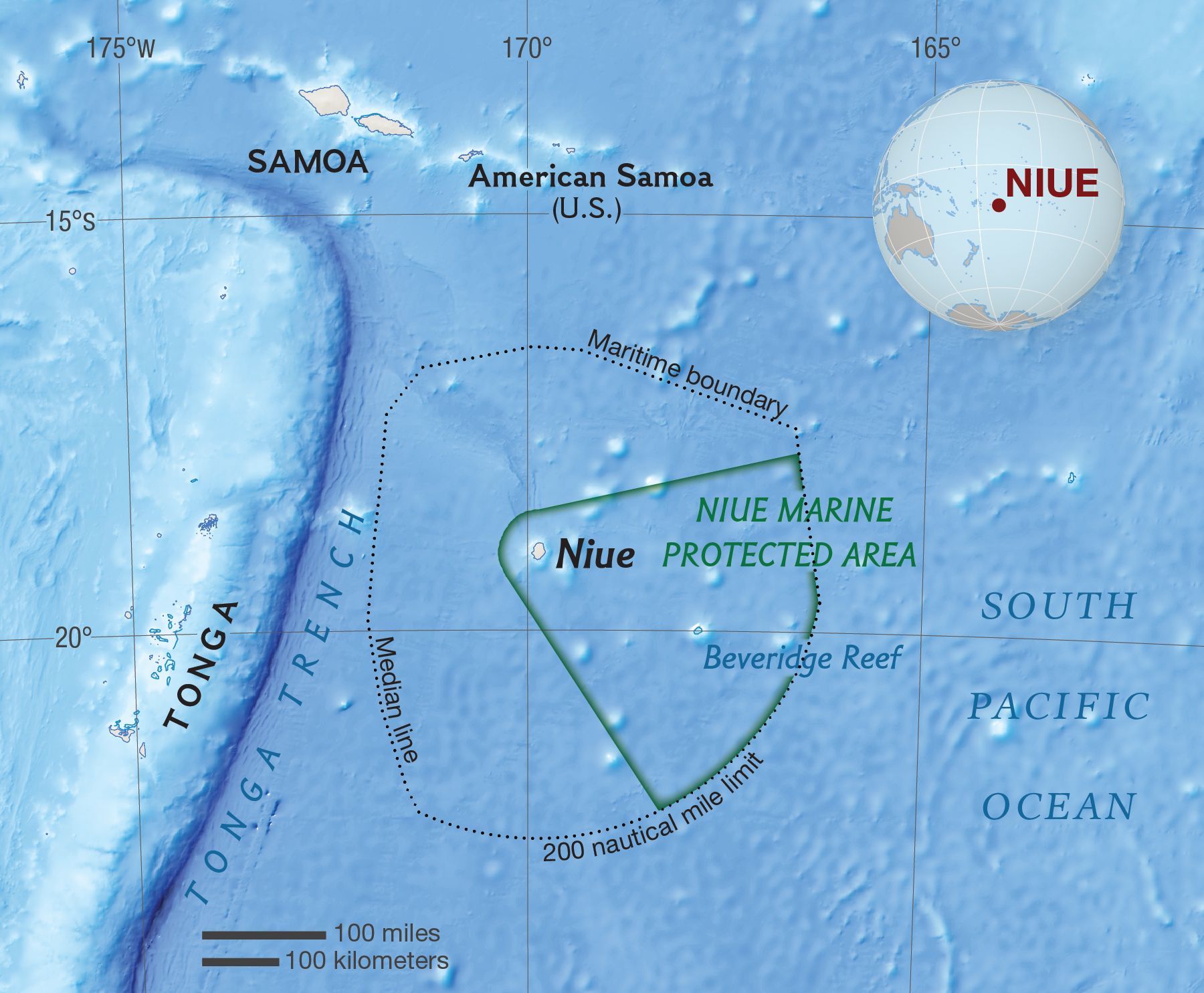
The global war on waste is ramping up. India is about to kick off the largest plastic ban in the world, America just announced it will phase out single-use plastic in national parks by 2032, saving 14 million tonnes of plastic from ending up in the ocean, and in Australia, efforts to minimise plastic over the past six years have reduced coastal litter by 29%.
Living Lands and Waters, a 23-year old environmental non-profit in the United States, collected over half a million pounds of trash across seven rivers throughout the USA last year. 63% of that waste came out of the Ohio River, a main source of drinking water for more than five million Americans. Ground Truth Project
Big environmental win in California with the end of state-run pesticide programs on public, agricultural, wild lands, and private properties. The government has also announced a $40 million award to support regional initiatives that repurpose agricultural land in an effort to reduce water demand.
Five major nature recovery projects are underway in the UK to restore a whooping 99,000 hectares of land across the West Midlands, Cambridgeshire, the Peak District, Norfolk, and Somerset. The projects aim to tackle wildlife loss, climate change and improve people’s access to nature, especially in city areas. Guardian
Queensland will invest over $24 million into protecting koala populations and habitats.The koala is an endangered species in Queensland, New South Wales, and the Australian Capital Territory, mainly due to habitat loss. Guardian
A 25-year study of the monarch butterfly in North America, the largest and most comprehensive assessment of the breeding population to date, has overturned everyone’s worst fears and revealed that the species is actually doing alright, after an average annual increase of 1.36% per year. Global Change Biology
The endangered Bali mynah bird is making a comeback thanks to a surprising partnership between conservationists and local bird sellers. For the past decade approved breeders have been given licenses to breed and sell 90% of mynah offspring if the remaining birds are released at West Bali National Park. AP
A victory for wolverines in Montana, with a court reinstating additional protections for the species under the Endangered Species Act. Like other snow-dependent species, wolverines are facing habitat losses due global warming and the protections will help focus resources to save them. Biological Diversity
Today’s decision gives us hope that wolverines could once again roam Colorado’s high country, where high elevation, snowy habitat could help these elusive and fascinating animals survive in the face of climate change.
Megan Mueller, Conservation Biologist, Rocky Mountain Wild
A landmark ban on ivory in the UK has gone into effect. The Ivory Act is one of the toughest in the world, with offenders facing an unlimited fine or up to five years jail. It’s hoped the ban will help end the global ivory trade, which slaughters an estimated 20,000 elephants each year. UK Gov
New York has passed a bill that bans pet stores from selling animals supplied by abusive breeders or 'puppy mills.' Under the new law, pet shops are required to collaborate with animal shelters and encourage people to adopt rather than buy pets. California passed a similar law in 2017. NY Post
Brazil’s iconic golden lion tamarin, found only in the Atlantic Forest, has been saved from extinction with the population rebounding from 200 in 1977 to over 2,000 today. Local conservationists have worked tirelessly for 50 years to protect natural habitat and bolster the population through breeding programs. Work is now underway to protect the other three species — the black lion tamarin, golden-headed lion tamarin, and black-faced lion tamarin. Mongabay
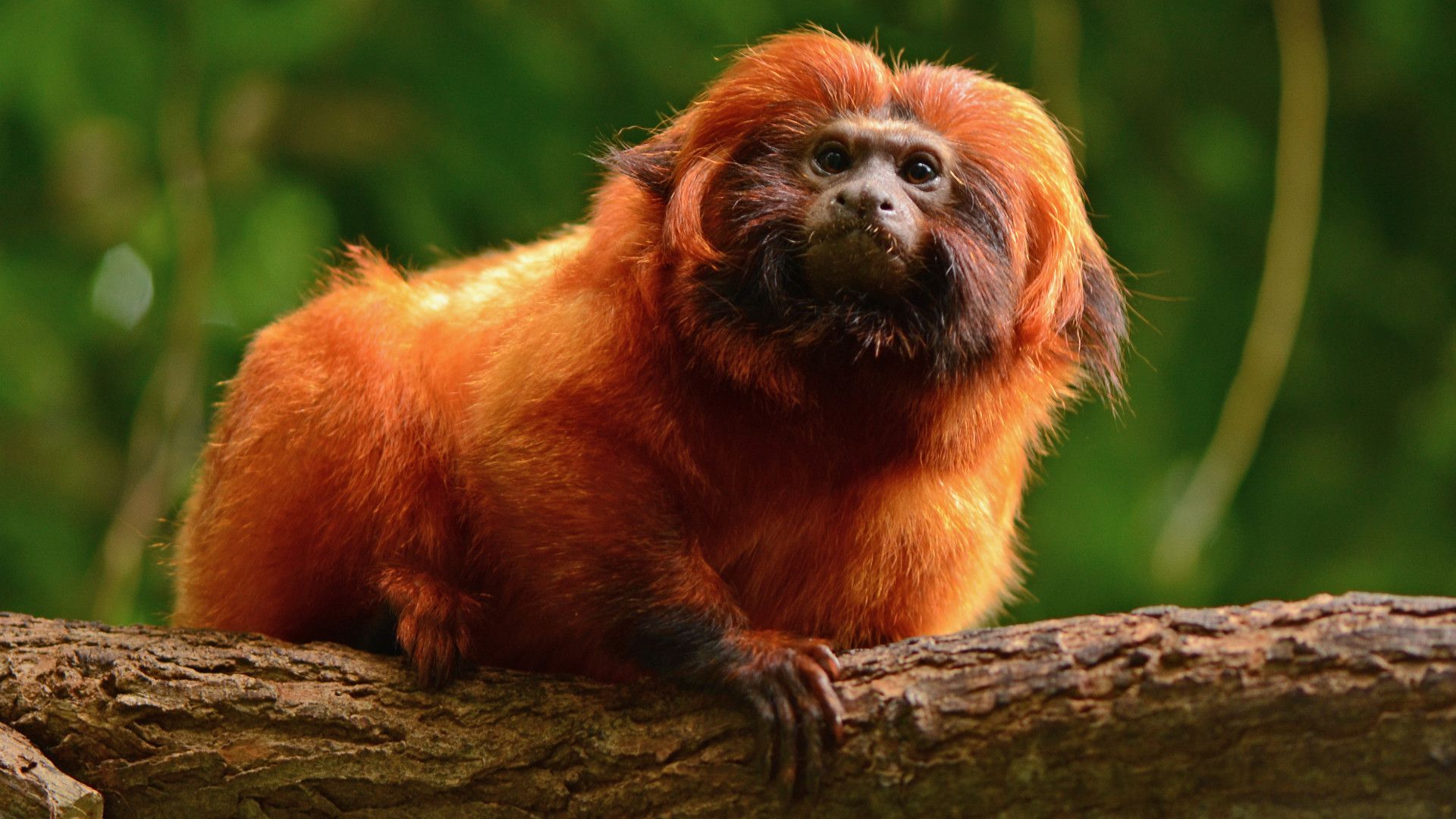
Vladimir Putin has arguably done more to accelerate the clean energy transition than anyone in history. 19 European governments have now accelerated their decarbonisation plans, and under the latest national commitments, EU countries are aiming for 63% of renewables in electricity generation by 2030, up from 55% under previous commitments. Ember
The Greek government has adopted the country's first national climate protection law, requiring all coal fired generation be closed by 2028, and renewables to account for up to 70% of electricity generation by 2030. This is insanely ambitious. The current share is around 40%. Renewables Now
Amidst the sound and fury surrounding the global conversation on energy, most journalists are still missing the most important point: solar, wind and batteries are on learning curves, and coal, oil, gas and nuclear aren't. A new analysis of wind and solar farms in the United States for example, has shown that each time the total amount of wind installed doubles, the cost comes down by 15%, and for solar, by 24%.
Incredible things are quickly normalized by this kind of exponential growth. This battery storage site in Texas would have been by far the world’s largest five years ago. Today it’s just another project. It's why almost nobody in America is building fossil fuel power plants any more...
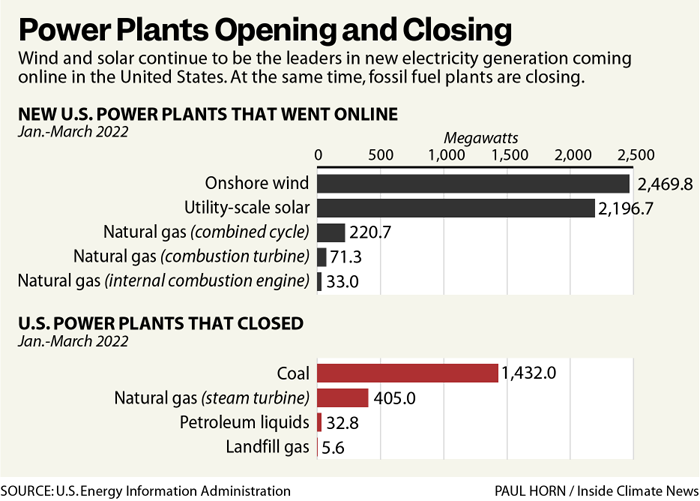
...and why nobody in the world wants to insure them either.
It's why it's no longer newsworthy that an industrialised nation just produced 100% of its electricity from wind for two days in a row. Or that another one has set the most ambitious climate goal in the world, aiming to reach net zero by 2035, and net negative – absorbing more CO2 than it emits – by 2040.
Samsung, South Korea’s largest conglomerate, is requiring all its financial subsidiaries to stop investing in coal companies, and Sompo, one of Japan's biggest insurers, says it will stop underwriting new and existing coal around the world. Two really big market signals from where it matters most, southeast Asia.
Next Era, the largest power company in the United States, just announced a plan to achieve 'real-zero' by 2045, by building huge amounts of solar and hydrogen. No other utility to date has committed to near-total decarbonization without the use of offsets or carbon capture technology. WSJ
While everyone's attention has been on the US federal government's inability to pass climate legislation, states and governors have quietly notched up an astonishing list of energy and environment wins across the country. A powerful antidote to despair. LCV
China's biggest dam builder says the nation will start construction on more than 200 pumped hydro stations with a combined capacity of 270GW by 2025. That's more than the capacity of all the power plants in Japan, and will be enough to meet about 23% of China's peak demand. Straits Times
Carbon Brief has a new report showing China’s carbon emissions fell by 1.4% in the first three months of 2022, making it the third quarter in a row of falling emissions. That's the longest emissions decline in China for a decade. Previous declines have been followed by rapid rebounds, but this time could be different...

... because China is now building the equivalent of one coal plant of wind and solar every week. The country is on track to install 108GW of solar alone this year, almost double the 54 GW installed in 2021. Combined with 50GW of wind, that would generate the same amount of electricity as 52 coal plants. Bloomberg
Austria just passed legislation requiring all new or replacement heating systems to be renewable from next year. By 2035, all oil and coal heating systems must be replaced by renewable ones, and by 2040 all gas heating systems must also be replaced. People with low incomes will receive 100% of the costs. Kleine Zeitung
Vietnam, a country of almost 100 million people, is undergoing one of the biggest and fastest energy transitions in the world. In the four years to 2021, the share of solar increased from zero to nearly 11%, making it the world's 10th largest solar power producer. Petrotimes
And the next time someone complains about the coming wave of toxic materials from solar panels, or says "what about recycling?" send them this.
Volvo has become the world's first manufacturer to deliver a construction machine built using fossil-free steel to a customer. This articulated hauler was handed over on the 1st June 2022 - just nine months after the company unveiled the world’s first vehicle concept using fossil-free steel. Aggnet
Lawmakers in the European Parliament have voted to ban internal combustion engines in all new cars and vans by 2035. The legislation requires carmakers to reduce their fleetwide emission averages by 100% from 2035, with interim steps in 2025 and 2030. Politico
Buick, the iconic American automaker, says it will only sell electric vehicles by the end of this decade. And Chevy just slashed the starting price of its Bolt EV by 27% to $26,595, making it the cheapest electric vehicle in North America.

17th May 2022 - 27th May 2022
Ebola has been defeated. Jean-Jacques Muyembe, the Congolese doctor who first discovered the virus 40 years ago, says that the fight is now over, thanks to vaccines and effective clinical treatments. "For 40 years I have been a witness and a player in the fight against this terrifying and deadly disease and I can say today: it is defeated, it is preventable and curable." France24
Three African countries, Benin, Uganda, and Rwanda, have successfully eliminated trypanosomiasis (sleeping sickness) another big milestone for a global public health campaign that began in 2001. Togo and Côte d’Ivoire were the first countries to eliminate the disease in 2020. WHO
In the past three decades, suicides involving guns have steadily fallen around the world. Data from 204 countries shows that between 1990 and 2019, the global rate of firearm suicide decreased by an average of 2% per year. The reason? Stricter gun controls. Only one country is an outlier. New Scientist
A new study has revealed a surprising decline in teenage drinking around the world, especially in northern European and English-speaking countries. The trend started in the early 2000s and has continued steadily over the past two decades. Addiction
A big win for the LGBTQ community in Greece, after the country banned conversion therapy, adding itself to an ever-growing list of countries that have outlawed the practice. Meanwhile Canada has finally lifted its restrictions on gay men donating blood, and in the United Kingdom, the Church of Scotland will now allow clergy to conduct same-sex marriages in church.
The global impact of terrorism continues to decline. In 2021, deaths fell to 7,142, despite the overall number of attacks increasing, highlighting that terrorism is becoming less lethal. Mozambique had the largest drop, with deaths falling by 82%. Attacks the West also declined significantly, dropping by 68% in 2021. Relief Web

A watershed moment for Moroccan labour rights, with the government extending paid paternity leave from 3 to 15 days. The new measure is part of a 'social pact to improve working conditions for Morocco’s working class which includes an increase to the minimum wage and family allowances. Morocco World News
India's Supreme Court has ruled that the country's police should neither interfere nor take criminal action against consenting sex workers. It's a major win for the country's human rights campaigners, who have long argued that sex workers should be entitled to dignity and equal protection under the law. India Today
New South Wales has become the final state in Australia to introduce assisted dying laws. The legislation, which comes 20 years after the issue was first debated in state parliament, allows it for terminally ill people with a prognosis of six months, or 12 months for people with a neurodegenerative condition. SMH
Childcare in the US state of New Mexico is now free for those on low-incomes, with the government covering costs to help people get back to work after COVID. The initiative is funded by taxes on oil and gas and is the first in the country to cover a broad range of incomes, with families earning up to 400% of the federal poverty level eligible. WaPo
The US government has launched a $45 billion initiative to provide affordable, reliable high-speed internet to all Americans by the end of this decade. The program aims to eliminate the digital divide, focusing on the inclusion of communities of colour, rural communities, and older Americans. Department of Commerce
Since the beginning of the COVID-19 pandemic, around 16 million people have been enfranchised into the Brazilian financial system. An astounding 85% of Brazilians now have access to financial services, marking one of the highest increases in the banked population in decades. WEF
The IEA says renewables’ growth so far this year has been much faster than expected. China is leading the way as usual, but expansion is also accelerating in Europe, India and Latin America: global new solar capacity is currently on track to smash all records in 2022.
China tripled investments into solar power in the first four months of this year, putting the nation on track to install record amounts of new clean energy in 2022. Investment in solar was $4.3 billion from January through April, about 204% higher than in the same period a year earlier. Bloomberg
Major fossil fuel exit by BBRI, the largest public company in Indonesia, which serves 43% of the population. The bank's CEO has announced it will stop financing 'harmful' energy commodities such as coal and oil. "If the world wants to live another 1,000 years, it has to take 100 years of medicine." Bisnis
Denmark, Germany, the Netherlands and Belgium just announced a plan to install a monstrous 150GW of offshore wind in the North Sea by 2050 - half of all the offshore wind necessary to get the EU to net zero. To put that in perspective, total installed capacity worldwide at the moment is 25GW. Wild. Business Green
Renewables aren't immune to supply chain gyrations, but compared to fossil fuels, there's just no comparison. Even before the war in Ukraine, coal and gas in the EU was a lot more expensive than solar, but now it's getting ridiculous. Transition Zero

Europe is putting its shoulder hard to the wheel. The European Commission just unveiled a €300 billion plan to become independent of Russian energy imports by 2030. It includes a provision to make solar panels mandatory on all buildings. "We must now reduce as rapidly as possible our reliance on Russia in energy. We can." Independent
Vietnam is planning an aggressive switch from coal, to wind and solar to decarbonize its power sector and meet rising demand. Its new national power plan says no new coal-fired power plants will be built from now on, and aims instead for a 50.7% share of the generation stack for wind and solar by 2045. IHS Markit
Texas burns more coal than any other state in the United States. However, no other state has as much renewable energy either, and there's now enough wind and solar in the pipeline to almost completely replace all of the state’s coal generation. The big bottleneck isn't projects any more, it's transmission lines. PV Magazine
California's Senate just passed the California Fossil Fuel Divestment Act, which would require CalPERS and CalSTRS, the two largest public pension funds in the US, to divest from fossil fuels. “This is a great step in the right direction. State pension funds should be invested in the future of the state, not in a dark and deadly fossil fuel past." Fossil Free California
One of the most undertold stories in all of energy is how Kenya is rapidly decarbonizing thanks to geothermal. The country just hit a new peak for electricity demand - and the largest share, around 40%, came from geothermal power plants. The next biggest power source? Hydropower. Kengen
Officials from the G7 wealthy nations just announced they will aim for 'predominantly decarbonized power sectors by 2035.' That's a big step up, especially for Japan. 12 months ago, the same meeting ended with the aim of 'overwhelmingly decarbonized power sectors by the 2030s'. DW
The Netherlands will ban gas boilers and make hybrid heat pumps the standard for heating homes from 2026. The government has increased the subsidy for the purchase of heat pumps to an average of 30% from this year. The United Kingdom is also planning to ban gas boilers in new homes after 2025. Energy Live News
Volvo will be the world's first truck maker to use fossil-free steel. The steel is produced by the Swedish steel company SSAB using hydrogen, and will initially be used in the trucks' frame rails and vehicle backbones where other components are mounted. Production will begin in the third quarter of 2022. Greenbiz
In China, the world's biggest car market, EV sales are rocketing. In the first four months of 2022, the number of plugin vehicles more than doubled from a year earlier to 1.49 million. Clean energy vehicles accounted for 23% of China's passenger car market, whole overall vehicle sales fell 12%, reflecting a steep decline in demand for gasoline cars. Reuters
In the United States, the world's second largest car market, an electric car is now cheaper on a monthly basis than a comparable gasoline car in almost every state (once financing, taxes, maintenance and fuel costs are included). Bloomberg
A new analysis of trucking in California and New York has shown that 65% of medium-duty trucks and 49% of heavy-duty trucks are driving short enough routes that they could be replaced with electric models that are on the market right now. RMI
Electric vehicles of all types are already displacing about 1.5 million barrels of oil a day worldwide. Most of that is from electric two and three-wheelers and electric buses in China. Thanks to all those batteries, 3.4% of global transport oil demand is now gone. Bloomberg
Last month, the Global Environment Facility announced a record round of new funding of $5.25 billion, covering the next four years. This represents a 30% increase over the previous funding period for one of the world’s largest and most influential environmental grantmakers.
A new 'super reserve' in the UK will knit together six protected sites spanning 15,000 acres of wetland in Somerset. The project is designed to boost populations of the avocet, marsh harrier, skylark, and hairy dragonfly. The announcement coincides with the 70th anniversary of England’s first six national reserves, which have since increased in number to 219.
California has a new park for the first time in 13 years. Once used as dairy pastures and almond orchards, Dos Rios Ranch is a 2,100-acre riverfront property and will provide restored habitats for endangered animals like the sandhill crane, riparian brush rabbit and Chinook salmon. It's California's 280th state park. SF Gate
If this isn’t a story of hope, we don’t know what is. A 45-acre junkyard of rusting cars and thousands of barrels of toxic chemicals has been added to Ohio’s Cuyahoga Valley National Park. Over the past 16 years, the site has been transformed into a wetland teeming with birds and plants thanks to one of the National Park Service's most extensive and expensive rehabilitation projects. Nat Geo
Here’s a twist … London’s new Elizabeth underground line will benefit birds as well as commuters. A sanctuary has been created out of the 3.5 million tonnes of earth dug up during construction. The Jubilee Marsh spans over 160 ha and tens of thousands of migratory birds have already taken up residence including avocets, spoonbills, black-tailed godwits, and little egrets. Guardian
Europe removed a record-breaking 239 dams in 2021. With wind and solar outcompeting hydroelectricity, more dams are likely to be made redundant, and a key element of the European Union Biodiversity Strategy is to restore at least 25,000km of rivers to a free-flowing state by 2030. Dam Removal EU
A big milestone for the greater one-horned rhino, with the population in Assam, India reaching 4,014, an increase of 274 since last count thanks to a baby boom during the pandemic. This is an incredible recovery for a species that once numbered fewer than 100 individuals. Rhinos.org
Meanwhile, conservationists in South Africa have translocated four young black rhinos to the Bonamanzi Game Reserve to help preserve population genetics. Black rhino populations fell to just 2,400 in the early 90s due to poaching but protection measures have helped boost populations to around 5,600 today. Mongabay
12 years of conservation efforts in Bangladesh have helped halt the decline in vulture populations. Populations fell by 95% last decade and the red-headed species was declared locally extinct. However since 2015 numbers have remained stable thanks to a ban on harmful veterinary drugs and the creation of “vulture safe zones” across the country. Mongabay
The vulture has also inspired a communally managed forest project, Nuevo Bécal, Mexico. Encouraged by the positive results of a king vulture sanctuary established in 2012, the Ejidatarios people have conserved a further 2,284 ha of their territory, making it the largest voluntary conservation project in Mexico. Mongabay
The largest private conservation project in Canada has just been unveiled - 1,450 km2 of boreal forest in northern Ontario. The protected land is more than twice the size of Toronto, and home to more than 100 lakes and 1,300 kilometres of rivers, streams, and shorelines, including habitat vital to freshwater quality and native fish species. Weather Network
In the last five years, a restoration project in Brazil has recovered 5,000 ha of forest cover in a watershed serving São Paulo and Rio de Janeiro, with plans to reforest another 1.5 million ha by 2030. The program was inspired by a smaller conservation project in Extrema, which has planted more than 2 million native trees since 2005. Mongabay
Some of the world’s biggest mining companies, including Rio Tinto, Anglo American and Vale, have withdrawn requests to extract minerals on Indigenous lands in the Amazon, despite efforts by Jair Bolsonaro. Brazil’s Constitution states mining can only take place on Indigenous lands with consent. AP
America’s waning appetite for meat has resulted in a 35% decrease in greenhouse emissions. New research has found daily beef consumption plummeted by an average 40% per person between 2003 and 2018, and there’s also been steady shift away from dairy, eggs, chicken, and pork. Anthropocene
26 years after San Francisco pioneered city-wide composting, it’s now collecting over 500 tonnes of compost from green bins every day, diverting 80% of the city’s waste from landfill and turning it into high-quality compost in 60 days. Inspired by the city’s success, California will enact state-wide composting to reduce landfilling of compostable materials by 75% by 2025. RTBC
Europe’s conservation projects are paying off, with a dramatic increase in mammal populations facing extinction 50 years ago. Compared to 1960, there are 30 times the number of bison, twice as many bears, three times more elk and five times the population of deer. The most remarkable recovery however, is beaver populations, which have increased by an estimated 140-fold. OWD
The most magnificent green buildings around the world. Some proper eye candy here - including this incredible winery in Georgia. Euronews

16th April 2022 - 16th May 2022
In 2020, India approved Pneumosil, a vaccine for pneumococcal disease. It's a been a huge success story, produced in India, by an Indian company, and now being distributed globally to other low- and middle-income countries for S$2 per dose. Gavi, the international vaccine alliance, estimates it will prevent the deaths of around 50,000 Indian children each year.
Over one million children in Ghana, Kenya and Malawi have now received one or more doses of the world’s first malaria vaccine. The rollout began as a pilot program in Malawi in 2019 and once widely deployed, could save the lives of up to an additional 80 000 children each year. WHO
Remember COVID-19? We’ve come a long way… as of the 15th May 2022, we're down to 0.23 deaths per 1 million people worldwide, a level last reached on March 25, 2020. Although new variants are increasing the number of cases, the extraordinary global vaccination efforts is helping reduce hospitalisations as well as fatalities. OWD
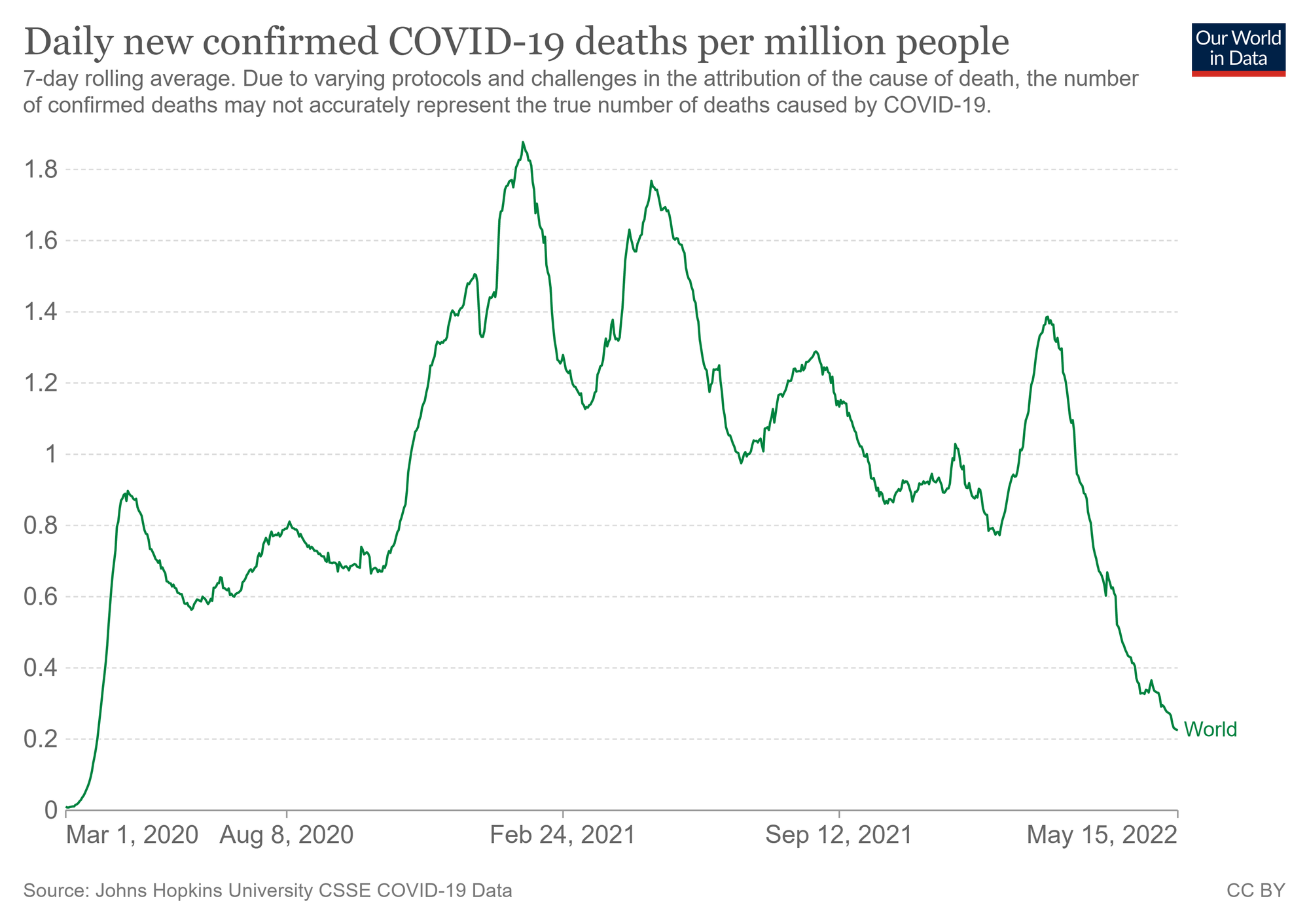
Nearly half a million Kenyans were lifted out of extreme poverty last year as the country bounced back from the pandemic. The World Bank says the number of people living on less than $1.90 a day fell from 19.2 million or 35.7% of the population in 2020, to 18.8 million or 34.3% in 2021, and will fall further to 18.7 million by the end of 2022. Business Daily Africa
Vietnam has made significant progress on poverty in the last decade. The poverty rate fell from 16.8% to 5% between 2010 and 2020, lifting over 10 million people out of poverty. Although progress was stalled during the pandemic, it did not reverse, and the poverty rate is now falling again. World Bank
Bangladesh and Canada have both recorded declines in poverty in the past two years. Poverty in Bangladesh decreased from 12.5% in 2020 to 11.9% in 2021, making the country a role model for poverty reduction in the developing world. Meanwhile 1.4 million people in Canada were lifted out of poverty in 2020 thanks to substantial government supports during the pandemic.
The reduction in motor vehicle deaths in the United States is one of the country's most substantial public health acheivements. In 2000, car accidents were responsible for 13,049 deaths among young people (13.62 per 100,000 persons). Twenty years later, there has been a nearly 40% decrease, with 8,234 deaths (8.31 per 100,000 persons) recorded in 2020. NEJM
A new global study on type 2 diabetes has shown disease management and education programs are working, with a decline in death rates across 16 high-income countries. "There is still a long way to go to control the many risks, but these findings provide promising evidence that we are moving in the right direction." Medical Xpress
The fight against diabetes continues in Mexico, where the implementation of a soda tax has helped decrease consumption of soft drinks. Diabetes used to be the country's leading cause of death between 2000-2006, but a group of advocates and politicians challenged the industry and passed a federal soda tax there in 2013. Fewer Mexicans are drinking soda as a result. Civil Eats
Cancer is the leading cause of death in Canada, with estimates showing that 43% of the population will receive a diagnosis in their lifetime. Good news then - even though overall numbers are up, due to an ageing population - the age related mortality rate has dropped to its lowest level ever recorded. CMAJ

Age-standardized mortality rates for selected cancers in Canada, 1984–2022, by sex. Note: Shading indicates projected data.
A huge victory for LGBTQI+ rights in South Korea with a landmark judgement reversing the conviction of two soldiers who were jailed for consensual same-sex sexual acts while off duty. The military has a long history of violating same-sex rights and the ruling will hopefully pave the way for military personnel to live and love without the threat of prosecution. Amnesty
New Mexico recently established the most extensive tuition-free scholarship program in the US, and Maine has proposed making two years of community college free for high school graduates. This would bring the total number of states with free-college programs to 30, i.e 60% of all US states would have free tuition opportunities. CNBC
Spain is finalizing a draft law that guarantees the right to abortion, and scraps a requirement for 16 and 17-year-olds to obtain parental consent for the procedure. The new government is also introducing up to five days of medical leave for women suffering from severe period pain, and has made it a criminal offence for anyone to harass women attending clinics to voluntarily terminate pregnancies.
Since 1994, 59 countries around the world have expanded the rights of women to choose what to do with their bodies. Only four countries, Poland, El Salvador, Nicaragua, and the United States, have tightened abortion laws during that period. The moral arc of history does bend towards progress - even if it's not always a straight line. NYT
Allianz, one of the world’s biggest oil and gas insurers, just committed to stop insuring and investing in new oil and gas fields, new oil power plants, projects in the Arctic, and new midstream oil infrastructure as of January 2023, and will not renew existing contracts as of July 1, 2023. In case it wasn't obvious, this is a really big one. Insure Our Future
BlackRock, the world's largest private equity firm, and still the largest investor in coal developers, is now projecting that by 2030, three quarters of the investments in its portfolio will be tied to a requirement to cut net greenhouse gas emissions to zero by 2050, up from 25% currently. Reuters
Quebec has become the first jurisdiction in the world to explicitly ban oil and gas development in its territory, following decades of environmental and grassroots campaigning. It's a pretty radical move - Canada is among the top five oil producers worldwide; the new law ends all petroleum exploration and production as well as the public financing of those activities in Quebec. National Observer
96% of all new electricity capacity added in the US in the first two months of this year was either wind or solar, and in April 2022 the country reached a major milestone, with wind and solar accounting for 20% of all electricity production. Ember

The change is being predominantly driven by a wind boom across Texas, Oklahoma, Kansas, Nebraska and the Dakotas. "I love the sound of wind turbines in the morning - it's the sound of money." And California just set an extraordinary new record: on the 30th April, 99.87% of the state's electricity load was served by renewables. Desert Sun
The US Bureau of Land Management is planning 39 utility scale solar projects totalling 29GW of capacity on federal lands within the next three years. That’s China-scale stuff, more than twice France’s entire installed solar capacity, and five times larger than the record-breaking US wind power auction held earlier this year. Recharge News
After years of dithering, American utilities are finally getting with the program. In the next two years they will spend $280 billion on upgrading the country's ageing grids. It's the largest overhaul of energy infrastructure since the 1970s, and will make the transition to renewable energy possible, and prepare the influx of electric vehicles. WSJ
Just in time too. The pipeline of solar, wind, and storage projects in interconnection queues across the United States has soared to a record 1,300GW. “The sheer volume of clean energy capacity in the queues is remarkable.” By contrast, there's only 75GW of fossil gas is in the queue, and less than 1GW of coal. Berkeley Lab
Hello energy transition!

Capacity in interconnection queues in the United States as of the end of 2021.
According to Bloomberg, China is on track to install 140GW of wind and solar power this year. That's more than the entire world installed in 2020. Oh, and and IRENA just reported that in 2021, 81% of all new energy generation capacity added around the world was renewable - 88% of that from wind and solar.
China's momentous 2021 pledge to end support for new overseas coal power plants has led to 15 projects being shelved or cancelled, with another 32 on the chopping block. Meanwhile, Inner Mongolia, the country's second largest coal-producing region, is planning to add 135GW of renewables by 2025 in an effort to meet Beijing’s goal of peak emissions by 2030. Bloomberg
The Chinese Academy of Engineering has joined a chorus of researchers who think the country will hit peak emissions before 2030. The state-linked think tank is is projecting that emissions will top out in 2027, and that more than 80% of China's power will come from non-fossil fuel sources by around 2045. Bloomberg
How's this for a sign of the times. More than a decade after the nuclear disaster in Fukushima rendered large swaths of farmland unusable, some of those fields are now home to sprawling solar arrays. Around 40% of the prefecture's power now comes from renewables, with plans underway to spend $2.75 billion to get to 100% by 2040. France24

13 April 2014 (left) vs 31 March 2022 (right). Click to enlarge
Carbon dioxide removal has been on the fringe for years, but in the last few weeks, almost $2 billion of funding and government has been announced, indicating the start of a new era.
- Climeworks has raised $600 million in the biggest carbon removal startup deal ever.
- Stripe, Alphabet, Meta, Shopify, and McKinsey have teamed up to launch Frontier Climate and catalyze the carbon removals market with nearly $1 billion of advanced commitments.
- Lowercarbon Capital has pulled the wraps off a $350 million in new CDR-exclusive venture fund.
- The US Department of Energy is investing $14 million in pilot projects to scale up direct air capture and storage technologies.
We've been saying this for a while - wait until the Germans get going on electric vehicles. Mercedes is now taking the fight to Tesla with their EQXX prototype, which has a 1,000 km range, well above the range of any petrol or diesel-powered vehicle, and 40% more energy efficient than a Tesla Model 3.
The 2022 Our Ocean Conference has just finished, and secured 410 new commitments worth over $16 billion for improving the health, productivity and protection of the world’s oceans. This includes $700 million to protect the Great Barrier Reef. To date, the event has protected at least 13 million km2 of ocean. Mongabay
The Biden administration has just signed an executive order strengthening the protection of the country’s old-growth forests, conservation organizations in Maine say they now have more than 20,000 acres under management, and a remote wilderness in Michigan is expanding after been gifted 1,300 acres of neighbouring property.
After a monumental effort to rid Lord Howe of an estimated 210,000 rats, the island’s ecosystem is thriving. “What is unfolding is an ecological renaissance, since the rodents have gone, the catchphrase is: ‘I’ve never seen that before’.” Among the animals bouncing back is one of Australia’s rarest birds, the flightless Woodhen, whose population has doubled to 565 in the past three years. SMH

The team from the NSW Government’s Saving Our Species program and the Australian Museum spent more than 400 painstaking hours looking for the tiny snails at 200 survey sites on the remote island.
Greyhound racing is essentially dead in the United States. By the end of this year, there will only be two tracks left in the country. To put this in perspective - in the 1980s there were more than 50 tracks, but concerns about how dogs were treated have now nearly eliminated a sport that gained widespread appeal a century ago. Nat Geo
The Dian Fossey Gorilla Fund is adding an additional 796 km2 to its community led conservation programs in the DRC, in an effort to repeat its success with mountain gorillas for lowland dwelling Grauer gorillas. The move means that 2,379 km2 are now being watched over by about 20 families. AP
Construction has begun on the world’s largest wildlife crossing for animals caught in Southern California’s urban sprawl. The bridge will stretch 61 meters over the US 101, giving big cats, coyotes, deer and other wildlife a safe path to the nearby Santa Monica Mountains. “This crossing could not have come at a better time. It is truly a game changer.” AP
The NOAA has designated a large swathe of Alaskan coastline, roughly the size of Texas, as critical habitat for nayiit and makliit (ringed and bearded seals). It’s a preventative measure to protect populations in the wake of melting sea ice. and new restrictions on oil missions, commercial fishing, and federal military activities have also been enforced. Kyuk
The Magpie River in Quebec has been granted legal personhood as the ‘rights of nature movement’ gains global momentum. The rights were advocated by the Innu First Nation people to combat the impact of dams, and include the right to flow, maintain biodiversity, be pollution-free, and to sue. Many of the world’s rivers have now been granted legal rights, most notably the Amazon in 2018. Nat Geo
We need to see that as humans we are not above the water or the animals. We are part of a whole. When we heal the earth, we heal ourselves, too.
Uapukun Mestokosho, a member of the Mutehekau Shipu Alliance

The Magpie River. Credit: Peter Holcombe
California’s coastal kelp forests are making a comeback, with the area of several sites now increasing. The forests had receded by more than 95% due to global warming and an explosion in purple sea urchins that local conservatists removed by hand. Kelp forests play a crucial role as carbon sinks, sequestering three to five times more carbon than similar size tropical forests. Discovery
A rewilding project in Dorset is close to establishing a breeding population of ospreys in the British Isles for the first time since the Middle Ages. The project began in 2017 with the transfer of six week-old chicks from Scotland and recently a male and female returned safely from their migration to Africa. Conservationists have their fingers crossed for the pitter-patter of osprey claws. BBC
Researchers in Greece are experimenting with farming metal from shrubs. The plants, known as 'hyperaccumulators' thrive in toxic metal-rich soils by drawing the metal out of the ground and storing it in their leaves and stems. As well as providing a source for rare metals like nickel, zinc, aluminium and even gold, these plants sequester carbon in their roots, regenerating the soil for other crops. Guardian
Humans have sought out deposits of rare metals for thousands of years and developed ever-more violent ways of accessing them, but these plants have found more equitable and regenerative ways of doing much the same thing. Perhaps we have something to learn from them.
James Bridle, Author of Ways of Being: Beyond Human Intelligence

The famous blue latex of the New Caledonian tree Pycnandra acuminata, containing 25% nickel.
27th March 2022 - 15th April 2022
Two amazing vaccine stories to kick things off. Nepal has introduced the typhoid vaccine into its routine immunisation programme, aiming to reach 95% of the country's 7.5 million children. And in Bangladesh, a three day COVID-19 vaccination campaign reached a staggering 12 million people, bringing the proportion of the vaccinated population to 72%.
Drones in Rwanda have made over 265,000 commercial deliveries of medical supplies, and account for three quarters of blood donations delivered outside Kigali. The blood arrives an average of 90 minutes earlier than by road, and there's been a 67% decrease in blood product expiration after the drone delivery programme was put in place. The Lancet
A new report from the UK's Health Security Agency shows there has been considerable progress towards eliminating hepatitis C as a public health problem in England. The prevalence of chronic hepatitis C declined to around 81,000 in 2020 (compared to 129,000 in 2015) – a 37% fall amongst the general population. UKHSA
The US Centre for Disease Control and Detection has released new data showing that cancer, the country's second leading cause of mortality, has seen historic drops in death rates in the last two decades. Between 2001 to 2020, cancer death rates fell by 27%, from 196.5 deaths per 100,000 people, to to 144.1 per 100,000. "The goal is now to turn cancer into a chronic disease rather than a fatal one."

Remember how someone once proposed building a wall to divide Texas and Mexico? Well thanks to a grassroots collaboration between the border towns of Laredo and Nuevo Laredo, a binational river park will be created instead. The joint restoration project will span approximately 10 km and focus on the conservation of the Rio Grande River. Dezeen
Over 460 acres of ancestral land has been returned to the Rappahannock Tribe at Fornes Cliffs in Virginia. The land is also home to one of the largest nesting populations of bald eagles on the Atlantic coast and the tribe plan to create a replica 16th-century village to educate visitors about their history, and train tribal youth in traditional river knowledge. Smithsonian
One of Massachusetts' oldest prisons is shutting down, thanks to reduced incarceration rates and high maintenance costs.The prison is operating at only 68% capacity, because the state now has the lowest proportion of people in jail in 35 years. WBUR
The fruit of that work — the lowest level of incarceration in decades — was achieved by providing at-risk individuals with pathways to positive life choices, creating new re-entry services, and empowering returning citizens to rebuild their lives in meaningful ways.
Terrence Reidy, Public Safety and Security Secretary, Massachussets
Six years after deliberations first began, Indonesia has passed a landmark bill to tackle sexual violence, providing a legal framework for victims to seek justice. A majority of lawmakers backed the bill in parliament, successfully overcoming conservative opposition in the world’s biggest Muslim-majority country. "This is surely a step forward." Al Jazeera

The number of women dying during pregnancy or in childbirth across India continues to fall. Government figures published last month revealed that the maternal mortality rate dropped from 122 per 100,000 births in 2015, to 103 per 100,000 in 2019. Experts say India is now on track to hit the UN’s target of less than 70 deaths per 100,000 births by 2030. Telegraph
According to the IMF, India has almost eradicated extreme poverty and brought down consumption inequality to its lowest levels in 40 years. The proportion of people living in extreme poverty is now less than 1%, and has remained steady even during the pandemic on the back of 'in-kind' subsidies, especially food rations. Hindustan Times
Following Iceland’s success, 60 organisations in the United Kingdom have signed up for the world’s biggest four-day week trial. Starting in June, the trial will measure the impact of reduced hours on productivity, environment, and gender equality. 3,000 workers will take part, working one day less for their usual pay. Euro News
An international fundraising event in Warsaw last Saturday managed to raise over $10 billion from governments, companies and foundations for humanitarian efforts in Ukraine, completely filling the UN Refugee Agency’s funding gap. That makes it the most successful charity event in human history. Global Citizen
Check out this analysis from Kingsmill Bond, an energy strategist, who predicts that Putin’s aggression will drive a faster shift to clean energy, catalyzing market conditions and political appetite for renewables to displace fossil fuels. Canary
In more 'Vladimir Putin, Strategic Genius' news, both Japan and the European Union have announced they will be phasing out their imports of Russian coal. That will affect more than a quarter of all Russian coal exports, amounting to around €8 billion loss of revenue per year for Russia.
Russia's ambitions in the Arctic are dead in the water too. Novatek and Gazprom, the country's two biggest fossil gas companies, are fully dependent on western technology, and the latest round of sanctions from the EU have effectively crippled their Arctic operations. With the halt in LNG projects, Russia will not be able to achieve its dreams of a Northern Sea Route either. Barent Observer
Germany's new government just released its 'Easter Agreement,' the most ambitious clean energy target among all industrialised nations. It's the country's biggest energy reform in decades, a new policy that frees up land for clean energy production, speeds up permit procedures, and aims to achieve a 100% renewable power supply by 2035. Deutsche Welle
Portugal is accelerating its energy transition, with a new goal to increase the share of renewables in electricity production to 80% by 2026, four years earlier than previously planned. "Portugal has already taken very significant measures in the energy transition, but the evolution and duration of the war in Ukraine must necessarily imply new measures.” PV Tech
Up to 75% of the electricity flowing into the Irish grid can now come from variable renewable sources. It's the first national power system in the world to reach this level, overcoming 'major technical challenges' to succesfully integrate electricity from wind farms, solar farms and interconnectors linking it with other countries. ReNews

Buoyed by a surge in investment and new projects, wind power has become Spain's main source of electricity generation, and just in time, as Europe seeks to curb its energy imports from Russia. The country now plans to become the 'energy breadbasket' of Europe, aiming to generate 74% of electricity from renewable sources by 2030. TechXplore
The Philippines is massively ramping up its solar capacity, with planned projects growing 10-fold in the last year. As of March 2022, the country has 13 GW of solar in the pipeline, up from a paltry 1.3 GW in March 2021, with wind power also growing substantially. PV Tech
Taiwan is planning a massive clean energy spending spree, in an effort to accelerate its energy transition. Government and state-owned companies will spend about $32 billion between 2022 and 2030 on renewable technologies, grid infrastructure and energy storage. Bloomberg
Good news: 83% of all new power capacity added in the United States in 2021 was renewable, while fossil gas additions were down 50% compared to 2019. The US also set a major renewable energy milestone earlier this month: wind power was the country's second-highest source of electricity, edging out nuclear and coal for the first time since the EIA began gathering the data. CNN
Last Tuesday, total U.S. wind generation exceeded 2,000 GWh, making wind the second largest producer of electricity in the United States after natural gas for that 24-hour period.
— Ben Storrow (@bstorrow) April 4, 2022
Did a quick look at EIA's numbers going back to 2018. Don't think that's ever happened before. pic.twitter.com/VW7YSPK6LJ
Maryland has become the latest US state to mandate an end to carbon emissions on a net basis economy-wide by the middle of the century. The package, which includes substantial environmental-justice provisions, has instantly become one of the country’s most aggressive climate change laws. Canary
Japan's three largest banks, amongst the largest remaining financiers of coal in the world, have announced they will stop financing new thermal coal mining. The three institutions are thought to have billions of dollars in outstanding loans to the coal mining industry, a tally expected to decline gradually with the end of new financing. Nikkei
Rizal Commercial Banking Corporation, one of the largest private domestic banks in the Philippines, says it will stop providing financial support for existing coal plants by 2031. In December 2020, it became the first Philippines bank to announce it would no longer provide financial support for new coal power projects. Business Mirror
Consumers in the United Kingdom bought more electric cars in March 2021 than in whole of 2019, despite the overall car market being down by 14% year on year. “At the current rate, sales of new electric vehicles will overtake both traditional petrol and diesel sales by 2025." Guardian
Canada just joined the ranks of countries and states planning to ban sales of combustion engine cars, requiring all new passenger car sales to be zero-emissions by 2035. The government will gradually ramp up pressure on automakers, requiring at least 20% zero-emissions sales by 2026 and 60% by 2030. Engadget
A picture from the future: over 90% of vehicles sold in Norway last month were electric. Yes, it's a small country, yes incentives, but this shows what's possible, and how the switch is likely to happen sooner than many expect. What's particularly encouraging is seeing how EVs are starting to eat into overall distance travelled by all cars. Clean Technica
The world is about to pass another important milestone in electric vehicle adoption. Bloomberg is estimating that 20 million plug-in vehicles will be on the road globally by June 2022. That’s remarkable growth from only one million in 2016, and way, way faster than anyone (including BNEF) predicted even a year ago.
Australia has just created a 744,000 km2 marine park around Christmas Island and the Cocos-Keeling atoll, south of Indonesia. Bigger than Texas, and over twice the size of the Great Barrier Reef marine park, it joins a network of 60 others around the country, spanning more than four million km2 — a staggering 45% of Australia's waters. ABC
Australia is expanding its Indigenous Rangers Program, which will see a substantial increase in First Nations people involved in various 'caring for Country' activities, from protecting marine turtles to monitoring illegal fishing and conducting low-intensity burns. Over the next six years, $636.4 million will fund over 1,000 new rangers and 88 new ranger groups across the country. SMH

An indigenous community on the southwest coast of Colombia has helped establish a new marine protected area, conserving one of the country’s most undisturbed ecosystems. The Isla Ají MPA will cover 9,425 hectares of coastal ecosystems and 15,174 hectares of marine ecosystems, and is the result of more than two decades of negotiations. WCS
The US non-profit Rainforest Trust has protected over one million acres of habitat across Belize, Ecuador, Guatemala, Bangladesh, and Myanmar in 2022 alone. Since inception the trust has protected 38 million acres of habitat with 99% of forest area still standing post-protection. The trust is well on its way to achieving its pledge of an additional 125 million acres by 2025.
Nepal’s first official bird sanctuary, the Ghodaghodi Lake Complex, will protect over 360 bird species, including the endangered great hornbill, the lesser adjutant stork, and Indian spotted eagle. Spanning 2,563 hecta, the complex is one of the world’s most important wetlands, providing a critical wildlife corridor for animals like the Bengal tiger and red-crowned roofed turtle. Mongabay
Scotland’s forests are expanding at breakneck speed: the share of the country that is forested has increased from just under 6% at the beginning of the 20th century, to around 18% today. Scotland now has nearly as much forest as it did 1,000 years ago, and the government has set a target for 21% by 2032. New Statesman

The state of Victoria, Australia is restoring an area five times the size of Melbourne, with plans to spend $31 million to revegetate parcels of land, capturing carbon and creating habitat for endangered wildlife. The scheme, known as BushBank, includes $7 million in grants for traditional owner corporations for restoration on country. Guardian
Starbucks has joined a growing global movement to eliminate PFAS, a group of chemicals widely used in everyday products, and linked to a range of health problems, from cancer to thyroid and immune issues. The coffee giant will remove all PFAS in its packaging by the end of 2023. Burger King, McDonalds and Taco Bell have also committed to ending PFAS packaging by 2025. EHN
A scheme to reintroduce brown bears to the Pyrenees in Spain has achieved remarkable success, with 70 individuals identified in 2021, the highest number for a century. There have been 15 pups born over the course of last year, and 114 newborns since the scheme was launched in 1996. Guardian
The populations of two of the world’s most iconic animals – gorillas and rhinos - are benefiting from a new understanding that conservation can serve a dual goal of protecting wildlife and enhancing human livelihoods. In Assam, India, more than 400 poachers were offered salaries to become wildlife rangers, and as a result the population of the one-horned rhinoceros has registered an increase of 200. In Uganda, endangered mountain gorilla families hace welcomed at least 34 new babies during the pandemic, thanks to work of ranger/community groups established to mediate human-gorilla conflicts.

Californian rice farmers and ecologists have joined forces to restore Chinook salmon runs by flooding rice fields with water from the Sacramento River, mimicking the region’s original ecological rhythms. Inspired by traditional methods from Asia, the 'salmon-rice project' has recorded an 80% survival rate for juveniles, which are growing five times faster due to lush zooplankton from decomposed rice straws.
Svalbard's walruses are back. In 1952, they were almost extinct, thanks to more than 300 years of ivory hunting. So the Norwegian government banned commercial hunting of these endangered creatures, and they began to rebound. In 2006, there were 2,629 walruses in Svalbard. Today, that number is at 5,503. Smithsonian
There is a welcome and wonderful sight appearing on beaches in the Seychelles. The endangered green turtle is making a comeback, after several decades of protection and monitoring. More than 15,000 annual clutches are now appearing, up from 3,000 in the 1960s. "This is just the beginning. There's potential for this population to double, triple, we're not even sure." The Week
South Australia's endangered sea lion population has been given a chance to bounce back after a decade-long marine conservation program substantially reduced their deaths in fishing nets. Researchers say there's been 98% reduction in sea lion bycatch mortality in gillnet fisheries since the strategy was implemented. ABC

12th March 2022 - 26th March 2022
The WHO just released new data on humanity's efforts to eliminate one of the world's leading causes of death for newborns, maternal and neonatal tetanus. It's quite a dataset. Between 2000 and 2020, 52 out of the WHO's 59 priority countries achieved elimination, global cases decreased by 88%, and deaths decreased by 92%, from 170,829 in 2000 to just 14,230 in 2019.
This is one of those stories that should be everywhere, but instead always ends up relegated to internet purgatory. In the past decade, a global network of organisations called the Clean Cooking Alliance has helped over 400 million people access clean cooking fuels and technology, saving an estimated 4.6 million lives from premature deaths linked to household air pollution.

A new study in The Lancet has reported some unexpected benefits of COVID-19 restrictions, with 720,000 fewer cases of dengue recorded globally since April 2020. Restrictions on movement have provided researchers with new insights into the spread of the disease, especially in public places. "We found really unexpected benefits that are going to help us better fight dengue in the future." NYT
The feminist movement in Pakistan is gaining momentum, after the inaugural Women’s March in 2018 evolved into a sustained campaign. Collective action is shaking up the male-dominated social order in the Muslim-majority nation and rewriting narratives around gender-based violence, body politics, sexuality and consent. New Frame
South Africa has stepped up its protection for women and children, passing three new laws on gender-based violence. Under the new legislation, all sexual offenders will be listed on a national register and survivors will be able to access protection orders online. The new laws have also significantly expanded the definition of ‘domestic violence’. Global Citizen

Billionaire philanthropist MacKenzie Scott had donated $436 million to Habitat for Humanity, and $275 million to Planned Parenthood, the largest gift from a single donor in the organization's more than 100-year history. Since last June, Scott has donated more than $3.8 billion to 465 non-profit organizations. Reuters

The first same-sex couples have married in Chile, after a landmark law passed late last year came into effect. Chile's LGBT community campaigned for marriage equality for years, and the new law also paves the way for more same-sex couples to adopt and share parental legal rights and responsibilities. BBC
Black business ownership in America is 30% higher than pre-pandemic levels and women are driving most of that growth. In April 2020, the number of Black-owned businesses dropped by 41% but numbers rebounded as Black women took the lead, launching and pivoting businesses and banding together with local communities to keep their doors open. NPR
One of China’s biggest coal-producing regions, the Shaanxi Province, achieved national air quality standards for the first time in 2021, with a 14.3% reduction of PM2.5 from 2020. The region logged a total of 295.4 ‘good air quality’ days, 10.3 days more than the goal set by China after making a targeted effort to reduce coal consumption and penalise environmental offences. Xinhua
The Nigerian state of Zamfara is close to eliminating lead poisoning cases among children linked to hazardous gold mining in the region. In 2010, over 600 children died and hundreds were left with brain damage and physical disabilities. Thanks to screening programs, chelation therapy and safer mining practices however, there have been no child deaths from lead poisoning since October 2021. Guardian
Arnold Schwarzenegger has posted a 9 minute video appeal to the Russian people, warning them they are being fed misinformation about their country's assault on Ukraine. It's a masterpiece of storytelling, cutting through in a way no other politician or public figure has been able to. The video has been viewed more than 55 million times in Russia. BBC
Panama has enacted a Rights of Nature law as part of a growing global movement to give nature unique legal rights to fight ecological harm. It joins Bolivia, New Zealand, Bangladesh, Ecuador, Brazil, Colombia, and Mexico as countries that have also enacted similar legislation in the last few years. Inside Climate News

Oregon lawmakers just passed legislation to conserve 33,000 hectares of the Elliott State Forest for research, protecting it against logging and future threats. The site contains significant old-growth forest and supports 20% of the wild Oregon Coast coho salmon population. The assembly also allocated $7 million for the creation of wildlife crossing structures. Oregon Wild
Landmark legislation in Western Australia will end native logging and secure 400,000 hectares of one of the most diverse native forests on earth. Activists campaigned for 50 years to protect these forests, containing rare tingle, jarrah, karri, marri, tuart, and wandoo trees which have been radically depleted by logging since the 1800s. ABC
The Sentinel Landscapes Partnership will conserve 3.1 million hectares of forests, farms, and wildlife habitat around the Eglin Airforce Base in northwest Florida. The partnership is a unique collaboration between all levels of government, environmental groups, and landowners to advance sustainable practices around military installations. Defenders of Wildlife
A court in Montana has invalidated hundreds of oil and gas leases sold by the Trump administration, to protect the habitat of the iconic sage-grouse. After populations plummeted in recent decades, activists and government officials enacted a conservation plan in 2015. Although the plan was 'reinterpreted' by the last administration, these new measures will ensure the bird’s future protection. Earth Justice
The Biden administration has protected three million acres of critical habitat for the northern spotted owl, after striking down a Trump-era plan to open the area to logging. The owl’s population has been in serious decline for decades and with 70% of its habitat already lost, biologists feared further reduction would lead to extinction. Guardian

Sustainable fishing practices in Abu Dhabi have surged from 8.9 % in 2018 to 62.3% in 2021, putting the Emirates on track to recover 70% of stocks by 2030. A report in 2019 revealed the populations of over 200 species had rapidly declined due to unregulated fishing but authorities swung into action, establishing marine reserves, seasonal fishing bans and regulating minimum catch sizes. NUAE
China has extended fishing bans on the Yellow River, with a total fishing ban on the upper reaches of the river until the end of 2025. The previous three-month moratorium helped restore some of the river’s ecosystem and it’s hoped the extension will further enhance biodiversity conservation. SCMP
An indigenous community in the Brazilian Amazon have boosted the population of pirarucu, a giant freshwater fish, by 425% in 11 years. The Deni community regained control of their 1.5 million ha territory in 2003 and divided their lakes into the three categories: for community use, for managed pirarucu fishing, and lakes where no fishing is allowed. Climate Change News

A rewilding project in Argentina has returned jaguars to the Iberá wetlands for the first time in 70 years and the macaw for the first time since the 1800s. The project, founded in 1998, turns private land into national parks and has successfully reintroduced regionally extinct species like the pampas deer, giant anteaters, collared peccaries and coypus. Getaway
Belgium has officially ended its fur trade, closing all 17 remaining fur farms a year ahead of its 2023 deadline. The victory follows decades of work from animal rights organisations and reflects major shifts in consumer demand. Belgium joins Bosnia & Herzegovina, Croatia, Czech Republic, Italy, Luxembourg, North Macedonia, Norway, Serbia, Slovenia, and the UK who have also ended the practice. PETA
The Gordon & Betty Moore Foundation has allocated an additional $300 million toward its Andes-Amazon Initiative to fund conservation until 2031. In the past 20 years the initiative has conserved 400 million ha, 50% of its original plan, and is on track to reach 70%. Funding will go toward ensuring that 50 million ha of Indigenous and local community territories, and another 50 million ha of freshwater and forest ecosystems, are effectively managed. Mongabay

Will Russia's invasion of Ukraine accelerate Europe's energy transition? You bet. Here's a running tally from the past two weeks:
- The Netherlands will significantly ramp up the building of offshore wind farms in coming years, doubling the planned capacity by 2030.
- Austria has set the goal of completely converting its electricity generation to renewables by 2030, announced an additional €250 million in funding. "Each solar power plant brings us closer to energy independence"
- Germany has U-turned and will now support action to end sales of ICE vehicles within the next 13 years. "The new German government fully supports the end of the internal combustion engine by 2035." Clean Energy Wire
- Italy says it will cease using Russian gas by 2025, and has approved six new windfarms instead. The country's largest utility Enel, will exit its Russia operations in a “matter of months."
- France will end government subsidies for residential gas heaters and boost support for fossil fuel free heat pumps instead. France wants to end its imports of Russian gas and oil by 2027.
- The UK government says a massive expansion of wind farms is now needed as a matter of national security, rather than a way of fighting climate change. The country's offshore wind pipeline is now 86GW, a 60% increase in the past 12 months, and more than eight times current operational capacity.
- Belgium will extend the lifespan of its nuclear plants by another decade, and plans to spend €1.1 billion to finance its transition to climate neutrality. “This should strengthen our country’s independence from fossil fuels in a chaotic geopolitical context."
- The European Commission has doubled its objective for home-grown biomethane production to 35 billion cubic metres per year by 2030 as part of efforts to bolster the bloc against future energy crises.
- The EU will impose the world's first carbon dioxide emissions tariff on imports of steel, cement, fertilisers, aluminium and electricity from 2026.
Also, Europe has a fair bit of that good ol' freedom energy up and running already.

China's two main trade policy banks made no new overseas energy finance commitments in 2021 for the first time this century, a sign that Beijing's pledge to stop investing in foreign coal plants is already in effect. It means that 99% of global development financing is now committed to the clean energy transition. Reuters
Mumbai, India's financial centre and home to south Asia's biggest corporations, has announced detailed plans to reach net zero by 2050, with exhaustive changes to the way it manages energy, water, air, waste, green spaces and transport for its 19 million residents. This is two decades ahead of India's national goal and makes Mumbai the first city in South Asia to set a timeline. Straits Times
Just weeks after the EPA began enforcing strict new limits on HFCs, the agency has already blocked imports equal to the emissions from 1.2 million barrels of oil. The new limits will reduce domestic production and consumption of HFCs by 85% over the next 14 years and are expected to prevent up to 0.5°C of warming by 2100. Inside Climate News
The clean energy transition is going to require a LOT of wind turbines, and eventually, those turbine blades have to go somewhere. Good news then from General Electric, which just announced the successful production of its first 100% recyclable wind turbine blade. The 62 metre blade was made using a special resin that can be depolymerized and separate from the fiber, which can be reused again.
Another week, another insane announcement from China. This time, it's an 8,000 km2, 50GW offshore wind farm off the coast of Zhangzhou. A little bit of context: the entire wind energy capacity of the United States is around 120GW. So this is the equivalent of over 40% of all US wind... in a single project. 风电行业垂直门户网站
In Thailand’s northeastern province of Ubon Ratchathani, a reservoir has been transformed into a shimmering network of solar panels, the first of 15 floating 'hydro-solar' farms farms planned to be built over the next 15 years. Once completed, the farms will supply 30% of the country's annual power needs. Euro News
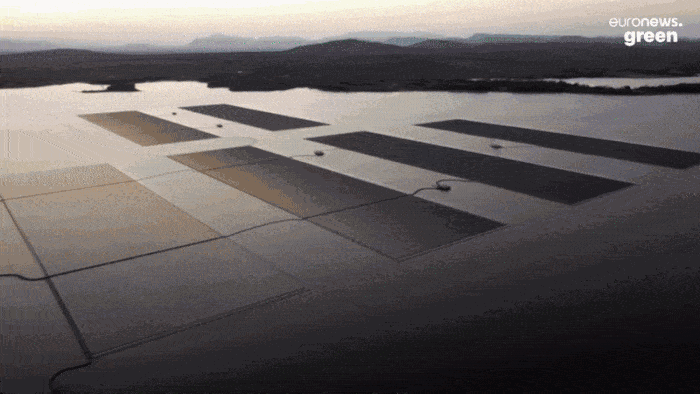
Standard Bank, Africa’s largest lender, has ruled out financing new coal plants or expanding existing coal plants, and will also stop providing financial support to companies that provide critical services to the coal sector, such as construction and operation contractors. News24
HSBC is phasing down its financing of the fossil fuel industry, sending a warning to its oil and gas clients as the bank works toward its target of net-zero emissions. That's a serious shift by one of the world's biggest remaining funders of oil and gas. Among European banks, only Barclays has assisted in underwriting more debt for fossil fuels since 2015. Bloomberg
MAPFRE, the largest non-life insurer in Latin America, just announced it will not cover or invest in fossil fuel companies that do not have a plan to keep temperature rise below 1.5C. This is a big one - clients include Pemex and Petrobras, Mexico and Brazil's state oil companies respectively, two of the biggest polluters in the world.
Swiss Re, the world's second largest reinsurer, just unveiled its new policy on oil and gas,. From July next year, it will no longer provide cover for companies responsible for the world's 10% most carbon-intensive fossil-fuel production. It will also stop reinsuring any new oil and gas projects that receive the go-ahead from parent companies after 2022. Market Watch
The EPA has reinstated California’s authority under the Clean Air Act to implement its own emission standards for cars and light trucks. This paves the way for both California and 15 other states to use more aggressive tailpipe emission and fuel economy standards.

France's car market is going electric way quicker than anyone predicted. Despite the overall market dropping off a cliff (down 31% compared to February 2020), the share of EVs continues to rise. 40% of all passenger cars sold in France last month had some form of electrification, more than the share of petrol at 38%, the leading fossil fuel powertrain. Clean Technica
Surprise, surprise, surprise. Volkswagen says its EV operations are going to be profitable a lot earlier than expected. Several electric models, including the Porsche Taycan, are already sold out for 2022 and consumer demand is only increasing. “We see better scale, we see better margins, we see high customer demand." CNBC
Oh, and check out the search interest in electric cars in the United States this month...

8th February 2022 - 11th March 2022
Saudi Arabia has become the fourth country in the WHO’s Eastern Mediterranean Region to eliminate trachoma, the leading infectious cause of blindness. It remains endemic in five countries in the region, but progress has substantially reduced the number of people requiring antibiotic treatment, from 39 million in 2013 to 11 million in 2020. WHO
Japan’s ten year cancer survival rate has increased to 58.9%. This is a disease that was once said to be incurable, but the survival rate has steadily increased alongside medical advances. Prostate cancer in Japan now has the highest survival rate at 99.2%, followed by female breast cancer at 87.5%, colorectal cancer at 69.7% and stomach cancer at 67.3%. Nippon
If you're not from Africa you've probably never heard of bilharzia, the world's most common parasitic infection. It's a debilitating disease caused by a freshwater worm, leading to chronic ill health. New data shows that in 2010, 51 million of sub-Saharan Africa's 223 million school children were infected. By 2019, that number had dropped to 28 million out of 288 million. WHO

Rodrigo Duterte has signed into law a bill raising the age of sexual consent in the Phillipines from 12 to 16. A ‘Romeo and Juliet’ clause will protect young, genuine lovers and the law will close loopholes such as an exemption in cases where victims agreed to marry their abuser. SCMP
A landmark ruling for human rights in the Middle East, with a court in Kuwait overturning legislation used to prosecute transgender people. The 2007 law, allowed authorities to arrest people whose appearance did not match the gender on their ID card. It's a rare advance in a region where being gay or transgender, if not expressly against the law, is usually treated as such. Irish Times
Colombia has decriminalized abortion procedures up to 24 weeks of gestation. The progress is thanks to the feminist 'green wave' sweeping Latin America with pro-choice advocates sporting green bandanas. Abortion was recently decriminalized in Argentina and Mexico, and Ecuador has decriminalized the procedure in cases of rape. Al Jazeera
It’s an awakening of women’s rights. We’ve arrived at a moment in which we were tired of being left behind and just started reclaiming our rights. For many years we were just waiting.
Paula Avila-Guillen, Executive Director of the Women’s Equality Centre

After a long history of conflict (how's that for an understatement), several Arab countries are welcoming Jewish people back to their countries. In the UAE a government-led effort has resulted in kosher restaurants, a Jewish centre and a state-financed synagogue, and in 2020 the UAE, Bahrain, Sudan, and Morocco all agreed to normalise relations with Israel. Economist
US immigration authorities have released new policies making it easier for children who are victims of abuse to qualify for green cards, finalizing changes first proposed more than a decade ago. Since 2010, more than 130,000 applications have been approved. These new policies will lead to even more vulnerable children being granted residency status. Reuters
The UK has pardoned all gay and bisexual men convicted under a law that criminalised same-sex relations until the 1980s. Activists fought for years to remove convictions for the thousands of men who have struggled to find jobs due a criminal record, in a move aimed at righting the wrongs of the past. Global Citizen
Israel and India have taken their first formal steps towards outlawing conversion therapy, banning medical professionals from providing the therapy. Doctors now face severe disciplinary action including potential revocation of their license.
This is a victory in the general struggle for tolerance and equality, but in my eyes, it is more basic and more critical because this is also a struggle for life itself, this is truly saving lives.
Nitzan Horowitz , Minister of Health, Israel

Chile is creating a new national park, covering 75,000 hectares of the Andes, to protect 386 glaciers that are melting due to climate change. The park is "a fundamental step that our country is taking to combat the destruction of nature" and will also help preserve native flora and animals likes pumas and foxes. France24
The UN has delivered a 'watershed' moment for animal rights, with a historic resolution formally recognising the links between animal welfare and the environmental crisis. Activists have campaigned for this for decades - it ensures greater awareness that how animals are treated affects not just the animals themselves but human health and the health of the environment. Newswire
New Zealand’s national bird is bouncing back from the brink, with the population of the North Island brown kiwi population of 20,000 expected to grow by more than 10% over the next three generations. Conservationists and volunteers have worked for over 30 years to save the flightless bird which struggled to survive the introduction of predators such as stoats, rats, and ferrets. Stuff
Humpback whales will be removed from Australia's threatened-species list. An independent scientific panel deemed the mammals had made a major recovery, after facing near extinction in the 1980s. The whales will still have protection in Australian waters, where it is offence to kill, injure, take, trade, keep, move, or interfere with a humpback. ABC
Basking sharks are now a ‘protected wild animal’ in Ireland thanks to new regulations to prevent hunting or interference with its breeding or resting places. The sharks are the second biggest fish in the world and feed on plankton. Irish waters are home to 15% -20% of the world’s basking shark population. Journal
175 nations came together last week to strike “the most significant environmental multilateral deal since the Paris accord”. Representatives endorsed an end to plastic pollution, with a legally binding pact to address the full life cycle of plastics and a financing model to support lower-income countries. Work now begins on implementing the treaty by 2024. NYT
“Against the backdrop of geopolitical turmoil, the UN Environment Assembly shows multilateral cooperation at its best. Plastic pollution has grown into an epidemic, but with today’s resolution we are officially on track for a cure.”
Espen Barth Eide, President, UNEA-5
Without much fuss and even less public attention, America is in the midst of a multibillion-dollar shift to cage-free eggs in response to new laws and demands from restaurants. Cage-free housing has soared from 4% in 2010 to 28% in 2020, and is expected to reach 70% by 2025. The change marks one of the animal welfare movement’s biggest successes after years of battles with the food industry. AP
The Tequila fish has successfully been reintroduced the into the wild in Mexico, 18 years after it was declared extinct. In 1998, five pairs of fish were sent from a UK zoo to Michoacana University, where the population was protected and expanded. 1,500 fish were recently released into the river in Jalisco and the local community are playing a key role in monitoring the progress. BBC
Honduras has banned open-pit mining with immediate intervention for existing projects in areas of 'high ecological value'. It’s an unexpected win from a country that has a poor track record of threatening environmental defenders who oppose mining. Honduras joins El Salvador and Costa Rica as countries that have banned open-pit mining in Central America. Mongabay
The Svalbard Global Seed Vault in the Arctic just received seed donations from Sudan, Uganda, New Zealand, Germany, and Lebanon. The vault is located halfway between Norway and the North Pole, and holds over 1.1 million seeds from nearly 6,000 plant species. It was created in 2008 to preserve the diversity of the world’s crops from war, disease, and environmental threats.

Last seen staggering around on the lawn of Jimmy Carter's White House, energy security is suddenly back. Russia's invasion of Ukraine has shown that fossil fuels, long promoted as reliable, secure sources of energy, are actually the opposite: constantly at the mercy of unpredictable disruptions. The idea of renewables representing 'freedom energy' is everywhere - and only getting stronger. Everyone seems to have finally realised that other countries can't stop the wind blowing and the sun shining in yours.
This national security paradigm has turned out to be a much better mobilising force than the climate catastrophe paradigm. The speed of change has been astonishing. Shell, Exxon and BP spent decades building inroads to Russia’s fossil-fuel wealth, but in less than 60 hours last week, all announced exits, with no clear path to recoup their billions of dollars of investments. The $11 billion Nord Stream 2 project, a carbon bomb that had paralysed the West for years, is bankrupt, and Russia's prospecting plans in the Arctic looks like they're dead in the water too.
The invasion has brought a wartime energy transition to Europe. The continent’s decades-long timelines for overhauling energy systems that support 440 million people is now being revved up under extraordinary duress. The European Commission has already released a plan to cut most of its reliance on Russian gas by the end of this year, which is insane, considering the continent got 40% of its gas from Russia last year. As the EU's Green Deal chief, Frans Timmermans said, “We are now protecting our vital interest."
Nowhere is this acceleration more apparent than in Germany, a country which imports 65% of its gas from Russia. Europe’s leading economy has pledged to get 100% of its energy from renewables by 2035, bringing forward the previous target by 15 years, and also earmarked $220 billion to fund industrial transformation between now and 2026. In the announcement, German finance minister Christian Lindner described clean energy as, you guessed it, "the energy of freedom”. Reuters

Nordea, the biggest bank in the Nordic region, has announced it will cease all lending to offshore oil and gas (it currently has a €1 billion portfolio of assets in the sector). The bank also says it expects to devote more of its financing to the energy transition, with a fourfold increase in lending between now and 2025. Nordea
British bank Natwest cut lending to oil and gas clients by 21% last year, and just announced it will ditch coal companies that don’t have credible decarbonisation plans. French insurer CNP Assurances will no longer finance new oil and gas, and Dutch pension fund PFZW will disinvest from any fossil fuel company that doesn't have a 'convincing and verifiable' strategy to meet the Paris agreement.
Across the Atlantic, there's also been a marked change in tone too. A ban on Russian gas and oil imports by the Biden administration received bipartisan support and a significant majority of Americans say they're willing to put up with higher prices at the pump. The timing couldn't be better - the US electricity sector just passed a massive milestone: the amount of gas used for power generation has likely peaked and begun a long-term decline. The days of gas growing and gaining market share are over, and the beginning of a long, structural decline is now underway. IEEFA
On the flipside, the clean energy gold rush is just getting going. California just increased its renewables target to 72% by 2032, and on the east coast, an auction for offshore wind leases just totalled an amazing $4.37 billion, more than nine times the previous US record for offshore wind. By contrast, a sale of oil drilling rights in the Gulf of Mexico late last year attracted only $191.7 million.
Or maybe a new oil rush? Texas now has 106 GW of solar in its proposed pipeline. The motivation is clear: the Lone Star state boasts the fastest growth in power demand in the US, cheap land and abundant sunshine. “No one is sitting around saying ‘Are new solar additions going to slow down or collapse?' The only question seems to be ‘How high is this going to go?'" Bloomberg
Good news from our backyard: the state of Victoria has announced plans for 2GW of offshore wind by 2032, and 9 GW by 2040, after legislation passed last year cleared the way for development. The 10 proposed projects are looking to capitalise on strong wind resources along thousands of kilometres of coastline. Reuters
Meanwhile in China, the head of the National Development and Reform Commision, the country's chief state planner, has announced a plan to build (checks notes) 450 GW of solar, wind and hydro in the Gobi and other desert regions. This is absolutely mindblowing. To put that in perspective: the entire world collectively added 290 GW of renewables in 2021. Reuters
China is also targeting 30 GW of battery storage by 2025, and 100 GW of battery storage and 120 GW of pumped hydro by 2030. That's according to the head of the State Grid Corporation of China. These figures completely blow all previous forecasts for the Asia-Pacific region out of the water, and the impact on the learning curves for storage technologies will be enormous. Energy Storage News
And finally... it's the year 2022 and there are giant floating solar flowers on reservoirs in South Korea.

4th February 2022 - 17th February 2022
Female genital mutilation is one of the worst ideas humanity has ever come up with, and we've been practising it for more than a thousand years. In the last generation however, it's started to decline. Progress is uneven, and the pandemic has caused setbacks, but in the 30 countries where it's most prevalent, one in three girls aged 15 -19 today have undergone FGM, versus one in two a generation ago. UNICEF
Human African trypanosomiasis, better known as sleeping sickness, used to be one of Africa's most notorious diseases. In the late 1990s, more than 35,000 cases were reported annually. Today, it's close to being eliminated - only 663 cases were reported in 2020, the lowest number ever recorded and a reduction of 83% since 2000.
You don't hear about much about rubella (German measles) in rich countries these days, because science. In poor countries though, it's still the leading cause of birth defects. Some welcome news from the WHO then - between 2012 and 2020, the number of countries that introduced the rubella vaccine increased from 132 to 173, resulting in a 48% drop in cases. 70% of the world’s infants are vaccinated and elimination has been verified in almost half the world’s countries.

Nigeria is making steady progress towards ending open defecation, with over 60 local government areas now declared open defecation free. In 2006 over a quarter of Nigeria’s population practised OD, which is linked to disease outbreaks like cholera, diarrhoea, and typhoid. Today that number has declined to 18%. Prime Progress
One thing COVID taught us is that infrastructure can be built quickly when the will is there. While much of the world stopped at plexi-glass shields in retail shops, the Philippines undertook the largest bike line construction program in its history, building 500 km of bike paths to replace public transport in under a year. World Bank
In the two decades since Portugal decriminalised the personal possession of all drugs, overdoses, HIV infection and drug-related crime have all dramatically decreased. The ground-breaking reform was part of policy shift to prioritise health over criminalization and its success has inspired the implentation of similar models in Oregon and now, potentially, Norway. Transform Drugs
Mississippi has legalized medical marijuana for people suffering from cancer, AIDS, and sickle cell disease. The new law allows patients to buy up to 3.5g of cannabis per day, up to six days a week. Mississippi is the 37th state in the US to make this kind of medicine legal. NPR
A historic ruling in Ecuador has given the country's 14 indigenous groups the power to veto mining and oil projects on their lands. Indigenous communities must now be consulted and give consent before any extractive projects can commence on or near their territory. Mongabay
The Snoqualmie tribe, also known as the People of the Moon, have reclaimed ownership of their ancestral lands in Washington State, with the purchase of 12,000 acres of former logging forest. It’s a ‘monumental’ victory for the tribe, who have fought to reclaim the land since the 1930s and will now switch to harvesting sustainable timber as part of a bigger plan to restore local wildlife populations.

The global movement towards a four day work week is gaining momentum, with workers in Belgium now legally entitled to a 38 hour working week as part of new labour reforms to tackle burnout. Scotland, Spain and Japan are also trialing the idea following Iceland's success, where 86% of workers now work shorter weeks or have the right to ask to do so. Euro News
A big win for human rights, as New Zealand becomes the latest country to ban conversion therapy. The new law received 107,000 public submissions; the highest number ever received for a piece of legislation. The practice is also currently outlawed in Canada, France, Brazil, Ecuador, Malta, Albania, and Germany. Guardian
To all those who have been affected by conversion practices or attempts at them, we want to say, this legislation is for you. We cannot bring you back, we cannot undo all of the hurt, but we can make sure that for the generations to come, we provide the support and love you did not get and protect you from the harm of those who seek to try to stop you from being who you are.~ Grant Robertson, Deputy Prime Minister of New Zealand
In one of its most significant workplace reforms in decades, the United States will end forced arbitration agreements for survivors of workplace sexual assault and harassment. Arbitration clauses are buried in millions of employment contracts and have long served as loopholes for offenders. The victory comes five years after the #MeToo movement burst into global public consciousness. ABC
40 years after the first case of HIV was diagnosed in Australia, the country is close to eliminating transmission of the virus, recording just 633 cases last year - the lowest number since 1984. The public health victory is owed to the early response to the virus - the introduction of a needle exchange, the tireless dedication of volunteer carers and an early roll-out of the HIV prevention pill. BBC
Cuba has established a new marine protected area spanning 728 km2 of mangrove forests, seagrass beds and coral reefs. The region is an important spawning site for coral reefs and fish and is also home to critically endangered hawksbill turtles, loggerhead turtles and American crocodiles. Mongabay
More than 100 countries have committed to strengthening protection measures in international waters to combat illegal fishing and reduce plastic pollution. This comes after the conclusion of the first global summit dedicated solely to the ocean. The EU and 16 other states also agreed to pursue a global agreement by the end of the year to regulate the sustainable use of the high seas. Guardian
Malaysia and Indonesia have agreed to hold joint patrols in the waters between their countries to stop to illegal fishing. Malaysia loses $1.4 billion to foreign fishing vessels each year while Indonesia loses around $2 billion. The patrols will focus on the Strait of Malacca, one of the world’s most heavily trafficked shipping lanes. Mongabay
Iceland will officially end all commercial whaling in 2024. Only one license holder remains in the country after a two year suspension on hunts, and even they doubt there is 'any economic advantage' to continuing beyond 2024 when the current quotas expire. Maritime Executive
Hawaii has become the first US state to ban shark fishing with new legislation making it illegal to “knowingly capture, entangle, or kill any species of shark.” It’s not the first time Hawaii has led the way for shark conservation; in 2010 it was the first state to ban the possession and distribution of shark fins. Planetary Press
We are well aware of how important sharks are to maintain healthy marine ecosystems. We also recognize their importance in native Hawaiian cultural practices and beliefs.~ Brian Neilson, Hawaiian Division of Aquatic Resources
Big conservation victory in South Africa, after the country's High Court sided with Indigenous communities in the Eastern Cape to stop Shell's efforts to explore shale gas off the country’s eastern coast. The area falls within the Maputaland-Pondoland-Albany biodiversity hotspot, and its pristine waters provide habitat for an exceptional array of endemic and endangered marine species. Hakai

Indonesia has recorded significant progress in its program to restore its tropical peatlands. In 2021 it rehabilitated 300,000 ha, representing 25% of its four year target. Attention will now turn to mangrove restoration, emulating the same approach. Mongabay
The US EPA has resumed the enforcement of a rule that limits power plant emissions of mercury and other hazardous pollutants. The original rule, created in 2012, helped curb mercury’s devastating neurological damage to children and prevented thousands of premature deaths, but was abandoned during the Trump administration. AP
Well, here’s a twist … tax receipts from surging gun and ammunition sales in the US have boosted funds for federal conservation programs to a record $1.1 billion. Thanks to forward-thinking legislation created in 1937, tax money from hunting and shooting equipment is distributed into conservation grants to stop the decline of fish and animal species. Outline
Sinaloa has become the fifth state in Mexico to ban bullfighting. Annual bullfights across Mexico result in the killing of thousands of bulls every year but the tide is turning with 73% of Mexicans supporting a nationwide ban. World Animal News
Good news for cranes in the UK, with 72 pairs recorded last year, the highest number since the 17th century. A small number of birds were reintroduced to Norfolk’s Broads in 1979 after a 400 year absence due to wetland drainage and hunting. Habitat protections and hand-rearing projects have helped boost the population to over 200 birds. BBC
Good news for dogs in America. A decade ago, 2.6 million stray dogs and cats were being euthanized each year. However, thanks to dog-relocation networks, animal rescue and increased demand for pets during the pandemic, the number of euthanised dogs has now fallen to a historic low of 390,000. Time
After four decades of controversy and legal battles, Korea will ban all bear farming from 2026. While the meat and fur trade are currently illegal, the trade of bear bile has continued to be sold since 1981 as an ingredient for traditional medicine. Under the new law, bears currently in farms must be relocated to protection shelters by 2025. Korea Herald
The declaration to cease bear breeding is particularly meaningful because the government, the agricultural industry and civil society have combined to resolve a 40-year-old issue.~ Han Jeoung-ae, Minister of Environment, South Korea
Federal protections for gray wolves have been fully restored across most of the US after a federal court ruled that existing populations could not be sustained without proper measures. The recovery of wolf populations from near-extinction in the 1930s has been a historic conservation victory, but different administrations have tried to scale back protections since they were first enacted in 1974. NPR

There's an election happening in Australia this year, so naturally anti-renewable campaigns have reached fever pitch. The country however, now has 25GW of installed solar capacity – the most per capita in the world. This caps off a record-breaking year in 2021, when more than 3GW of rooftop solar was installed by households and businesses. RE
More good news down under. Despite the best efforts of the Australian government to prop it up, the gas industry is getting destroyed by clean energy. Wind and solar provided five times more power than gas in 2021, while gas generation reached its lowest level in 15 years. Coal is down to 62.8% too, its lowest level since the interconnected national market began in 1999. The Age
And more: another insurance company has dumped Adani: Convex, a global reinsurance company, has announced it won't be going anywhere coal or coal-related infrastructure. The company did not specifically name Adani but referred only to “a new coal mine in Australia.” Convex is the 43rd insurer to rule out underwriting the mine. Insurance Business Mag
Even more: Australia's largest coal-fired power station, which supplies 20% of NSW’s daily power needs, is closing in 2025, seven years sooner than originally planned.
And even more! After seven years, the epic legal battle to protect the pristine Bylong Valley in Australia from a massive new coal mine has been won. The case pitted local residents against the government-backed multinational KEPCO. This project would have generated over 200 million tonnes of greenhouse gas emissions. Environmental Defenders Office

Duke Energy, a US utility serving customers in six states, has announced plans to cut coal to less than 5% of its total generation by 2030 and to fully exit coal by 2035. The company currently owns about 16 GW of coal plants, and describes this as the “largest planned coal fleet retirement in the industry.” IEEFA
US insurance giant Travelers will no longer underwrite companies that generate more than 30% of their revenue from coal or have more than 30% of their reserves in tar sands. It joins 35 insurers globally that have ended or limited coverage: three Norh American insurers, most Asian insurers, and all major European insurers.
New York's state pension fund is selling $238 million of stocks it holds across 21 shale oil and gas companies, saying they're not moving fast enough to a low-emissions economy. In Denmark, one of the country's biggest pension funds is ditching $300 million of oil and gas bonds bonds by December, after concluding the assets pose a growing risk to returns.
Big news in the world of vertical farming. America's biggest retailer, Walmart, has bought an equity stake in Plenty, which grows food off tall, modular towers. The move makes Walmart the first major US retailer to make a significant investment into this area, and it will start offering vertically farmed produce to consumers later this year. Reuters

Coal-free steel plans are accelerating in Europe. German producer Salzgitter will convert to hydrogen and electric arc by 2033, aiming to supply low-carbon steel to all BMW’s plants, and the world's second biggest steelmaker ArcelorMittal has announced a €1.7 billion plan to replace three of its five French blast furnaces with electric arc or direct iron reduction plants by 2030. Argus
Japanese carmakers squandered their leadership in the EV space a decade ago, and aren't keen to make the same mistake again. Honda just ended all vehicle production at its legendary Sayama 'mother factory' in Tokyo, which has been building petrol-powered cars since 1964, and Nissan says it's ending combustion engine development in all markets except the United States.
Ford is investing another $20 billion to reorganize its business for the electric future, aiming to convert every one of its factories from gas-powered to electric vehicle production and hiring more engineers. This brings the automaker's total investment into EVs and digital to $50 billion, as it goes all in on a high stakes race for survival against its rivals. The Verge
In the fourth quarter of 2021, hybrid and electric vehicles surpassed more than 10% of light-duty vehicle sales in the US for the first time ever. On Thursday last week, the US government announced a $5 billion plan to blanket states with electric-vehicle chargers. And in case you were watching the adverts at Super Bowl LVI, top takeaway seemed to be:

21st January 2022 - 3rd February 2022
Jimmy Carter's dream of making Guinea Worm the third ever disease to be fully eradicated is within reach. Only 14 cases were recorded in 2021. Decades of health campaigns to improve access to safe drinking water in Africa have dramatically decreased the disease, which, 35 years ago was infecting 3.5 million people in 21 countries. Al Jazeera
New research has shown that nearly 5.4 million cancer deaths have been avoided in the EU between 1989 and 2022. Since 2017 alone, the cancer death rate has fallen by 6% in men and 4% in women, and in 2022 it's estimated there will be 369,000 fewer deaths compared to the peak back in 1988. Medical.net
The WHO just published new data on global access to cooking fuels. In 1990, 53% of humanity used wood, charcoal, kerosene or dung to cook their food. By last year, that proportion dropped to 36%. In actual numbers, that means that in a single generation, an extra 2.48 billion people are now cooking with electricity or clean stoves.
India just completed its fifth National Family Health Survey, and hidden deep inside some impenetrable PDFs is a whole lot of truly extraordinary data (keep in mind this is a country of 1.38 billion people). Between 2015 and 2020:
- The proportion of women with ten or more years of education increased from 35.7% to 41%.
- Contraceptive use increased from 54% to 67%.
- Teen pregnancy declined from 51 to 43 per 1,000 women.
- The neonatal mortality rate declined from 29.5 to 24.9 per 1,000 live births.
- Under-five mortality rate declined from 49.7 to 41.9 per 1,000 live births.
- The fertility rate decreased from 2.2 to 2.0, and is now below replacement levels in 23 of India's 28 states.
- Access to improved sanitation skyrocketed from 48.5% to 70.2%.
- Access to electricity increased from 88% to 96.8%.
- Households using clean fuel or electricity for cooking increased from 43.8% to 58.6%
- Households with at least one person covered on a health insurance scheme increased from 28.7% to 41%.
Seems like an appropriate place to leave this tweet:
Interesting: how much bad news is anecdotal and good news is statistical. (And how invisible the statistical is.)
— Stewart Brand (@stewartbrand) January 18, 2022
Still, if only one of the two can be good news, I would rather it be the statistical. It accumulates toward qualitative change that lasts.
New legislation in Pakistan has significantly strengthened protections for women in the workplace. The law expands the definition of harassment to include “discrimination on the basis of gender, which may or may not be sexual in nature” and will protect domestic workers and students, as neither group were covered previously by law. HRW
A landmark court ruling in India will give sex workers identity documents, allowing them to access social welfare, bank accounts and voting. Although prostitution is legal, the lack of identification papers within the sex industry has left many workers vulnerable to trafficking and poverty. The reform comes after a decade of petitioning by a collective of sex workers in Kolkata. NYT
Papua New Guinea has abolished the death penalty because "it’s not an effective deterrent to serious crime.” The country abolished capital punishment in 1970 but reintroduced it in 1991. Amnesty says 144 countries have now abolished the death penalty in law or in practice, and last year saw the lowest number of executions globally in more than a decade. SBS
Divorce is getting less nasty in wealthy countries. Legal reform and access to mediation have made the process cheaper, faster, and less traumatic for children, and cultural shifts have helped too - with more mothers in the workforce and fathers actively involved in child-raising, shared custody agreements are on the rise. Economist
Thailand is on track to decriminalize marijuana, with a proposal to remove the plant from the list of controlled drugs. Currently, the plant is a category-5 narcotic drug and possession can lead to hefty fines and up to 15 years jailtime. Medical cannabis is already legal and can be used in foods and cosmetics. SCMP

The world’s largest oyster restoration has been achieved on the Piankatank and Great Wicomico rivers in Virginia with over 1,000 acres improving water quality and habitat for other wildlife. The initiative is part of the 2014 Chesapeake Bay Watershed Agreement which aimed to fully restore oyster populations in the bay's tributaries by 2025. So far, four of the six targeted tributaries have met their restoration goals. Nature Conservancy
Indigenous farming practices are starting to gain serious momentum across western America. In Arizona, there were 291 farms with a Native American farm operator in 2002; today that number has expanded to more than 11,729 farms. Indigenous practices focus on “trying to reconnect with place by developing sustainable, organic produce for community members.” Civil Eats
The US federal government has committed over $1 billion to the restoration of Florida’s Everglades. The mammoth project will increase protection for hundreds of endangered plant and animal species and maintain the crucial source of drinking water for Florida’s eight million residents. Miami Herald
The EU has taken its first steps towards banning live animal exports, and enforcing stricter rules to ensure humane transportation for slaughter, fattening or breeding. New rules will target overcrowding, food and water supplies and cap journey times at eight hours for domestic animals, and four hours for pregnant ones. World Animal News
A forestry company in Finland is at the helm of a huge new rewilding project to restore ecosystems impacted by decades of logging. Although 77% of Finland is forested, commercial plantations have destroyed almost all of the old growth. The restoration work will involve nine river basins and focus on recreating old spawning grounds for fish and rebuilding sustainable ecosystems. Guardian
Africa’s Great Green Wall is the world’s most ambitious reforestation project, with funding to match. 15 years in, has the project lived up to its hype? In Niger at least, the answer is yes. As of 2020, nearly 400,000 ha of desert has been restored, with the improved soil supporting an abundance of crops. Hundreds of communities are now working together to create economic opportunities from their thriving landscape. NYT
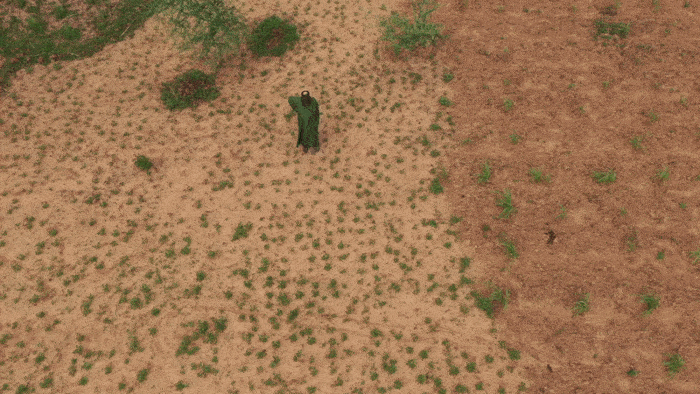
A big win for mangrove conservation in Mumbai, with 53% of mangrove cover legally declared a forest by the end of 2021, a 30% increase from the beginning of the year. Mangroves play an important role in mitigating the impact of climate change, and a further 3,000 ha will be protected in 2022. Hindustan Times
After decades of conservation efforts, the Channel Islands, off the coast of Southern California, have been successfully restored. The islands are now home to a healthy population of bald eagles and other formerly threatened species including the island fox, peregrine falcons and the island scrub jay are thriving. The islands also now host the largest seal and sea lion rookery in the world. HCN
Conservation efforts on Costa Rica’s Osa Peninsula are working. In the 1990s, populations of pumas, tapirs, and peccaries fell to almost zero, but protected reserves gave many species a chance to recover completely. Conservationists are now focused on creating and protecting wildlife corridors, for jaguars and other roving species to roam and grow. Mongabay
Speaking of wildlife corridors, they're gaining momentum around the world. Wildlife bridges and crossing structures are allowing animals to safely cross highways, reducing the risk of vehicle collisions. Banff National Park in Canada boasts the most wildlife crossings in the world, with 38 underpasses and 6 overpasses. Now Toronto

A record 247,000 Western Monarch butterflies overwintered in California last year, a dramatic increase from just 2,000 in 2020. The boom has been linked to an increase in native plants and reduced pesticide use. Efforts to protect the butterfly’s habitat are also underway with transportation and energy companies agreeing to 'rights-of-way' corridors and wintering sites across the US. Mongabay
Also.... enough with all the drawings of dead butterflies!
Dolce & Gabbana has banned fur and angora from all future collections. It's a huge win for campaigners who fought for this for decades. The announcement follows other luxury brands like Moncler, Gucci, Alexander McQueen and Balenciaga who have also recently gone fur free. Vogue Business
After more than 150 years, the legal ivory trade in Hong Kong has come to an end. Landmark legislation has banned the sale of ivory products. The new rules ban the 'import, re-export, and commercial possession of elephant ivory' but exclude antique pieces dated before 1925. Wild Aid
New Zealand’s fur seal population has bounced back from near extinction, with 200,000 seals now thriving along the coastline. The victory has led conservationists to an unexpected problem, as they now face questions around how to manage the interactions between the seals and their human neighbours. Guardian
As we enter the Year of the Tiger, the WWF has released a report showing the century-long trend of wild tiger decline has finally been reversed. Highlights from the report include the creation of the world’s largest tiger protected area in China, a national park in Russia, and the transformation of a transboundary corridor between India and Nepal from 115 hectares to 3,800 hectares of forest, encompassing over 6,000 community members and stewards of the land. WWF
The 27 countries of the European Union installed 25.9 GW of new solar capacity last year, an increase of 34% over 2020. That makes 2021 the best year for solar in Europe's history. All EU states are now on track to reach their 2030 solar goals, with Latvia and Estonia already across the line, and Poland, Ireland, and Sweden expected to reach their targets next year. Yale360
Germany is ramping up its decarbonisation plans. The new government of Europe's powerhouse economy is proposing 2% of total land area for wind power, will oblige all new commercial buildings to install solar, is targeting 50% of all building heating to be carbon neutral by 2030, and aims to cover 80% of total power demand with renewables by that date. PV Magazine
China built more offshore wind capacity in 2021 than the rest of the world managed in the last five years put together. Just to put that in context, the UK previously had the most offshore wind, with 10GW. China has just built 1.5x that in a single year, and twice as much as the IEA forecast in… December 2021. CCTV

China is also reforming its national electricity market, with new regulations that will force all of the country's coal-fired generation to compete with renewables by 2025. This comes on top of news that non-fossil fuel energy sources such as wind, nuclear, solar and hydro are on track to make up more than half of China's total power generation capacity by the end of 2022. Reuters
Eastern Pacific, one of the largest privately-owned ship management companies in the world, has just announced it will no longer carry coal. "This is intended to be a message to the maritime industry that decarbonisation isn’t exclusive to how we move ships - what we move also matters." Marine Log
In the home of cheap fracked gas, gas is proving to be not so cheap after all. Clean energy in the United States is now definitively less expensive - which is why gas powered generation is being replaced by wind and solar. Solar capacity is now 20 times greater in the US than it was in 2011, and wind capacity has more than doubled. Economics, not ideology, is driving the transition. EIA
A federal judge just invalidated the biggest offshore oil and gas lease sale in US history - 80 million acres of drilling leases issued by the Biden administration — stating that it acted “arbitrarily and capriciously”. Instead of updating an environmental study performed during the Trump administration, the Biden administration simply repurposed the study without any changes. Reuters
White flag time at Southern Company's Georgia Power, one of the United States' biggest utilities, and once one of the most adamant coal-burning utilities/lobbying forces. It plans to close its entire coal fleet by 2028, replacing it with renewables and fossil gas. The Hill
The world spent $755 billion on low carbon solutions last year, up from 27% in 2020, and 14% of all venture capital now goes into climate tech, 2.5x pre-pandemic investment levels. While it's exciting to see the money finally pouring in, we’ve still got a way to go - McKinsey estimates it's going to take $9 trillion a year to get to net zero by 2050, or 12 times as much as the world is spending today.
We're still in the early days of the energy transition...

Fossil-free steel is coming sooner than anyone thought. Sweden’s SSAB, a pioneer in making steel from hydrogen, is bringing forward the closure of its coal-fired furnaces from 2045 to 2030. This will eliminate eight million tonnes of carbon a year, reducing Sweden’s carbon emissions by 10%, Finland’s by 7%, and with the European carbon price at around €90 a ton, looks like a clever financial decision too.
Last year, an electric car sold more units in Switzerland than any other car (gasoline, diesel, hybrid, etc.). The Tesla Model 3 didn’t just rule all electric sales, but all types of cars. Comparing November 2021 to November 2020, new car registrations for electric vehicles grew by +63%. Clean Technica
Tesla’s factory in California is now the most productive auto plant in North America. Last year it produced an average of 8,550 cars a week, more than Toyota's juggernaut in Kentucky (8,427 cars a week), BMW's Spartanburg hub in South Carolina (8,343) or Ford's iconic truck plant in Michigan (5,564). Bloomberg
The electric equivalents of the Ford F150, the Honda CRV, Lexus RX and the Toyota Corolla - some of the most popular cars in the United States - are now officially cheaper than their petrol-powered counterparts. Also... 1,200 km on a single charge? Better move those goalposts, range anxiety-ists.
1st January 2022 - 20th January 2022
Vaccine distribution is finally picking up speed outside rich countries. COVAX, the global vaccine sharing initiative, delivered a record-breaking 309 million doses of covid vaccine across 70 low and middle income countries last month, and this month, reached the milestone of one billion doses distributed worldwide. WaPo
Cancer mortality rates in the United States have dropped by a third since the 90s due to 'major progress' in early detection and treatment for lung cancer. Lung cancer mortality decreased by 5% each year between 2015 and 2019 and is attributed to annual screenings and smoking prevention programs. CNN
I'm an oncologist, so I'm an inveterate optimist. But I think the key message for the public is that there's room for optimism across all types of cancer.
Dr. Deb Schrag, Memorial Sloan Kettering Cancer Centre
Last weekend, Uganda conducted a door to door vaccination program to immunise eight million children against polio - in just three days. Uganda has achieved incredible results in childhood health over the past 20 years, with the mortality rate for under fives dropping by more than half. East African
A ground-breaking change to health regulations in Canada will allow patients suffering from serious mental health illnesses to access psychedelic therapies, including psilocybin and MDMA. The amendment represents a 'seismic shift' towards the legalization of psychedelics, which can be effective in treating PTSD and depression. Calgary Herald
UNICEF has updated data on global child mortality trends, and it's really good news. Thus far, the pandemic has not resulted in the feared reversal - rather, child mortality actually decreased in 2020, to 37 deaths per 1,000 live births. The longer term trends are even more encouraging, with the under five mortality rate falling by more than half since 2000.

Tanzania has lifted a 20-year ban preventing adolescent mothers from attending school. The ban was rooted in policy from the 1960s that included a mandatory pregnancy test and potential arrest if pregnant. Under the new law, young mothers will be allowed to resume their formal education after giving birth. Citizen
Canada and France have just outlawed conversion therapy, passing comprehensive legislation within days of each other. Brazil, Ecuador, Malta, Albania, and Germany have already fully or partially banned the practice and another 11 countries, including New Zealand, Mexico, Spain, and Britain are currently working towards reform.
Further victories for human rights around the globe. A Taiwanese court made a landmark ruling allowing a man to legally adopt his husband’s non-biological child, Israel has lifted its surrogacy ban, allowing single men and same-sex couples to pursue surrogacy, and new legislation in the Faroe Islands has granted equal parental rights for same-sex couples.
Fatal police shootings in America dropped by 13% between 2020 and 2021, reaching the lowest annual number on record. Biggest drop? Florida. Increased public accountability and initiatives replacing armed officers with healthcare and social workers for mental-health related 911 calls contributed to the decline. ABC

The Kenyan government has made a historic commitment to the rights of women and girls, vowing to end gender-based violence by 2026. $23 million has been allocated to prevention and response services, research, and the establishment of a survivors’ fund. The achievement comes after decades of tireless advocacy. Gates Foundation
Landmark legislation in the Philippines has banned child marriage, constituting the practice as child abuse. This is a big, big moment for the country with one of the world's highest rates of child marriage. Bravo to the activists who made this happen. SCMP
Technology, education, and community efforts have helped Bangladesh reduce cyclone-related deaths more than 100-fold since 1970. The country’s multi-layered approach is leading the way for other developing countries to better manage the risks of climate disasters. New Humanitarian
Ecuador has expanded its protected waters by 60,000 km2, building upon the existing Galapagos Marine Reserve, which already protects 138,000 km2 of ocean from extractive activities. Together, Costa Rica and Ecuador have now connected two of the world’s most biologically significant and productive marine habitats. DW
These islands teach us something about ourselves.
What if we didn't set ourselves up as masters over this Earth, but as its protectors?
Guillermo Lasso, President of Ecuador
Ten countries in the western Indian ocean are joining forces to create a network of marine conservation areas dubbed the ‘Great Blue Wall’. The first stage of the project will be in the Pemba Channel off the coast of Tanzania, and focus on restoring coral reefs, mangroves, and seagrass meadows. Mongabay
An international group of researchers has compiled the first database of marine conservation efforts in China, and the results have surprised everyone. The country has 326 protected areas covering almost 13% of its territorial waters — and the researchers still aren't sure they've found all of them. Hakai
Over a thousand fin whales were seen swimming last week in the seas off Antarctica, the same ones in which they were driven to near-extinction last century. Conor Ryan, the @whale_nerd that spotted them, said that in 20 years at sea he's never seen anything like it. “Words fail me. I've seen maybe 100 fins here before in previous years."
We found about 1000 fin whales over a 5x5 mile area off South Orkney. Blue and humpback also mixed in. Mind completely blown 🐳 @LindbladExp #NationalGeographicEndurance pic.twitter.com/xtdvexXwI5
— Conor Ryan (@whale_nerd) January 14, 2022
A new survey in India has found forest and tree cover has increased by 2,261 km2 since 2019, and now covers almost a quarter of the geographical area of the country. While the government will continue conservation efforts, its focus will also turn to enriching the quality of these existing areas. Live Mint
Policy changes in the UK mean that farmers will now receive taxpayers’ cash to rewild their land. Previously, farmers were given grants based on how much land they farmed, but will now be paid for environmental improvements instead. Rewilding is having a big of a moment in the UK; the Independent has a great list of some of the projects already underway.
For the first time this century, Beijing’s air quality met China’s national standards in 2021. The biggest achievement was the reduction of PM2.5, the most dangerous pollutant, which fell 13% last year, with levels down to a third of what they were a decade ago. CREA
France has started 2022 on the front foot, with a ban on plastic packaging for 30 fruits and vegetables coming into effect on the 1st January. An estimated 37% of fresh produce was sold in plastic packaging in France last year and the new measures should eliminate over a billion pieces of packaging per year. Guardian
Organisations in New York that throw out more than two tonnes of food each week will be required to donate or compost the waste under new legislation. The law will help the 2.2 million people struggling with food insecurity and cut emissions from the millions of tonnes of food waste produced each year. Eco Watch
Giraffe populations across Africa have rebounded by 20% since 2015. Targeted conservation measures, relocation programs and field research have contributed to the rise. Scientists also recently uncovered genetic evidence that there may be four species of giraffe rather than one, three of which have considerably increased in population. NatGeo
A historic win for animal rights in Italy, with new legislation banning fur farming across the country. The amendment includes an immediate ban on the breeding of mink, foxes, raccoon dogs and chinchillas and the closure of 10 remaining mink farms by June 30, 2022. Italy is the 16th European country to outlaw the practice. Ecowatch
In thirty years of the animal rights battle this is our best victory. Finally, a parliamentary vote sanctions the end of unspeakable suffering inflicted on animals only in the name of profit and vanity.”
Michela Vittoria Brambilla, President of the Parliamentary Intergroup for Animal Rights Italy
New data from wildlife surveys shows Mexico’s endangered jaguar population increased by 20% between 2010 and 2018, giving conservationists confirmation that their strategies are working. Protection measures have included the creation of wildlife corridors and incentive programs with local communities.


The Czech Republic has brought forward its coal phase out date to 2033, five years ahead of its original target, Slovenia says it will stop using coal for electricity by the same date, South East Asia’s largest coal miner just announced it's divesting its entire coal business, and India's richest person is investing $80 billion in clean energy in the Indian state of Gujarat.
Wind became the main source of electricity generation in Spain last year, registering 23% of total production. Overall, renewables produced 46% of the country's electricity in 2021, an increase of almost 10% compared to 2020. A decade ago, renewables' share was less than 15%. Windpower Monthly
Texas is still the US state that most people associate most closely with the fossil fuels industry (a century's worth of fortunes, won and and lost, tends to have that effect). So you might be surprised to hear that nearly 40% of the Lone Star state's power was carbon free in 2021. Drill baby drill?
Good news down under. Australian homes and businesses installed just over 3GW of rooftop solar in 2021, a new annual record. There's now about 17GW of solar on the country's roofs, not because Australians think it's the right thing to do, but because they think it's the cheaper thing to do. Oh, and the state of South Australia just ran for one week on wind and sunshine alone.
Better move those goalposts, baseload’ologists.
World record: South Australia (population 1.8m) runs for a week on 100% renewable energy, a record for similar energy grids anywhere
— Assaad Razzouk (@AssaadRazzouk) January 17, 2022
Don't believe Big Oil (and politicians in their pockets) when they say 100% renewables can't be donehttps://t.co/94RH05WZsx #climate pic.twitter.com/ZOK7lskVxT
Scotland has just finished leasing a mind-boggling 25GW of offshore wind. Even more amazing, almost 60% will be floating turbines, the first time this technology will be deployed commercially at scale. That has huge global significance; it means that offshore wind can be built in places with deeper coastlines, like Japan and Taiwan. FT
A new regulation has been issued by China's SASAC (a ministerial-level organization directly underneath the all-powerful State Council), stating that all state-owned enterprises need to achieve a 50% share of renewables in installed power capacity by 2025. In case it's not apparent, this is a really big deal.
Staying with China, new data shows the country's EV market continues to go gangbusters. Sales, which skyrocked by 154% last year to 3.3 million, are forecast to almost double again this year. The best-selling vehicle in the country? A $4,500, tiny, no-frills, three-door vehicle about the same size as a Smart car, called the Yuling Mini.
Meanwhile, the diesel death march is picking up pace in Europe. Sales of EVs overtook diesel models for the first time ever in December. That's a big milestone! More than a fifth of new cars sold across 18 European markets, including the UK, were powered exclusively by batteries, while diesel, once the most popular engine option, accounted for less than 19% of sales. FT
Chrysler says it will stop producing combustion engine powered vehicles by 2028, Hyundai is closing its combustion engine development division, and the all-electric Porsche Taycan is now outselling the 911. “Now, it is inevitable to convert into electrification.”
For a view of where things are heading, Norway's experience is instructive. Only 8% of new cars sold there last year ran purely on gasoline or diesel, while two thirds were electric, and most of the rest were hybrids. The view of Norwegians as environmental diehards is wrong too - they started with exactly the same EV skepticism we're seeing in other parts of the world right now. NYT

